Long term intention of studying MPA in Australia
VerifiedAdded on 2023/01/17
|43
|11339
|67
AI Summary
This dissertation explores the long term intentions of students from different cultures studying MPA in Australia. It discusses the benefits of pursuing Masters in Professional Accounting and its impact on future career prospects. The research aims to understand the concept of professional accounting, the competencies achieved through studying MPA, the job prospects after completion, and the suitable ways of accomplishing the long term intentions. The study focuses on students from Nepal, India, China, and Africa.
Contribute Materials
Your contribution can guide someone’s learning journey. Share your
documents today.
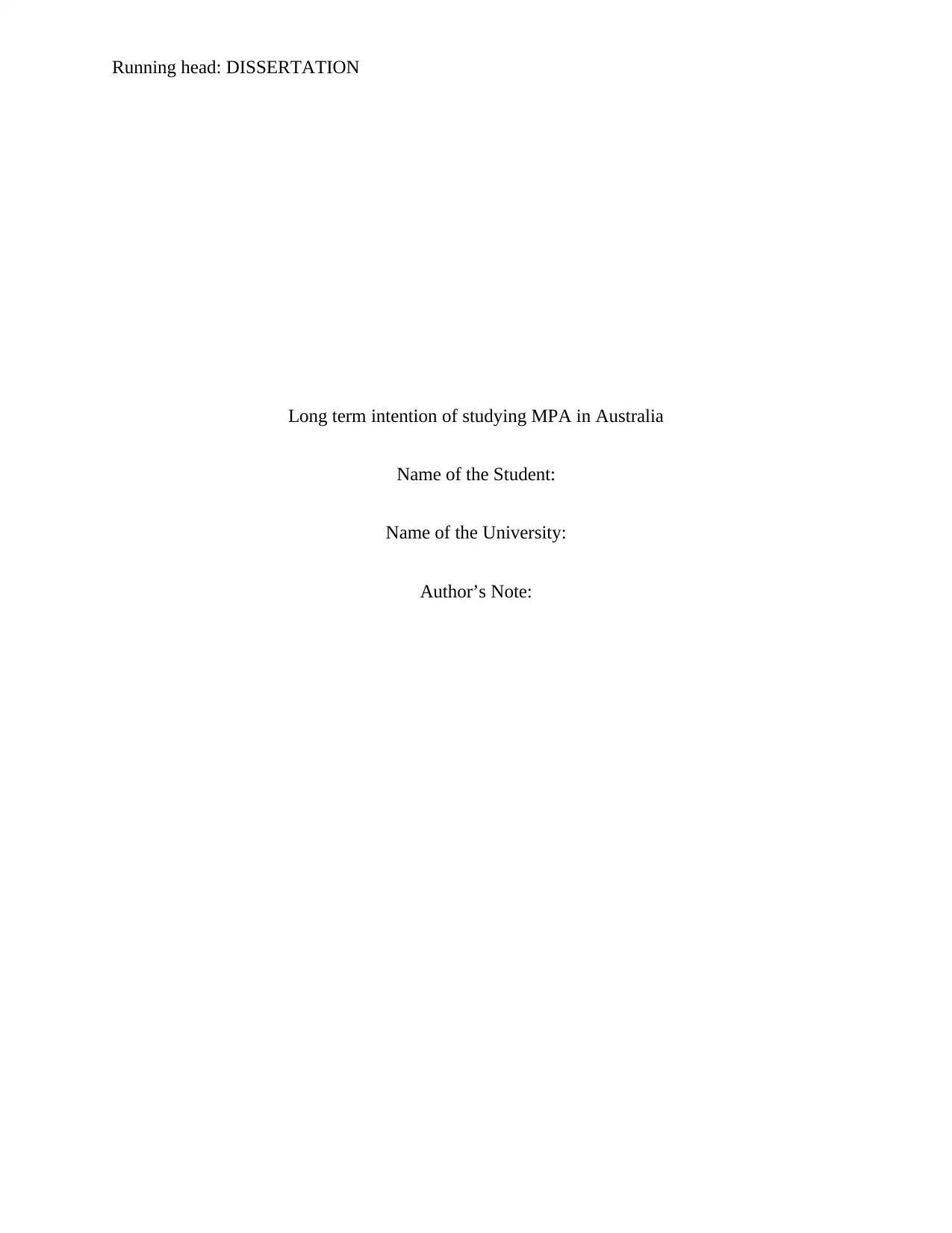
Running head: DISSERTATION
Long term intention of studying MPA in Australia
Name of the Student:
Name of the University:
Author’s Note:
Long term intention of studying MPA in Australia
Name of the Student:
Name of the University:
Author’s Note:
Secure Best Marks with AI Grader
Need help grading? Try our AI Grader for instant feedback on your assignments.
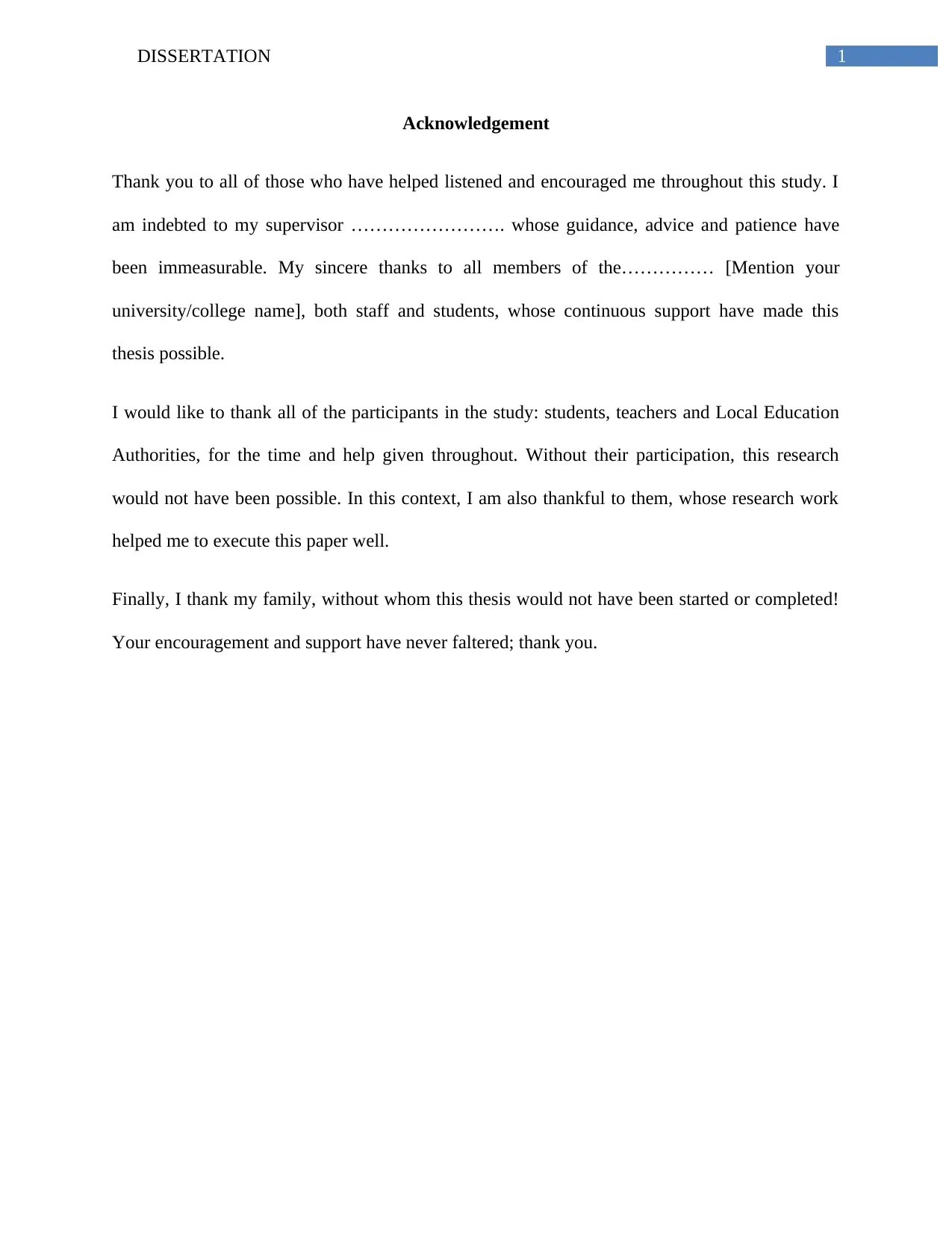
1DISSERTATION
Acknowledgement
Thank you to all of those who have helped listened and encouraged me throughout this study. I
am indebted to my supervisor ……………………. whose guidance, advice and patience have
been immeasurable. My sincere thanks to all members of the…………… [Mention your
university/college name], both staff and students, whose continuous support have made this
thesis possible.
I would like to thank all of the participants in the study: students, teachers and Local Education
Authorities, for the time and help given throughout. Without their participation, this research
would not have been possible. In this context, I am also thankful to them, whose research work
helped me to execute this paper well.
Finally, I thank my family, without whom this thesis would not have been started or completed!
Your encouragement and support have never faltered; thank you.
Acknowledgement
Thank you to all of those who have helped listened and encouraged me throughout this study. I
am indebted to my supervisor ……………………. whose guidance, advice and patience have
been immeasurable. My sincere thanks to all members of the…………… [Mention your
university/college name], both staff and students, whose continuous support have made this
thesis possible.
I would like to thank all of the participants in the study: students, teachers and Local Education
Authorities, for the time and help given throughout. Without their participation, this research
would not have been possible. In this context, I am also thankful to them, whose research work
helped me to execute this paper well.
Finally, I thank my family, without whom this thesis would not have been started or completed!
Your encouragement and support have never faltered; thank you.
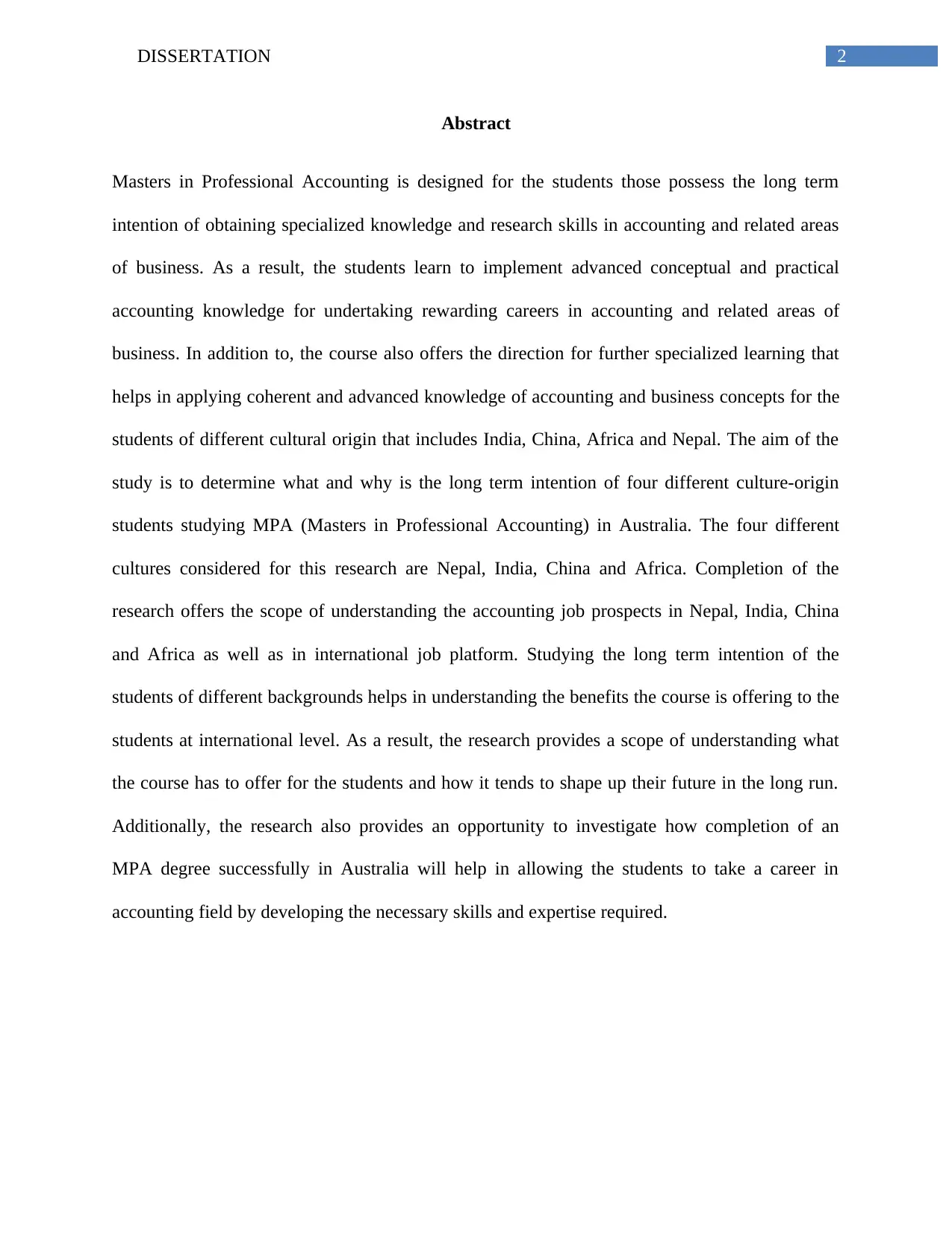
2DISSERTATION
Abstract
Masters in Professional Accounting is designed for the students those possess the long term
intention of obtaining specialized knowledge and research skills in accounting and related areas
of business. As a result, the students learn to implement advanced conceptual and practical
accounting knowledge for undertaking rewarding careers in accounting and related areas of
business. In addition to, the course also offers the direction for further specialized learning that
helps in applying coherent and advanced knowledge of accounting and business concepts for the
students of different cultural origin that includes India, China, Africa and Nepal. The aim of the
study is to determine what and why is the long term intention of four different culture-origin
students studying MPA (Masters in Professional Accounting) in Australia. The four different
cultures considered for this research are Nepal, India, China and Africa. Completion of the
research offers the scope of understanding the accounting job prospects in Nepal, India, China
and Africa as well as in international job platform. Studying the long term intention of the
students of different backgrounds helps in understanding the benefits the course is offering to the
students at international level. As a result, the research provides a scope of understanding what
the course has to offer for the students and how it tends to shape up their future in the long run.
Additionally, the research also provides an opportunity to investigate how completion of an
MPA degree successfully in Australia will help in allowing the students to take a career in
accounting field by developing the necessary skills and expertise required.
Abstract
Masters in Professional Accounting is designed for the students those possess the long term
intention of obtaining specialized knowledge and research skills in accounting and related areas
of business. As a result, the students learn to implement advanced conceptual and practical
accounting knowledge for undertaking rewarding careers in accounting and related areas of
business. In addition to, the course also offers the direction for further specialized learning that
helps in applying coherent and advanced knowledge of accounting and business concepts for the
students of different cultural origin that includes India, China, Africa and Nepal. The aim of the
study is to determine what and why is the long term intention of four different culture-origin
students studying MPA (Masters in Professional Accounting) in Australia. The four different
cultures considered for this research are Nepal, India, China and Africa. Completion of the
research offers the scope of understanding the accounting job prospects in Nepal, India, China
and Africa as well as in international job platform. Studying the long term intention of the
students of different backgrounds helps in understanding the benefits the course is offering to the
students at international level. As a result, the research provides a scope of understanding what
the course has to offer for the students and how it tends to shape up their future in the long run.
Additionally, the research also provides an opportunity to investigate how completion of an
MPA degree successfully in Australia will help in allowing the students to take a career in
accounting field by developing the necessary skills and expertise required.
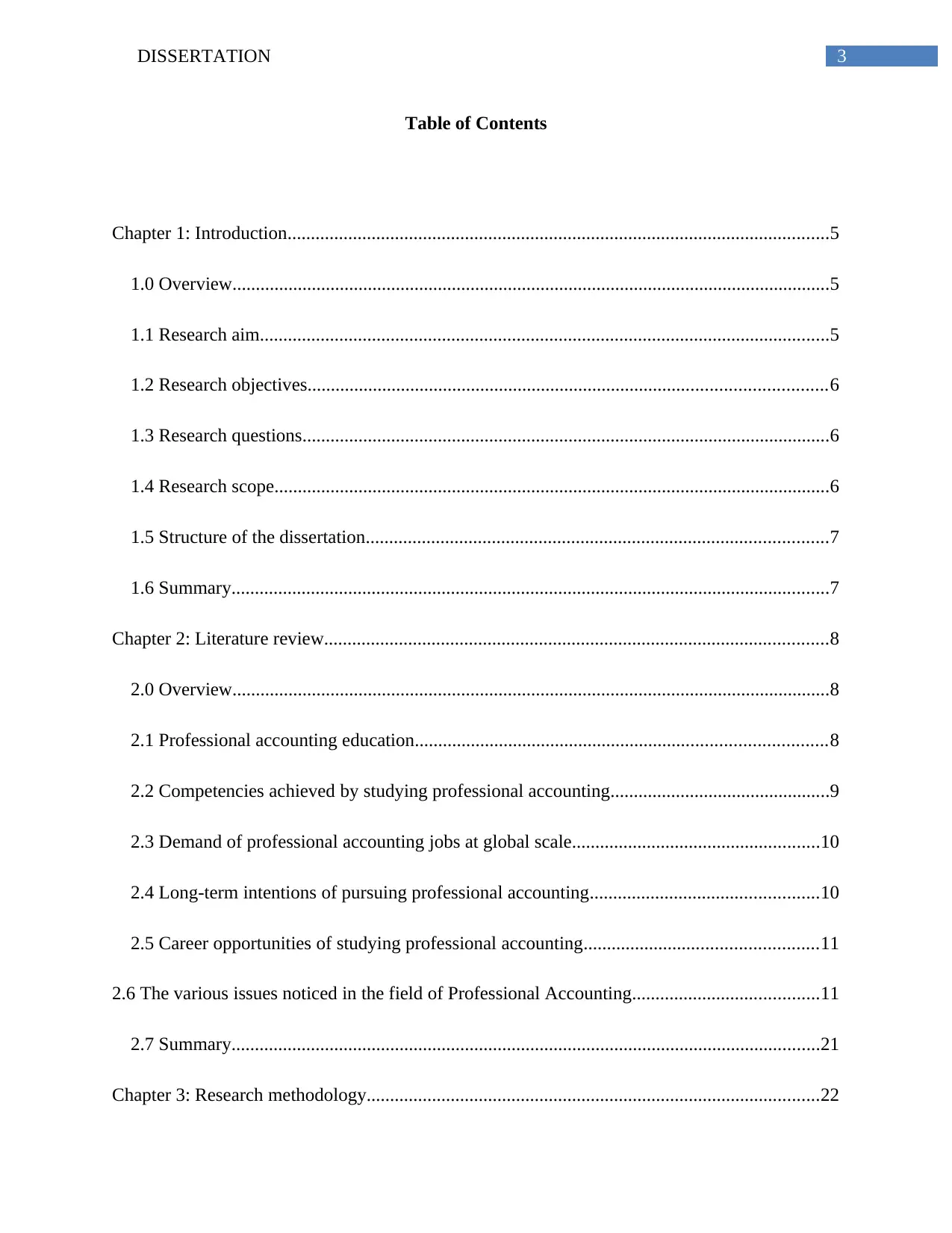
3DISSERTATION
Table of Contents
Chapter 1: Introduction....................................................................................................................5
1.0 Overview................................................................................................................................5
1.1 Research aim..........................................................................................................................5
1.2 Research objectives...............................................................................................................6
1.3 Research questions.................................................................................................................6
1.4 Research scope.......................................................................................................................6
1.5 Structure of the dissertation...................................................................................................7
1.6 Summary................................................................................................................................7
Chapter 2: Literature review............................................................................................................8
2.0 Overview................................................................................................................................8
2.1 Professional accounting education........................................................................................8
2.2 Competencies achieved by studying professional accounting...............................................9
2.3 Demand of professional accounting jobs at global scale.....................................................10
2.4 Long-term intentions of pursuing professional accounting.................................................10
2.5 Career opportunities of studying professional accounting..................................................11
2.6 The various issues noticed in the field of Professional Accounting........................................11
2.7 Summary..............................................................................................................................21
Chapter 3: Research methodology.................................................................................................22
Table of Contents
Chapter 1: Introduction....................................................................................................................5
1.0 Overview................................................................................................................................5
1.1 Research aim..........................................................................................................................5
1.2 Research objectives...............................................................................................................6
1.3 Research questions.................................................................................................................6
1.4 Research scope.......................................................................................................................6
1.5 Structure of the dissertation...................................................................................................7
1.6 Summary................................................................................................................................7
Chapter 2: Literature review............................................................................................................8
2.0 Overview................................................................................................................................8
2.1 Professional accounting education........................................................................................8
2.2 Competencies achieved by studying professional accounting...............................................9
2.3 Demand of professional accounting jobs at global scale.....................................................10
2.4 Long-term intentions of pursuing professional accounting.................................................10
2.5 Career opportunities of studying professional accounting..................................................11
2.6 The various issues noticed in the field of Professional Accounting........................................11
2.7 Summary..............................................................................................................................21
Chapter 3: Research methodology.................................................................................................22
Secure Best Marks with AI Grader
Need help grading? Try our AI Grader for instant feedback on your assignments.
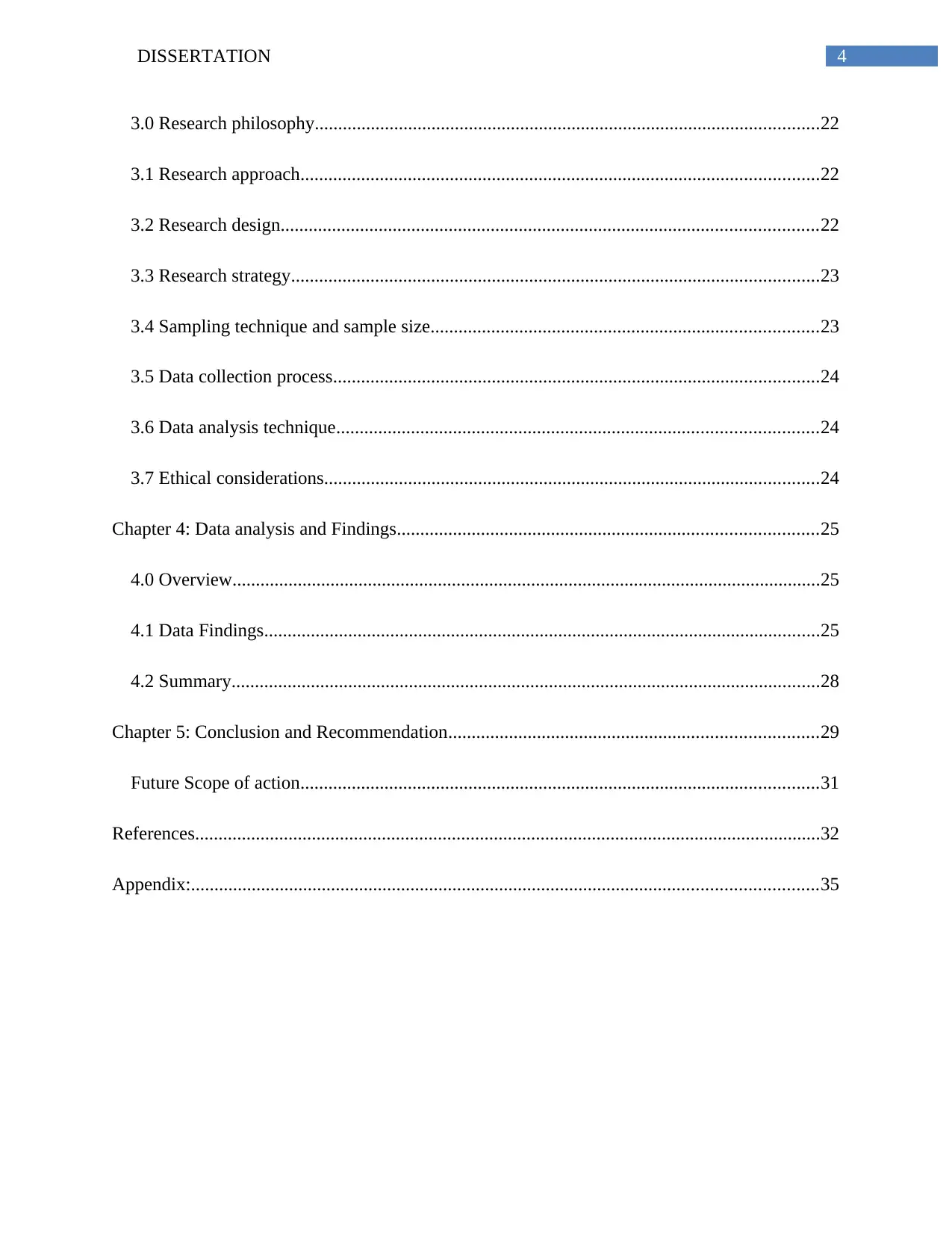
4DISSERTATION
3.0 Research philosophy............................................................................................................22
3.1 Research approach...............................................................................................................22
3.2 Research design...................................................................................................................22
3.3 Research strategy.................................................................................................................23
3.4 Sampling technique and sample size...................................................................................23
3.5 Data collection process........................................................................................................24
3.6 Data analysis technique.......................................................................................................24
3.7 Ethical considerations..........................................................................................................24
Chapter 4: Data analysis and Findings..........................................................................................25
4.0 Overview..............................................................................................................................25
4.1 Data Findings.......................................................................................................................25
4.2 Summary..............................................................................................................................28
Chapter 5: Conclusion and Recommendation...............................................................................29
Future Scope of action...............................................................................................................31
References......................................................................................................................................32
Appendix:......................................................................................................................................35
3.0 Research philosophy............................................................................................................22
3.1 Research approach...............................................................................................................22
3.2 Research design...................................................................................................................22
3.3 Research strategy.................................................................................................................23
3.4 Sampling technique and sample size...................................................................................23
3.5 Data collection process........................................................................................................24
3.6 Data analysis technique.......................................................................................................24
3.7 Ethical considerations..........................................................................................................24
Chapter 4: Data analysis and Findings..........................................................................................25
4.0 Overview..............................................................................................................................25
4.1 Data Findings.......................................................................................................................25
4.2 Summary..............................................................................................................................28
Chapter 5: Conclusion and Recommendation...............................................................................29
Future Scope of action...............................................................................................................31
References......................................................................................................................................32
Appendix:......................................................................................................................................35
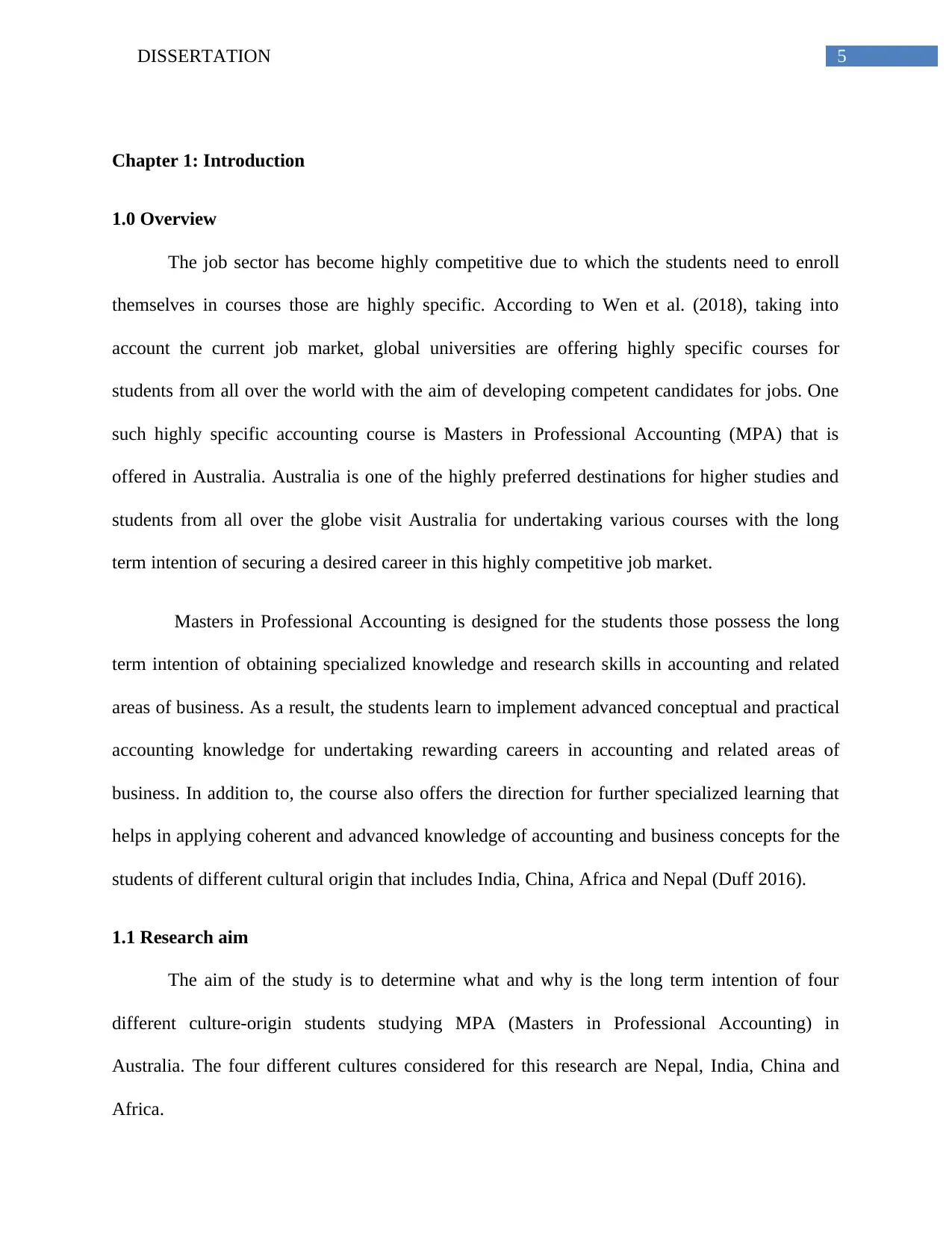
5DISSERTATION
Chapter 1: Introduction
1.0 Overview
The job sector has become highly competitive due to which the students need to enroll
themselves in courses those are highly specific. According to Wen et al. (2018), taking into
account the current job market, global universities are offering highly specific courses for
students from all over the world with the aim of developing competent candidates for jobs. One
such highly specific accounting course is Masters in Professional Accounting (MPA) that is
offered in Australia. Australia is one of the highly preferred destinations for higher studies and
students from all over the globe visit Australia for undertaking various courses with the long
term intention of securing a desired career in this highly competitive job market.
Masters in Professional Accounting is designed for the students those possess the long
term intention of obtaining specialized knowledge and research skills in accounting and related
areas of business. As a result, the students learn to implement advanced conceptual and practical
accounting knowledge for undertaking rewarding careers in accounting and related areas of
business. In addition to, the course also offers the direction for further specialized learning that
helps in applying coherent and advanced knowledge of accounting and business concepts for the
students of different cultural origin that includes India, China, Africa and Nepal (Duff 2016).
1.1 Research aim
The aim of the study is to determine what and why is the long term intention of four
different culture-origin students studying MPA (Masters in Professional Accounting) in
Australia. The four different cultures considered for this research are Nepal, India, China and
Africa.
Chapter 1: Introduction
1.0 Overview
The job sector has become highly competitive due to which the students need to enroll
themselves in courses those are highly specific. According to Wen et al. (2018), taking into
account the current job market, global universities are offering highly specific courses for
students from all over the world with the aim of developing competent candidates for jobs. One
such highly specific accounting course is Masters in Professional Accounting (MPA) that is
offered in Australia. Australia is one of the highly preferred destinations for higher studies and
students from all over the globe visit Australia for undertaking various courses with the long
term intention of securing a desired career in this highly competitive job market.
Masters in Professional Accounting is designed for the students those possess the long
term intention of obtaining specialized knowledge and research skills in accounting and related
areas of business. As a result, the students learn to implement advanced conceptual and practical
accounting knowledge for undertaking rewarding careers in accounting and related areas of
business. In addition to, the course also offers the direction for further specialized learning that
helps in applying coherent and advanced knowledge of accounting and business concepts for the
students of different cultural origin that includes India, China, Africa and Nepal (Duff 2016).
1.1 Research aim
The aim of the study is to determine what and why is the long term intention of four
different culture-origin students studying MPA (Masters in Professional Accounting) in
Australia. The four different cultures considered for this research are Nepal, India, China and
Africa.
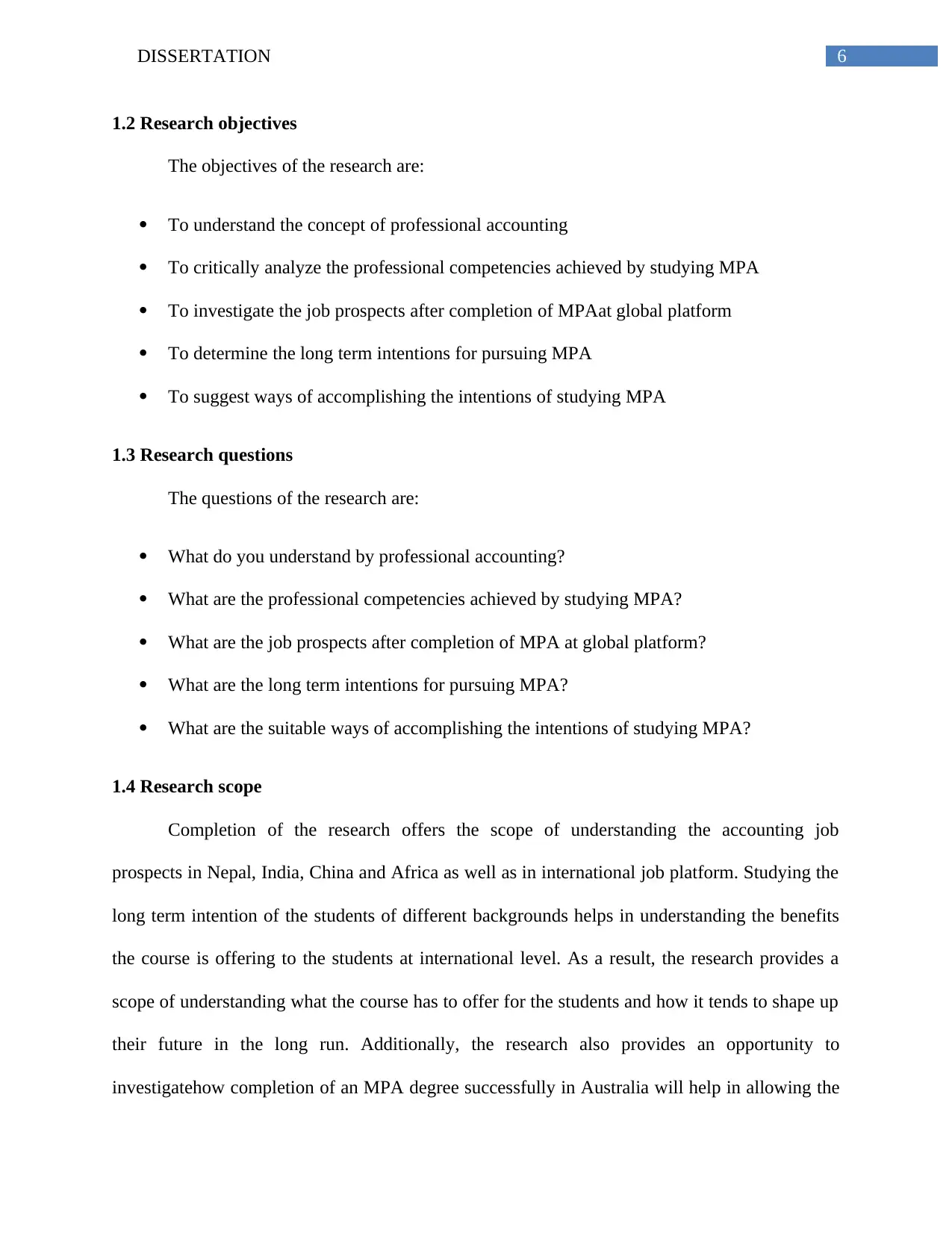
6DISSERTATION
1.2 Research objectives
The objectives of the research are:
To understand the concept of professional accounting
To critically analyze the professional competencies achieved by studying MPA
To investigate the job prospects after completion of MPAat global platform
To determine the long term intentions for pursuing MPA
To suggest ways of accomplishing the intentions of studying MPA
1.3 Research questions
The questions of the research are:
What do you understand by professional accounting?
What are the professional competencies achieved by studying MPA?
What are the job prospects after completion of MPA at global platform?
What are the long term intentions for pursuing MPA?
What are the suitable ways of accomplishing the intentions of studying MPA?
1.4 Research scope
Completion of the research offers the scope of understanding the accounting job
prospects in Nepal, India, China and Africa as well as in international job platform. Studying the
long term intention of the students of different backgrounds helps in understanding the benefits
the course is offering to the students at international level. As a result, the research provides a
scope of understanding what the course has to offer for the students and how it tends to shape up
their future in the long run. Additionally, the research also provides an opportunity to
investigatehow completion of an MPA degree successfully in Australia will help in allowing the
1.2 Research objectives
The objectives of the research are:
To understand the concept of professional accounting
To critically analyze the professional competencies achieved by studying MPA
To investigate the job prospects after completion of MPAat global platform
To determine the long term intentions for pursuing MPA
To suggest ways of accomplishing the intentions of studying MPA
1.3 Research questions
The questions of the research are:
What do you understand by professional accounting?
What are the professional competencies achieved by studying MPA?
What are the job prospects after completion of MPA at global platform?
What are the long term intentions for pursuing MPA?
What are the suitable ways of accomplishing the intentions of studying MPA?
1.4 Research scope
Completion of the research offers the scope of understanding the accounting job
prospects in Nepal, India, China and Africa as well as in international job platform. Studying the
long term intention of the students of different backgrounds helps in understanding the benefits
the course is offering to the students at international level. As a result, the research provides a
scope of understanding what the course has to offer for the students and how it tends to shape up
their future in the long run. Additionally, the research also provides an opportunity to
investigatehow completion of an MPA degree successfully in Australia will help in allowing the
Paraphrase This Document
Need a fresh take? Get an instant paraphrase of this document with our AI Paraphraser
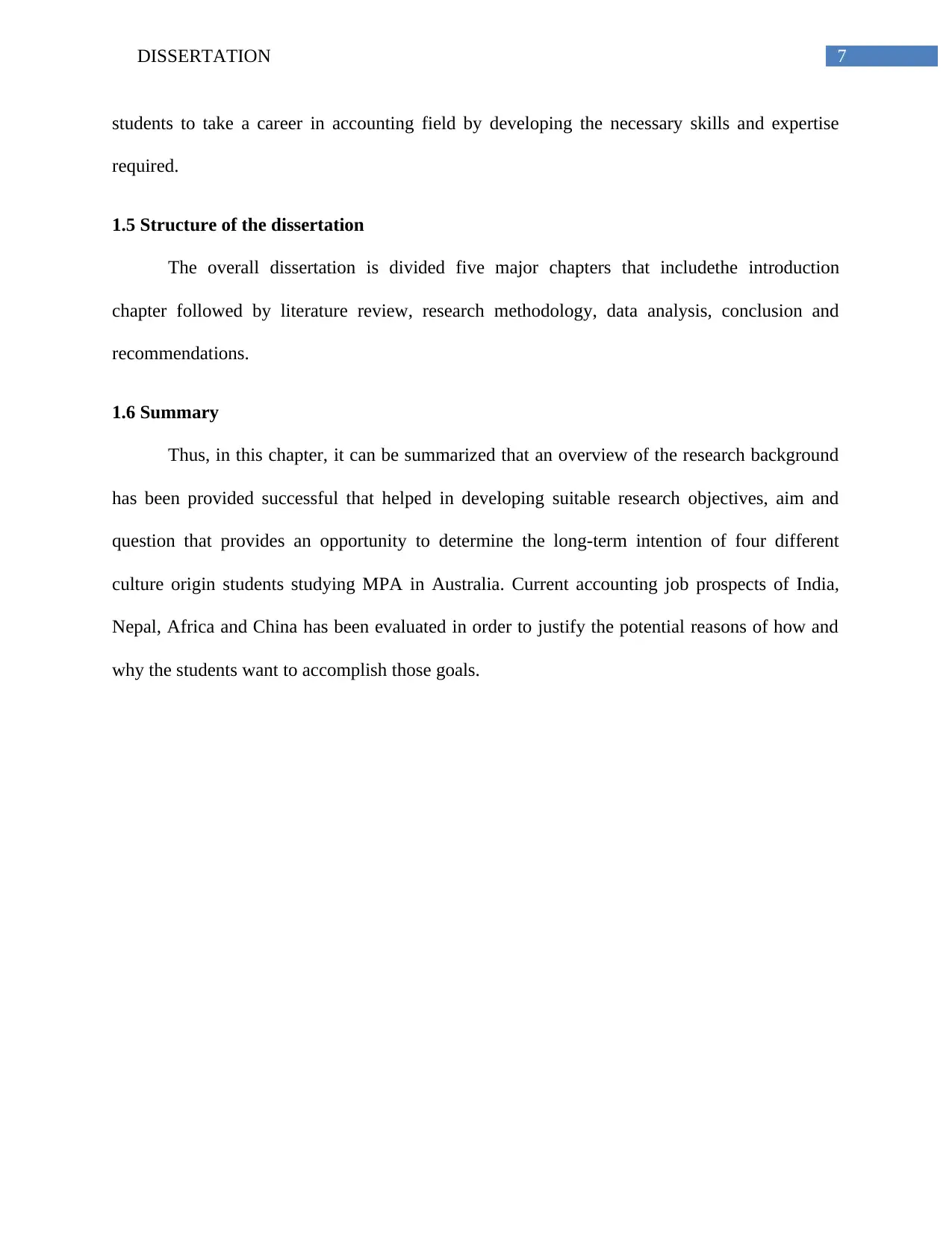
7DISSERTATION
students to take a career in accounting field by developing the necessary skills and expertise
required.
1.5 Structure of the dissertation
The overall dissertation is divided five major chapters that includethe introduction
chapter followed by literature review, research methodology, data analysis, conclusion and
recommendations.
1.6 Summary
Thus, in this chapter, it can be summarized that an overview of the research background
has been provided successful that helped in developing suitable research objectives, aim and
question that provides an opportunity to determine the long-term intention of four different
culture origin students studying MPA in Australia. Current accounting job prospects of India,
Nepal, Africa and China has been evaluated in order to justify the potential reasons of how and
why the students want to accomplish those goals.
students to take a career in accounting field by developing the necessary skills and expertise
required.
1.5 Structure of the dissertation
The overall dissertation is divided five major chapters that includethe introduction
chapter followed by literature review, research methodology, data analysis, conclusion and
recommendations.
1.6 Summary
Thus, in this chapter, it can be summarized that an overview of the research background
has been provided successful that helped in developing suitable research objectives, aim and
question that provides an opportunity to determine the long-term intention of four different
culture origin students studying MPA in Australia. Current accounting job prospects of India,
Nepal, Africa and China has been evaluated in order to justify the potential reasons of how and
why the students want to accomplish those goals.
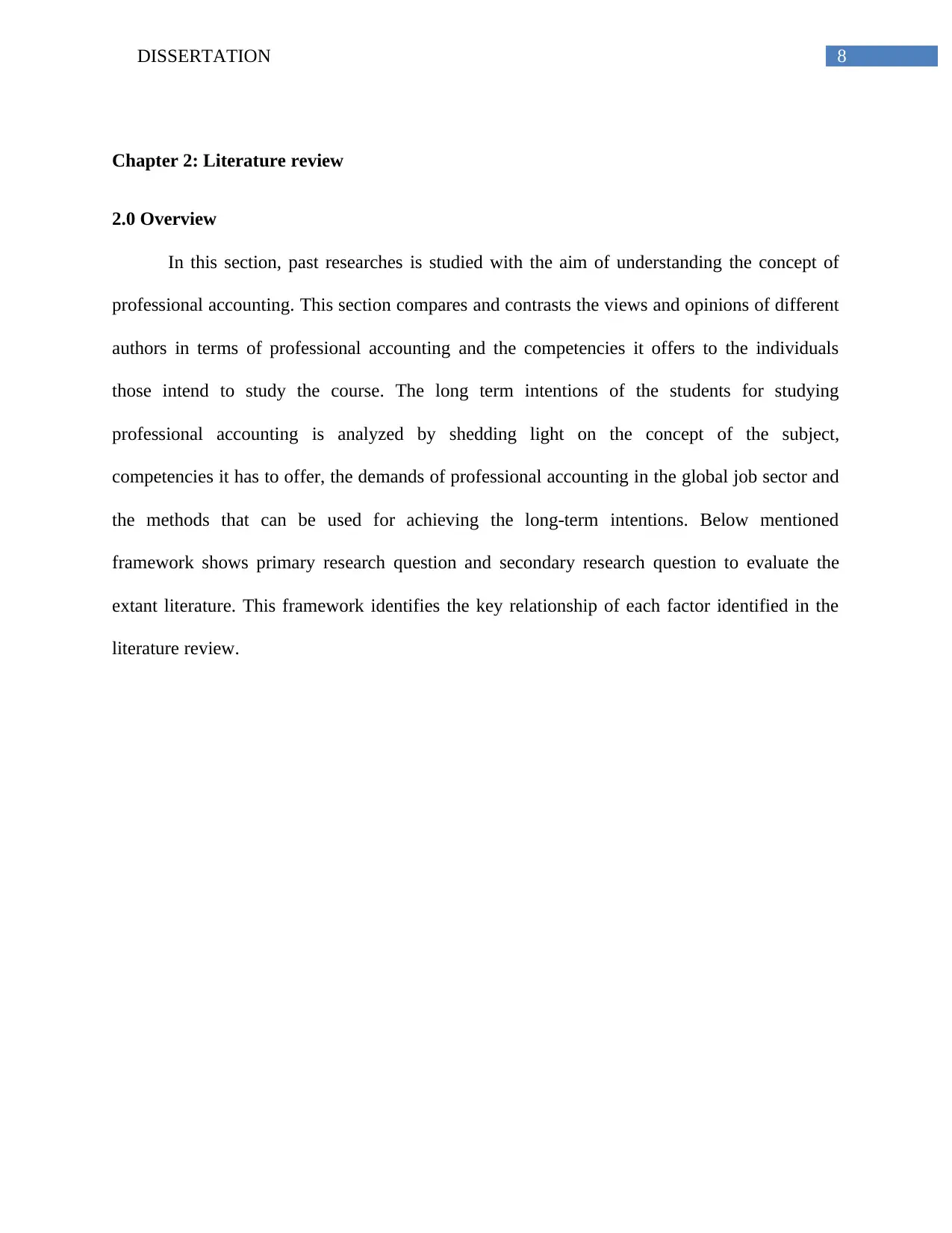
8DISSERTATION
Chapter 2: Literature review
2.0 Overview
In this section, past researches is studied with the aim of understanding the concept of
professional accounting. This section compares and contrasts the views and opinions of different
authors in terms of professional accounting and the competencies it offers to the individuals
those intend to study the course. The long term intentions of the students for studying
professional accounting is analyzed by shedding light on the concept of the subject,
competencies it has to offer, the demands of professional accounting in the global job sector and
the methods that can be used for achieving the long-term intentions. Below mentioned
framework shows primary research question and secondary research question to evaluate the
extant literature. This framework identifies the key relationship of each factor identified in the
literature review.
Chapter 2: Literature review
2.0 Overview
In this section, past researches is studied with the aim of understanding the concept of
professional accounting. This section compares and contrasts the views and opinions of different
authors in terms of professional accounting and the competencies it offers to the individuals
those intend to study the course. The long term intentions of the students for studying
professional accounting is analyzed by shedding light on the concept of the subject,
competencies it has to offer, the demands of professional accounting in the global job sector and
the methods that can be used for achieving the long-term intentions. Below mentioned
framework shows primary research question and secondary research question to evaluate the
extant literature. This framework identifies the key relationship of each factor identified in the
literature review.
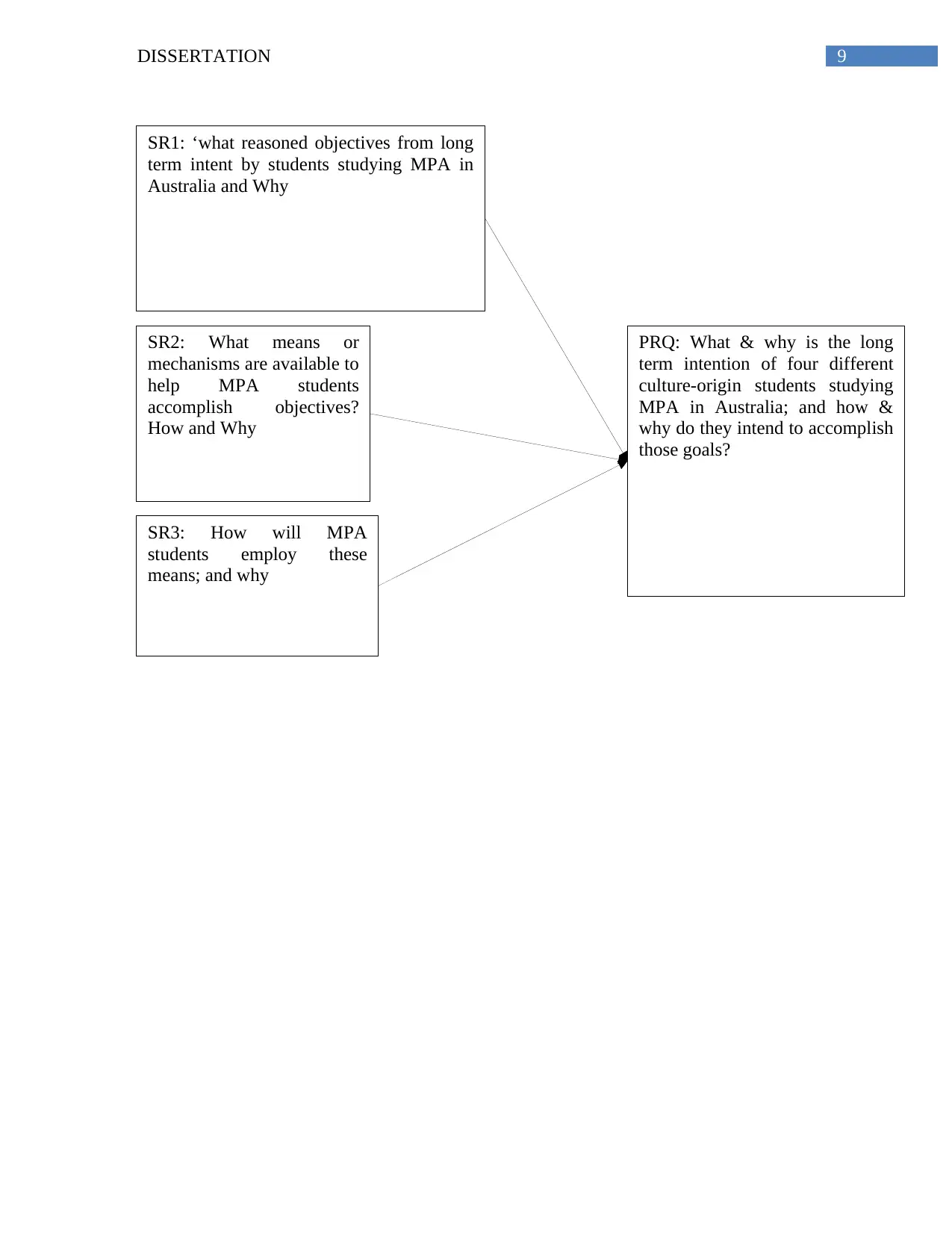
9DISSERTATION
SR1: ‘what reasoned objectives from long
term intent by students studying MPA in
Australia and Why
SR2: What means or
mechanisms are available to
help MPA students
accomplish objectives?
How and Why
SR3: How will MPA
students employ these
means; and why
PRQ: What & why is the long
term intention of four different
culture-origin students studying
MPA in Australia; and how &
why do they intend to accomplish
those goals?
SR1: ‘what reasoned objectives from long
term intent by students studying MPA in
Australia and Why
SR2: What means or
mechanisms are available to
help MPA students
accomplish objectives?
How and Why
SR3: How will MPA
students employ these
means; and why
PRQ: What & why is the long
term intention of four different
culture-origin students studying
MPA in Australia; and how &
why do they intend to accomplish
those goals?
Secure Best Marks with AI Grader
Need help grading? Try our AI Grader for instant feedback on your assignments.
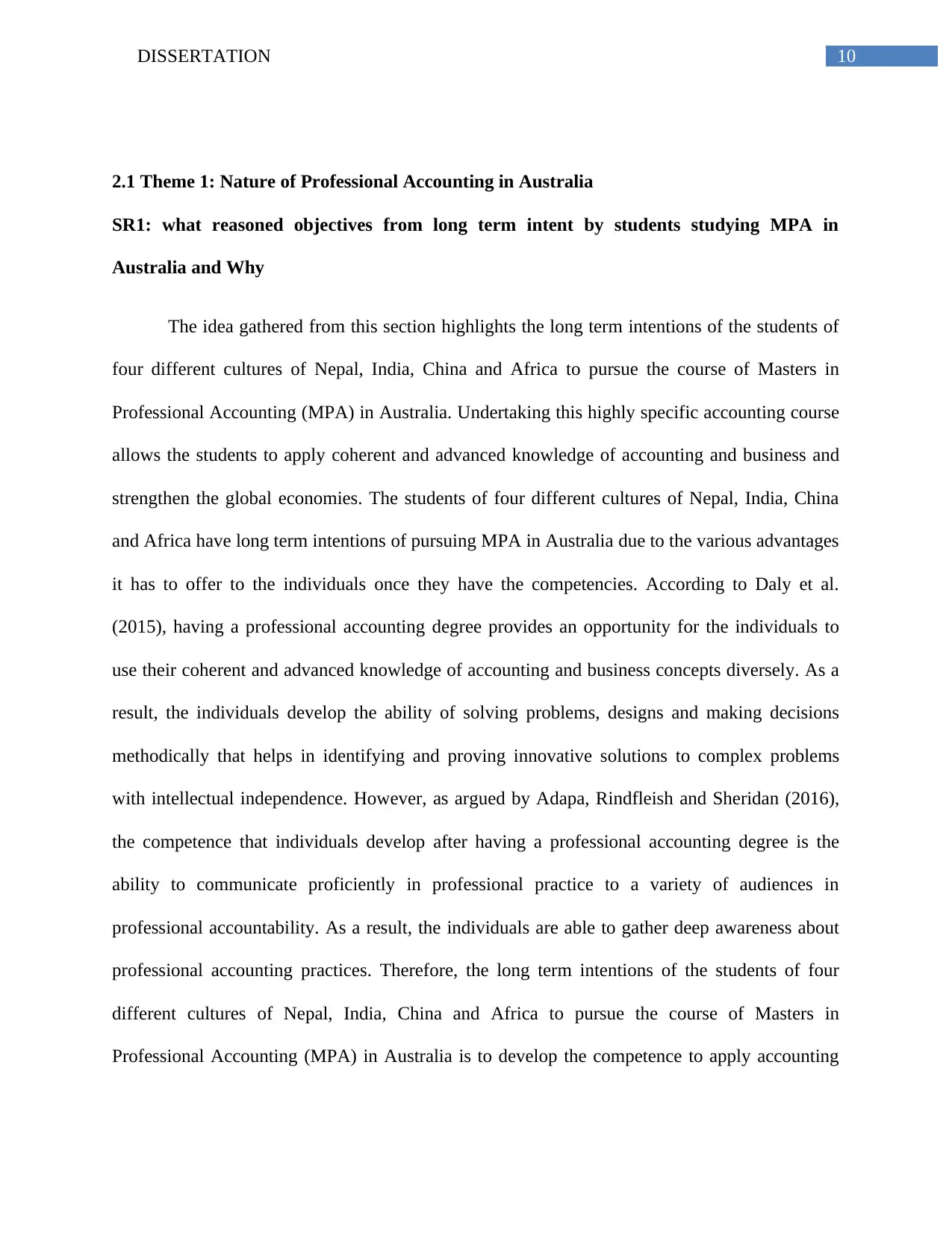
10DISSERTATION
2.1 Theme 1: Nature of Professional Accounting in Australia
SR1: what reasoned objectives from long term intent by students studying MPA in
Australia and Why
The idea gathered from this section highlights the long term intentions of the students of
four different cultures of Nepal, India, China and Africa to pursue the course of Masters in
Professional Accounting (MPA) in Australia. Undertaking this highly specific accounting course
allows the students to apply coherent and advanced knowledge of accounting and business and
strengthen the global economies. The students of four different cultures of Nepal, India, China
and Africa have long term intentions of pursuing MPA in Australia due to the various advantages
it has to offer to the individuals once they have the competencies. According to Daly et al.
(2015), having a professional accounting degree provides an opportunity for the individuals to
use their coherent and advanced knowledge of accounting and business concepts diversely. As a
result, the individuals develop the ability of solving problems, designs and making decisions
methodically that helps in identifying and proving innovative solutions to complex problems
with intellectual independence. However, as argued by Adapa, Rindfleish and Sheridan (2016),
the competence that individuals develop after having a professional accounting degree is the
ability to communicate proficiently in professional practice to a variety of audiences in
professional accountability. As a result, the individuals are able to gather deep awareness about
professional accounting practices. Therefore, the long term intentions of the students of four
different cultures of Nepal, India, China and Africa to pursue the course of Masters in
Professional Accounting (MPA) in Australia is to develop the competence to apply accounting
2.1 Theme 1: Nature of Professional Accounting in Australia
SR1: what reasoned objectives from long term intent by students studying MPA in
Australia and Why
The idea gathered from this section highlights the long term intentions of the students of
four different cultures of Nepal, India, China and Africa to pursue the course of Masters in
Professional Accounting (MPA) in Australia. Undertaking this highly specific accounting course
allows the students to apply coherent and advanced knowledge of accounting and business and
strengthen the global economies. The students of four different cultures of Nepal, India, China
and Africa have long term intentions of pursuing MPA in Australia due to the various advantages
it has to offer to the individuals once they have the competencies. According to Daly et al.
(2015), having a professional accounting degree provides an opportunity for the individuals to
use their coherent and advanced knowledge of accounting and business concepts diversely. As a
result, the individuals develop the ability of solving problems, designs and making decisions
methodically that helps in identifying and proving innovative solutions to complex problems
with intellectual independence. However, as argued by Adapa, Rindfleish and Sheridan (2016),
the competence that individuals develop after having a professional accounting degree is the
ability to communicate proficiently in professional practice to a variety of audiences in
professional accountability. As a result, the individuals are able to gather deep awareness about
professional accounting practices. Therefore, the long term intentions of the students of four
different cultures of Nepal, India, China and Africa to pursue the course of Masters in
Professional Accounting (MPA) in Australia is to develop the competence to apply accounting
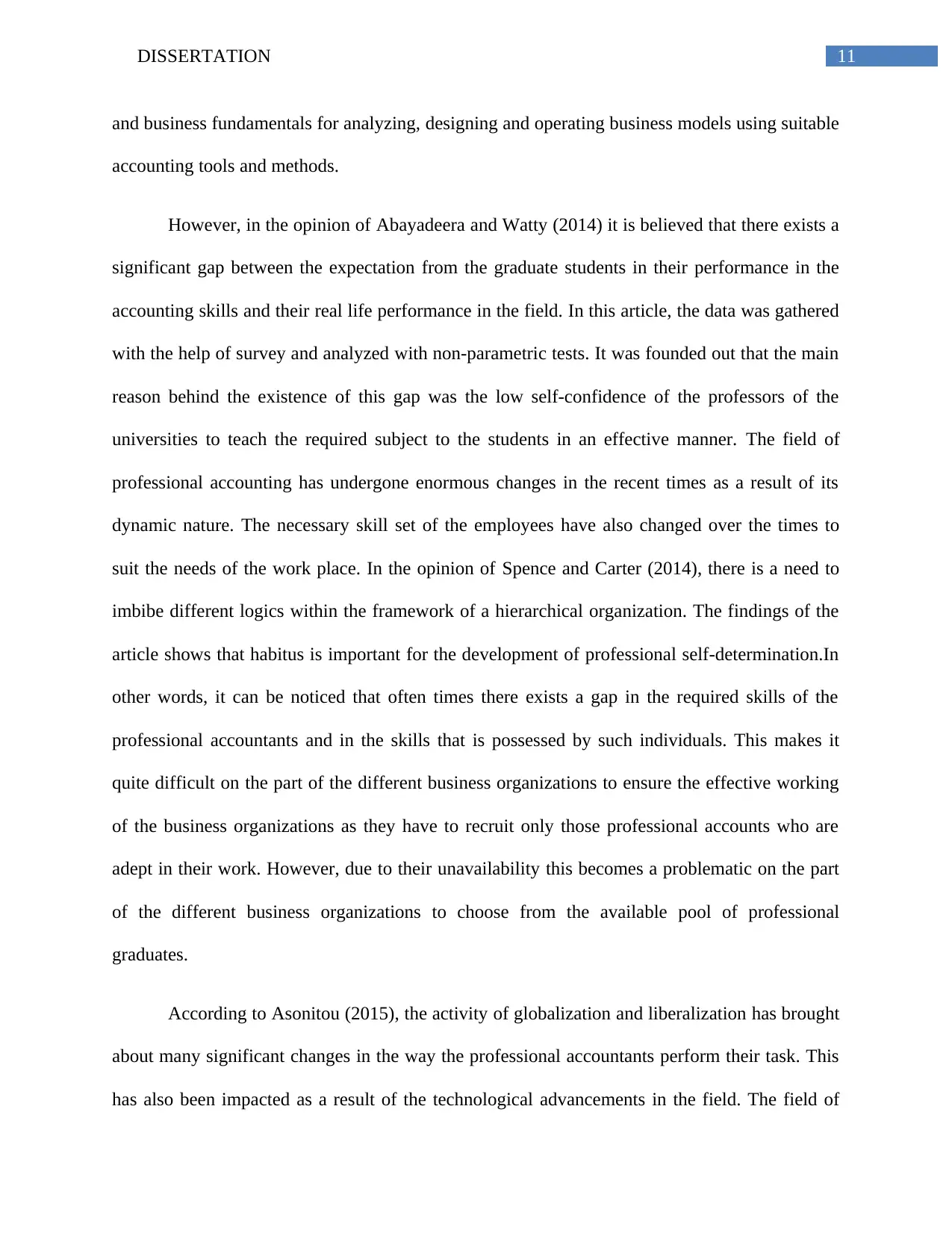
11DISSERTATION
and business fundamentals for analyzing, designing and operating business models using suitable
accounting tools and methods.
However, in the opinion of Abayadeera and Watty (2014) it is believed that there exists a
significant gap between the expectation from the graduate students in their performance in the
accounting skills and their real life performance in the field. In this article, the data was gathered
with the help of survey and analyzed with non-parametric tests. It was founded out that the main
reason behind the existence of this gap was the low self-confidence of the professors of the
universities to teach the required subject to the students in an effective manner. The field of
professional accounting has undergone enormous changes in the recent times as a result of its
dynamic nature. The necessary skill set of the employees have also changed over the times to
suit the needs of the work place. In the opinion of Spence and Carter (2014), there is a need to
imbibe different logics within the framework of a hierarchical organization. The findings of the
article shows that habitus is important for the development of professional self-determination.In
other words, it can be noticed that often times there exists a gap in the required skills of the
professional accountants and in the skills that is possessed by such individuals. This makes it
quite difficult on the part of the different business organizations to ensure the effective working
of the business organizations as they have to recruit only those professional accounts who are
adept in their work. However, due to their unavailability this becomes a problematic on the part
of the different business organizations to choose from the available pool of professional
graduates.
According to Asonitou (2015), the activity of globalization and liberalization has brought
about many significant changes in the way the professional accountants perform their task. This
has also been impacted as a result of the technological advancements in the field. The field of
and business fundamentals for analyzing, designing and operating business models using suitable
accounting tools and methods.
However, in the opinion of Abayadeera and Watty (2014) it is believed that there exists a
significant gap between the expectation from the graduate students in their performance in the
accounting skills and their real life performance in the field. In this article, the data was gathered
with the help of survey and analyzed with non-parametric tests. It was founded out that the main
reason behind the existence of this gap was the low self-confidence of the professors of the
universities to teach the required subject to the students in an effective manner. The field of
professional accounting has undergone enormous changes in the recent times as a result of its
dynamic nature. The necessary skill set of the employees have also changed over the times to
suit the needs of the work place. In the opinion of Spence and Carter (2014), there is a need to
imbibe different logics within the framework of a hierarchical organization. The findings of the
article shows that habitus is important for the development of professional self-determination.In
other words, it can be noticed that often times there exists a gap in the required skills of the
professional accountants and in the skills that is possessed by such individuals. This makes it
quite difficult on the part of the different business organizations to ensure the effective working
of the business organizations as they have to recruit only those professional accounts who are
adept in their work. However, due to their unavailability this becomes a problematic on the part
of the different business organizations to choose from the available pool of professional
graduates.
According to Asonitou (2015), the activity of globalization and liberalization has brought
about many significant changes in the way the professional accountants perform their task. This
has also been impacted as a result of the technological advancements in the field. The field of
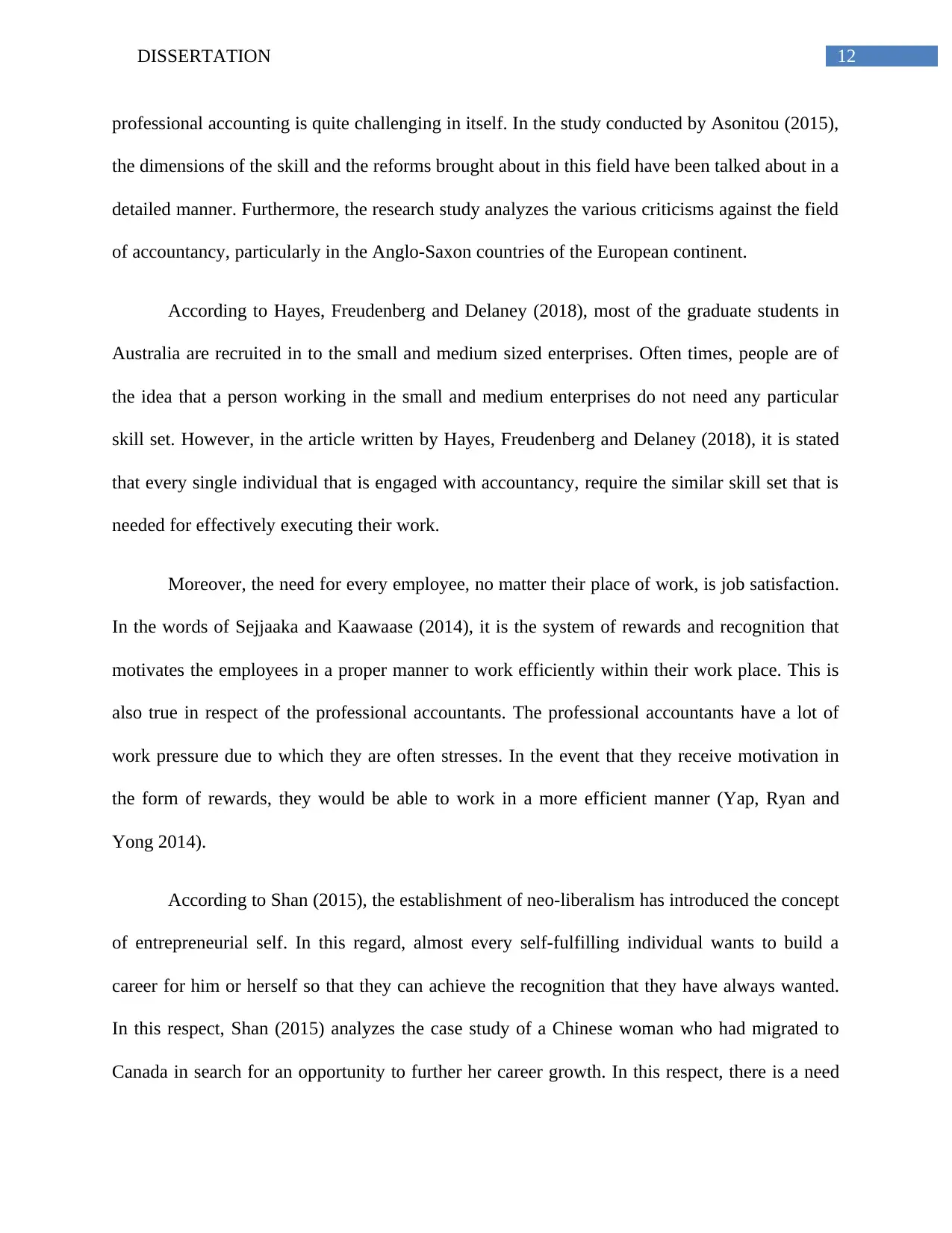
12DISSERTATION
professional accounting is quite challenging in itself. In the study conducted by Asonitou (2015),
the dimensions of the skill and the reforms brought about in this field have been talked about in a
detailed manner. Furthermore, the research study analyzes the various criticisms against the field
of accountancy, particularly in the Anglo-Saxon countries of the European continent.
According to Hayes, Freudenberg and Delaney (2018), most of the graduate students in
Australia are recruited in to the small and medium sized enterprises. Often times, people are of
the idea that a person working in the small and medium enterprises do not need any particular
skill set. However, in the article written by Hayes, Freudenberg and Delaney (2018), it is stated
that every single individual that is engaged with accountancy, require the similar skill set that is
needed for effectively executing their work.
Moreover, the need for every employee, no matter their place of work, is job satisfaction.
In the words of Sejjaaka and Kaawaase (2014), it is the system of rewards and recognition that
motivates the employees in a proper manner to work efficiently within their work place. This is
also true in respect of the professional accountants. The professional accountants have a lot of
work pressure due to which they are often stresses. In the event that they receive motivation in
the form of rewards, they would be able to work in a more efficient manner (Yap, Ryan and
Yong 2014).
According to Shan (2015), the establishment of neo-liberalism has introduced the concept
of entrepreneurial self. In this regard, almost every self-fulfilling individual wants to build a
career for him or herself so that they can achieve the recognition that they have always wanted.
In this respect, Shan (2015) analyzes the case study of a Chinese woman who had migrated to
Canada in search for an opportunity to further her career growth. In this respect, there is a need
professional accounting is quite challenging in itself. In the study conducted by Asonitou (2015),
the dimensions of the skill and the reforms brought about in this field have been talked about in a
detailed manner. Furthermore, the research study analyzes the various criticisms against the field
of accountancy, particularly in the Anglo-Saxon countries of the European continent.
According to Hayes, Freudenberg and Delaney (2018), most of the graduate students in
Australia are recruited in to the small and medium sized enterprises. Often times, people are of
the idea that a person working in the small and medium enterprises do not need any particular
skill set. However, in the article written by Hayes, Freudenberg and Delaney (2018), it is stated
that every single individual that is engaged with accountancy, require the similar skill set that is
needed for effectively executing their work.
Moreover, the need for every employee, no matter their place of work, is job satisfaction.
In the words of Sejjaaka and Kaawaase (2014), it is the system of rewards and recognition that
motivates the employees in a proper manner to work efficiently within their work place. This is
also true in respect of the professional accountants. The professional accountants have a lot of
work pressure due to which they are often stresses. In the event that they receive motivation in
the form of rewards, they would be able to work in a more efficient manner (Yap, Ryan and
Yong 2014).
According to Shan (2015), the establishment of neo-liberalism has introduced the concept
of entrepreneurial self. In this regard, almost every self-fulfilling individual wants to build a
career for him or herself so that they can achieve the recognition that they have always wanted.
In this respect, Shan (2015) analyzes the case study of a Chinese woman who had migrated to
Canada in search for an opportunity to further her career growth. In this respect, there is a need
Paraphrase This Document
Need a fresh take? Get an instant paraphrase of this document with our AI Paraphraser
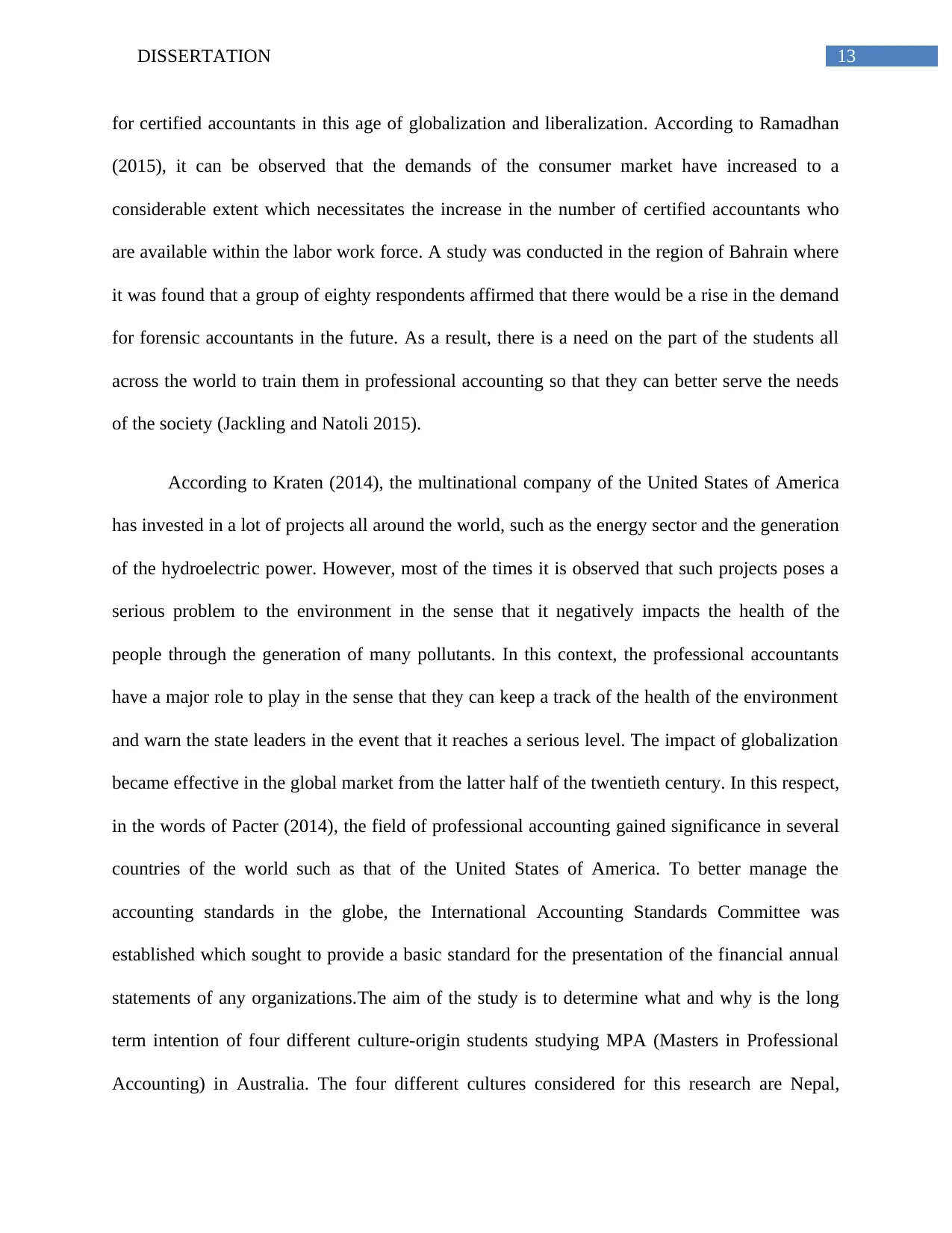
13DISSERTATION
for certified accountants in this age of globalization and liberalization. According to Ramadhan
(2015), it can be observed that the demands of the consumer market have increased to a
considerable extent which necessitates the increase in the number of certified accountants who
are available within the labor work force. A study was conducted in the region of Bahrain where
it was found that a group of eighty respondents affirmed that there would be a rise in the demand
for forensic accountants in the future. As a result, there is a need on the part of the students all
across the world to train them in professional accounting so that they can better serve the needs
of the society (Jackling and Natoli 2015).
According to Kraten (2014), the multinational company of the United States of America
has invested in a lot of projects all around the world, such as the energy sector and the generation
of the hydroelectric power. However, most of the times it is observed that such projects poses a
serious problem to the environment in the sense that it negatively impacts the health of the
people through the generation of many pollutants. In this context, the professional accountants
have a major role to play in the sense that they can keep a track of the health of the environment
and warn the state leaders in the event that it reaches a serious level. The impact of globalization
became effective in the global market from the latter half of the twentieth century. In this respect,
in the words of Pacter (2014), the field of professional accounting gained significance in several
countries of the world such as that of the United States of America. To better manage the
accounting standards in the globe, the International Accounting Standards Committee was
established which sought to provide a basic standard for the presentation of the financial annual
statements of any organizations.The aim of the study is to determine what and why is the long
term intention of four different culture-origin students studying MPA (Masters in Professional
Accounting) in Australia. The four different cultures considered for this research are Nepal,
for certified accountants in this age of globalization and liberalization. According to Ramadhan
(2015), it can be observed that the demands of the consumer market have increased to a
considerable extent which necessitates the increase in the number of certified accountants who
are available within the labor work force. A study was conducted in the region of Bahrain where
it was found that a group of eighty respondents affirmed that there would be a rise in the demand
for forensic accountants in the future. As a result, there is a need on the part of the students all
across the world to train them in professional accounting so that they can better serve the needs
of the society (Jackling and Natoli 2015).
According to Kraten (2014), the multinational company of the United States of America
has invested in a lot of projects all around the world, such as the energy sector and the generation
of the hydroelectric power. However, most of the times it is observed that such projects poses a
serious problem to the environment in the sense that it negatively impacts the health of the
people through the generation of many pollutants. In this context, the professional accountants
have a major role to play in the sense that they can keep a track of the health of the environment
and warn the state leaders in the event that it reaches a serious level. The impact of globalization
became effective in the global market from the latter half of the twentieth century. In this respect,
in the words of Pacter (2014), the field of professional accounting gained significance in several
countries of the world such as that of the United States of America. To better manage the
accounting standards in the globe, the International Accounting Standards Committee was
established which sought to provide a basic standard for the presentation of the financial annual
statements of any organizations.The aim of the study is to determine what and why is the long
term intention of four different culture-origin students studying MPA (Masters in Professional
Accounting) in Australia. The four different cultures considered for this research are Nepal,
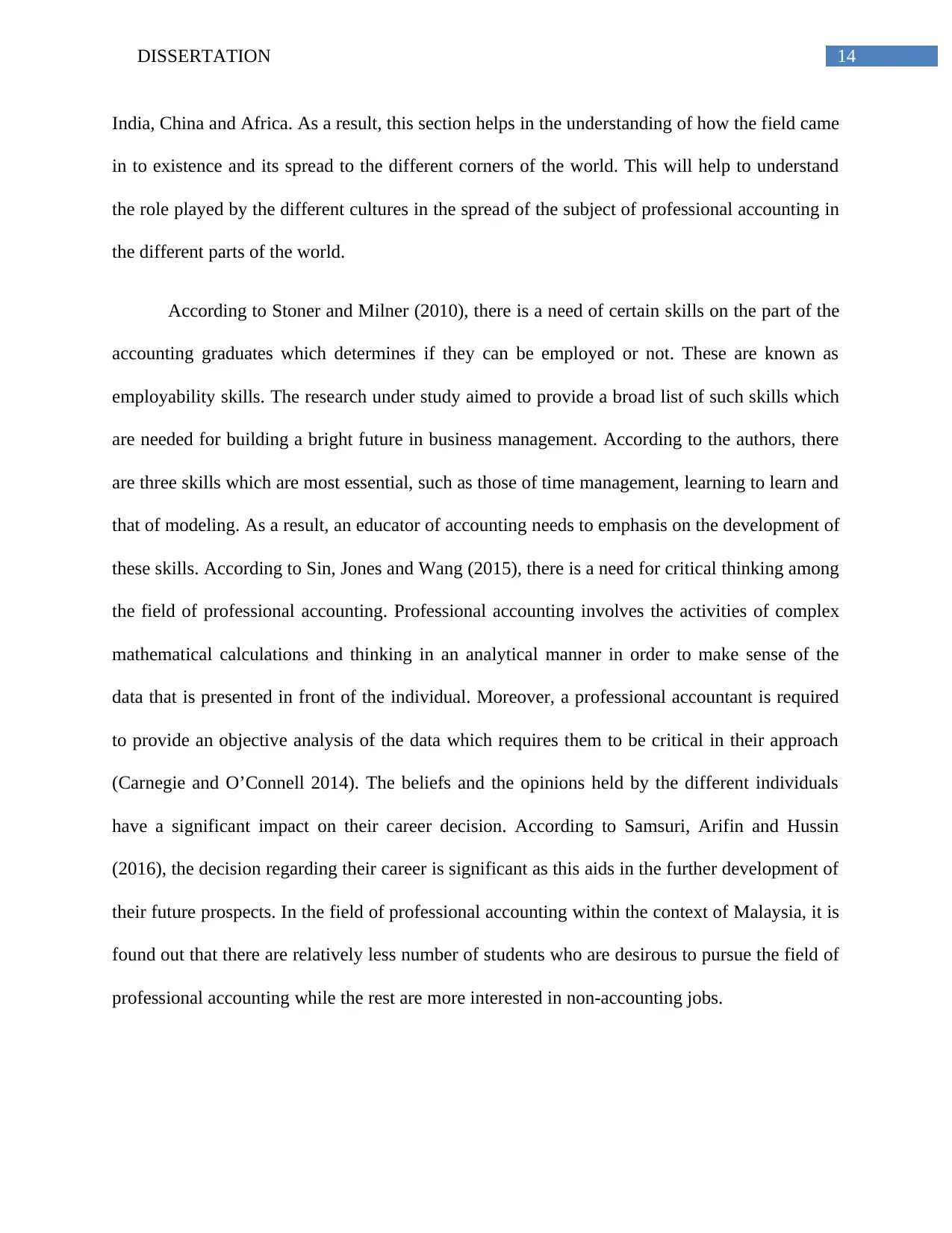
14DISSERTATION
India, China and Africa. As a result, this section helps in the understanding of how the field came
in to existence and its spread to the different corners of the world. This will help to understand
the role played by the different cultures in the spread of the subject of professional accounting in
the different parts of the world.
According to Stoner and Milner (2010), there is a need of certain skills on the part of the
accounting graduates which determines if they can be employed or not. These are known as
employability skills. The research under study aimed to provide a broad list of such skills which
are needed for building a bright future in business management. According to the authors, there
are three skills which are most essential, such as those of time management, learning to learn and
that of modeling. As a result, an educator of accounting needs to emphasis on the development of
these skills. According to Sin, Jones and Wang (2015), there is a need for critical thinking among
the field of professional accounting. Professional accounting involves the activities of complex
mathematical calculations and thinking in an analytical manner in order to make sense of the
data that is presented in front of the individual. Moreover, a professional accountant is required
to provide an objective analysis of the data which requires them to be critical in their approach
(Carnegie and O’Connell 2014). The beliefs and the opinions held by the different individuals
have a significant impact on their career decision. According to Samsuri, Arifin and Hussin
(2016), the decision regarding their career is significant as this aids in the further development of
their future prospects. In the field of professional accounting within the context of Malaysia, it is
found out that there are relatively less number of students who are desirous to pursue the field of
professional accounting while the rest are more interested in non-accounting jobs.
India, China and Africa. As a result, this section helps in the understanding of how the field came
in to existence and its spread to the different corners of the world. This will help to understand
the role played by the different cultures in the spread of the subject of professional accounting in
the different parts of the world.
According to Stoner and Milner (2010), there is a need of certain skills on the part of the
accounting graduates which determines if they can be employed or not. These are known as
employability skills. The research under study aimed to provide a broad list of such skills which
are needed for building a bright future in business management. According to the authors, there
are three skills which are most essential, such as those of time management, learning to learn and
that of modeling. As a result, an educator of accounting needs to emphasis on the development of
these skills. According to Sin, Jones and Wang (2015), there is a need for critical thinking among
the field of professional accounting. Professional accounting involves the activities of complex
mathematical calculations and thinking in an analytical manner in order to make sense of the
data that is presented in front of the individual. Moreover, a professional accountant is required
to provide an objective analysis of the data which requires them to be critical in their approach
(Carnegie and O’Connell 2014). The beliefs and the opinions held by the different individuals
have a significant impact on their career decision. According to Samsuri, Arifin and Hussin
(2016), the decision regarding their career is significant as this aids in the further development of
their future prospects. In the field of professional accounting within the context of Malaysia, it is
found out that there are relatively less number of students who are desirous to pursue the field of
professional accounting while the rest are more interested in non-accounting jobs.
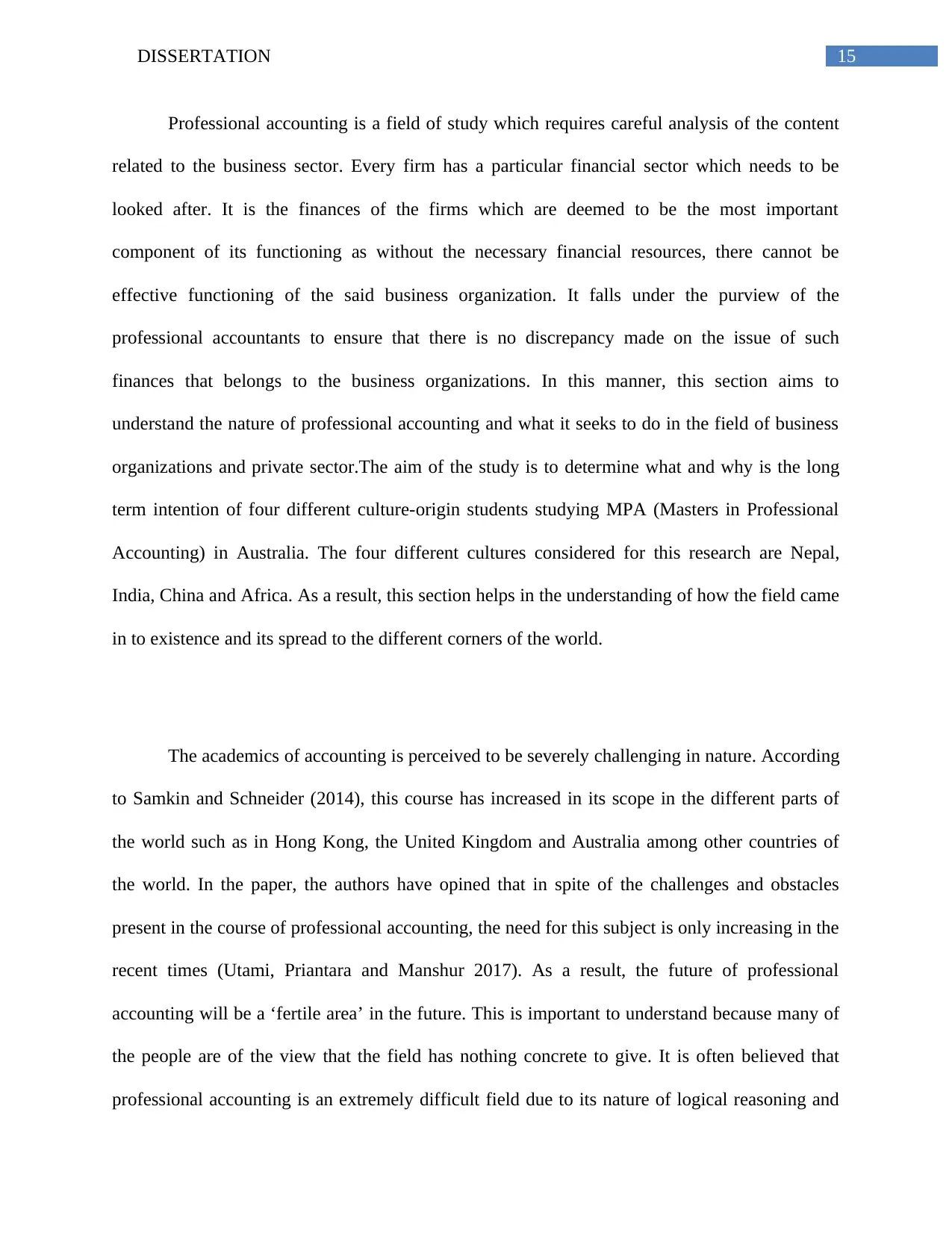
15DISSERTATION
Professional accounting is a field of study which requires careful analysis of the content
related to the business sector. Every firm has a particular financial sector which needs to be
looked after. It is the finances of the firms which are deemed to be the most important
component of its functioning as without the necessary financial resources, there cannot be
effective functioning of the said business organization. It falls under the purview of the
professional accountants to ensure that there is no discrepancy made on the issue of such
finances that belongs to the business organizations. In this manner, this section aims to
understand the nature of professional accounting and what it seeks to do in the field of business
organizations and private sector.The aim of the study is to determine what and why is the long
term intention of four different culture-origin students studying MPA (Masters in Professional
Accounting) in Australia. The four different cultures considered for this research are Nepal,
India, China and Africa. As a result, this section helps in the understanding of how the field came
in to existence and its spread to the different corners of the world.
The academics of accounting is perceived to be severely challenging in nature. According
to Samkin and Schneider (2014), this course has increased in its scope in the different parts of
the world such as in Hong Kong, the United Kingdom and Australia among other countries of
the world. In the paper, the authors have opined that in spite of the challenges and obstacles
present in the course of professional accounting, the need for this subject is only increasing in the
recent times (Utami, Priantara and Manshur 2017). As a result, the future of professional
accounting will be a ‘fertile area’ in the future. This is important to understand because many of
the people are of the view that the field has nothing concrete to give. It is often believed that
professional accounting is an extremely difficult field due to its nature of logical reasoning and
Professional accounting is a field of study which requires careful analysis of the content
related to the business sector. Every firm has a particular financial sector which needs to be
looked after. It is the finances of the firms which are deemed to be the most important
component of its functioning as without the necessary financial resources, there cannot be
effective functioning of the said business organization. It falls under the purview of the
professional accountants to ensure that there is no discrepancy made on the issue of such
finances that belongs to the business organizations. In this manner, this section aims to
understand the nature of professional accounting and what it seeks to do in the field of business
organizations and private sector.The aim of the study is to determine what and why is the long
term intention of four different culture-origin students studying MPA (Masters in Professional
Accounting) in Australia. The four different cultures considered for this research are Nepal,
India, China and Africa. As a result, this section helps in the understanding of how the field came
in to existence and its spread to the different corners of the world.
The academics of accounting is perceived to be severely challenging in nature. According
to Samkin and Schneider (2014), this course has increased in its scope in the different parts of
the world such as in Hong Kong, the United Kingdom and Australia among other countries of
the world. In the paper, the authors have opined that in spite of the challenges and obstacles
present in the course of professional accounting, the need for this subject is only increasing in the
recent times (Utami, Priantara and Manshur 2017). As a result, the future of professional
accounting will be a ‘fertile area’ in the future. This is important to understand because many of
the people are of the view that the field has nothing concrete to give. It is often believed that
professional accounting is an extremely difficult field due to its nature of logical reasoning and
Secure Best Marks with AI Grader
Need help grading? Try our AI Grader for instant feedback on your assignments.
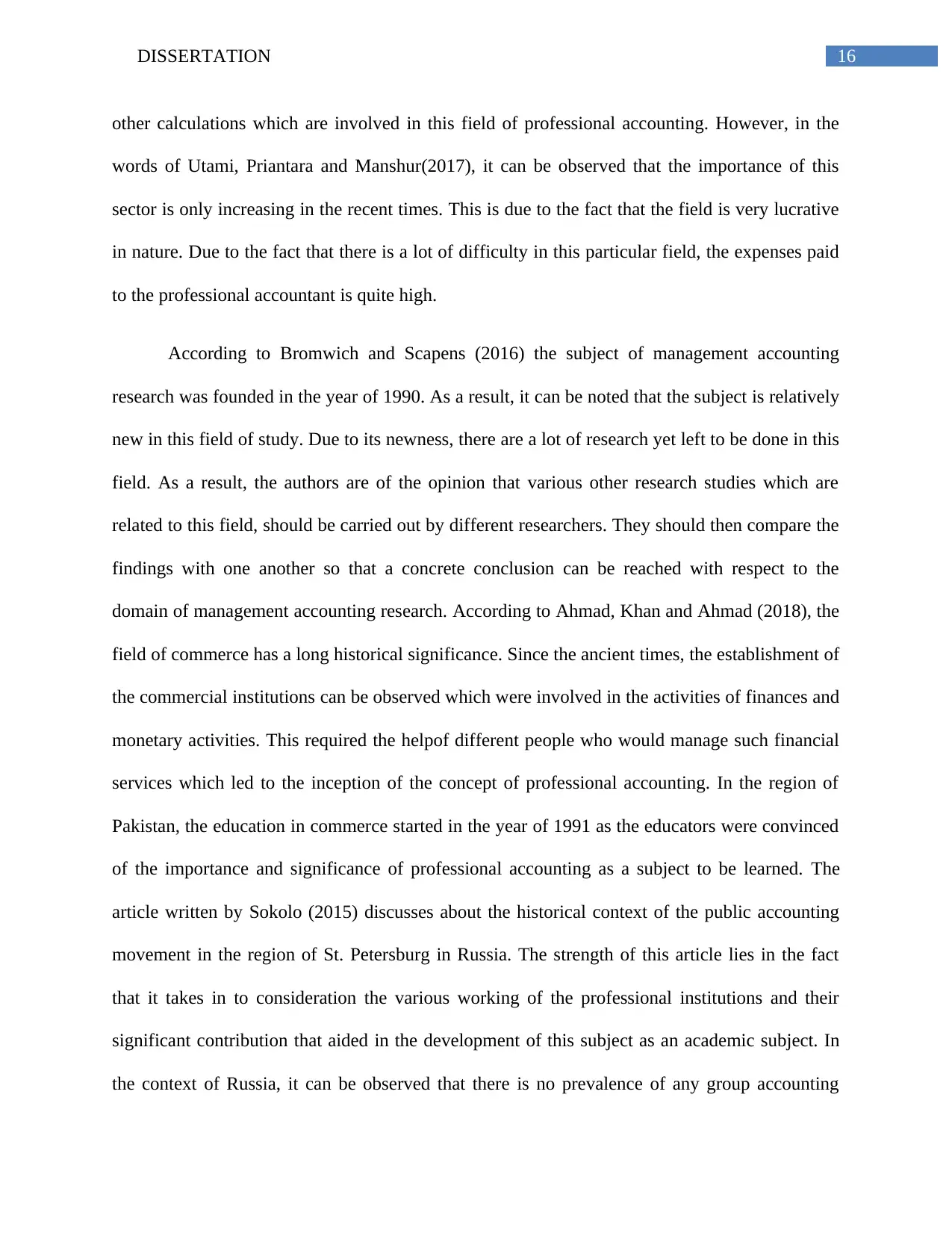
16DISSERTATION
other calculations which are involved in this field of professional accounting. However, in the
words of Utami, Priantara and Manshur(2017), it can be observed that the importance of this
sector is only increasing in the recent times. This is due to the fact that the field is very lucrative
in nature. Due to the fact that there is a lot of difficulty in this particular field, the expenses paid
to the professional accountant is quite high.
According to Bromwich and Scapens (2016) the subject of management accounting
research was founded in the year of 1990. As a result, it can be noted that the subject is relatively
new in this field of study. Due to its newness, there are a lot of research yet left to be done in this
field. As a result, the authors are of the opinion that various other research studies which are
related to this field, should be carried out by different researchers. They should then compare the
findings with one another so that a concrete conclusion can be reached with respect to the
domain of management accounting research. According to Ahmad, Khan and Ahmad (2018), the
field of commerce has a long historical significance. Since the ancient times, the establishment of
the commercial institutions can be observed which were involved in the activities of finances and
monetary activities. This required the helpof different people who would manage such financial
services which led to the inception of the concept of professional accounting. In the region of
Pakistan, the education in commerce started in the year of 1991 as the educators were convinced
of the importance and significance of professional accounting as a subject to be learned. The
article written by Sokolo (2015) discusses about the historical context of the public accounting
movement in the region of St. Petersburg in Russia. The strength of this article lies in the fact
that it takes in to consideration the various working of the professional institutions and their
significant contribution that aided in the development of this subject as an academic subject. In
the context of Russia, it can be observed that there is no prevalence of any group accounting
other calculations which are involved in this field of professional accounting. However, in the
words of Utami, Priantara and Manshur(2017), it can be observed that the importance of this
sector is only increasing in the recent times. This is due to the fact that the field is very lucrative
in nature. Due to the fact that there is a lot of difficulty in this particular field, the expenses paid
to the professional accountant is quite high.
According to Bromwich and Scapens (2016) the subject of management accounting
research was founded in the year of 1990. As a result, it can be noted that the subject is relatively
new in this field of study. Due to its newness, there are a lot of research yet left to be done in this
field. As a result, the authors are of the opinion that various other research studies which are
related to this field, should be carried out by different researchers. They should then compare the
findings with one another so that a concrete conclusion can be reached with respect to the
domain of management accounting research. According to Ahmad, Khan and Ahmad (2018), the
field of commerce has a long historical significance. Since the ancient times, the establishment of
the commercial institutions can be observed which were involved in the activities of finances and
monetary activities. This required the helpof different people who would manage such financial
services which led to the inception of the concept of professional accounting. In the region of
Pakistan, the education in commerce started in the year of 1991 as the educators were convinced
of the importance and significance of professional accounting as a subject to be learned. The
article written by Sokolo (2015) discusses about the historical context of the public accounting
movement in the region of St. Petersburg in Russia. The strength of this article lies in the fact
that it takes in to consideration the various working of the professional institutions and their
significant contribution that aided in the development of this subject as an academic subject. In
the context of Russia, it can be observed that there is no prevalence of any group accounting
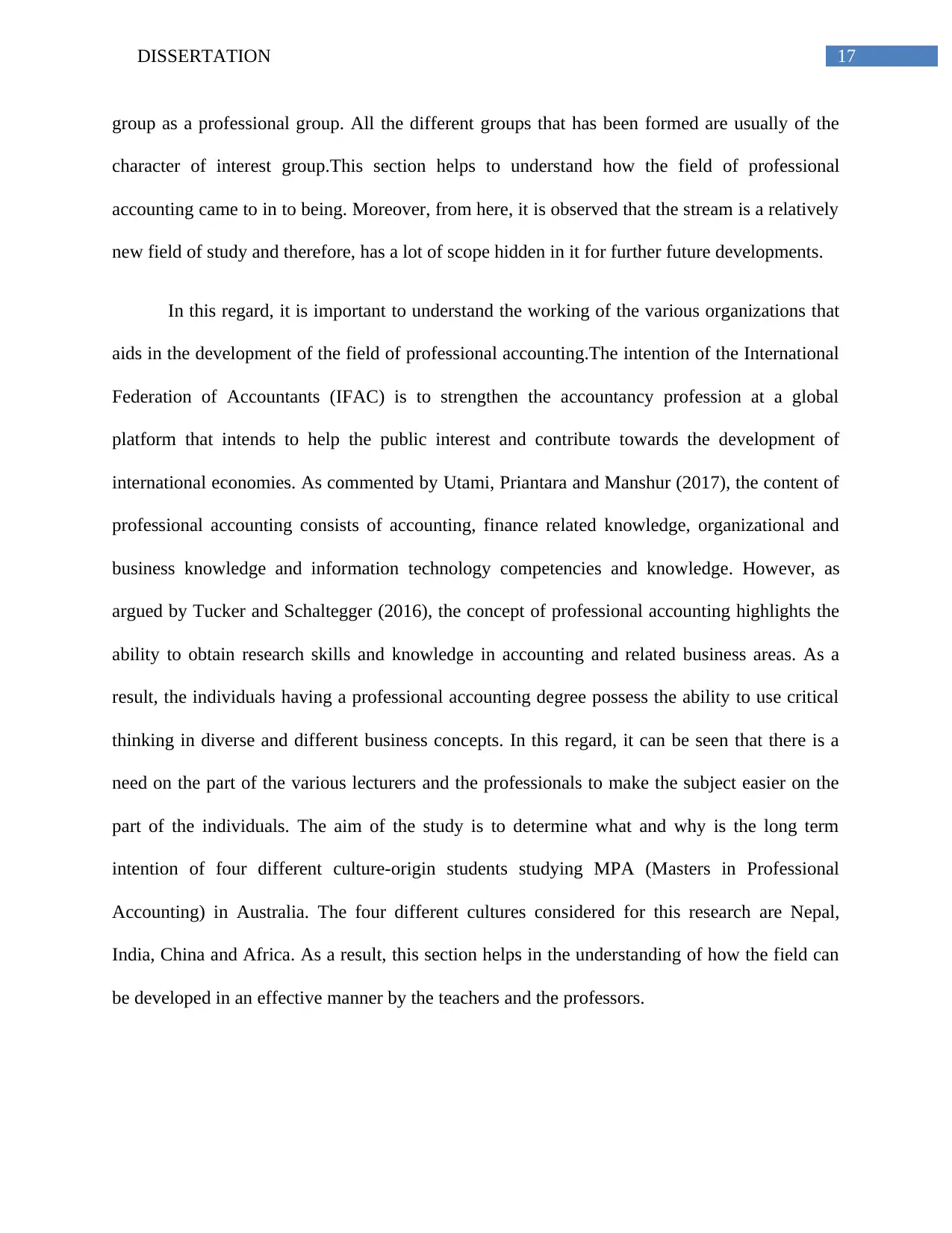
17DISSERTATION
group as a professional group. All the different groups that has been formed are usually of the
character of interest group.This section helps to understand how the field of professional
accounting came to in to being. Moreover, from here, it is observed that the stream is a relatively
new field of study and therefore, has a lot of scope hidden in it for further future developments.
In this regard, it is important to understand the working of the various organizations that
aids in the development of the field of professional accounting.The intention of the International
Federation of Accountants (IFAC) is to strengthen the accountancy profession at a global
platform that intends to help the public interest and contribute towards the development of
international economies. As commented by Utami, Priantara and Manshur (2017), the content of
professional accounting consists of accounting, finance related knowledge, organizational and
business knowledge and information technology competencies and knowledge. However, as
argued by Tucker and Schaltegger (2016), the concept of professional accounting highlights the
ability to obtain research skills and knowledge in accounting and related business areas. As a
result, the individuals having a professional accounting degree possess the ability to use critical
thinking in diverse and different business concepts. In this regard, it can be seen that there is a
need on the part of the various lecturers and the professionals to make the subject easier on the
part of the individuals. The aim of the study is to determine what and why is the long term
intention of four different culture-origin students studying MPA (Masters in Professional
Accounting) in Australia. The four different cultures considered for this research are Nepal,
India, China and Africa. As a result, this section helps in the understanding of how the field can
be developed in an effective manner by the teachers and the professors.
group as a professional group. All the different groups that has been formed are usually of the
character of interest group.This section helps to understand how the field of professional
accounting came to in to being. Moreover, from here, it is observed that the stream is a relatively
new field of study and therefore, has a lot of scope hidden in it for further future developments.
In this regard, it is important to understand the working of the various organizations that
aids in the development of the field of professional accounting.The intention of the International
Federation of Accountants (IFAC) is to strengthen the accountancy profession at a global
platform that intends to help the public interest and contribute towards the development of
international economies. As commented by Utami, Priantara and Manshur (2017), the content of
professional accounting consists of accounting, finance related knowledge, organizational and
business knowledge and information technology competencies and knowledge. However, as
argued by Tucker and Schaltegger (2016), the concept of professional accounting highlights the
ability to obtain research skills and knowledge in accounting and related business areas. As a
result, the individuals having a professional accounting degree possess the ability to use critical
thinking in diverse and different business concepts. In this regard, it can be seen that there is a
need on the part of the various lecturers and the professionals to make the subject easier on the
part of the individuals. The aim of the study is to determine what and why is the long term
intention of four different culture-origin students studying MPA (Masters in Professional
Accounting) in Australia. The four different cultures considered for this research are Nepal,
India, China and Africa. As a result, this section helps in the understanding of how the field can
be developed in an effective manner by the teachers and the professors.
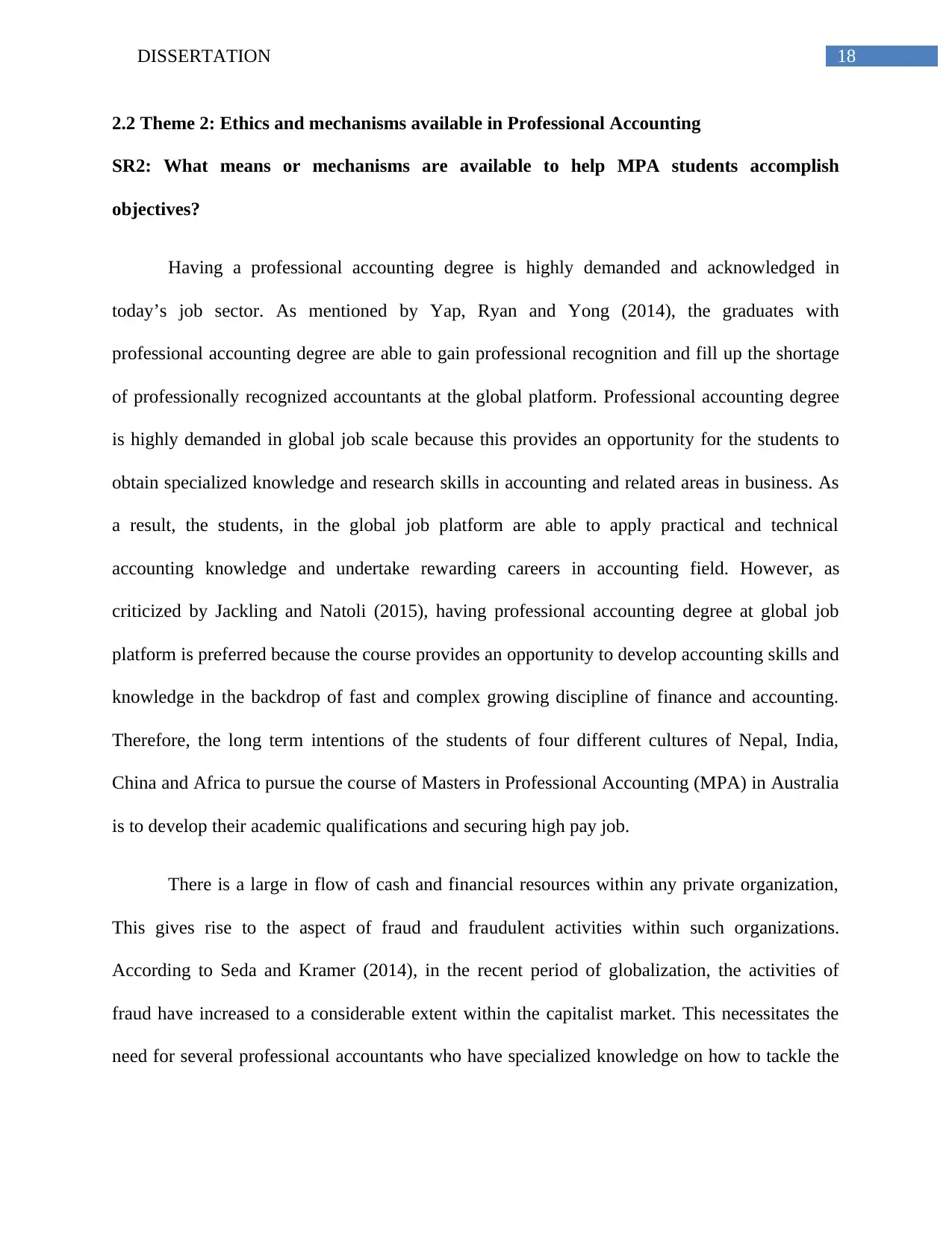
18DISSERTATION
2.2 Theme 2: Ethics and mechanisms available in Professional Accounting
SR2: What means or mechanisms are available to help MPA students accomplish
objectives?
Having a professional accounting degree is highly demanded and acknowledged in
today’s job sector. As mentioned by Yap, Ryan and Yong (2014), the graduates with
professional accounting degree are able to gain professional recognition and fill up the shortage
of professionally recognized accountants at the global platform. Professional accounting degree
is highly demanded in global job scale because this provides an opportunity for the students to
obtain specialized knowledge and research skills in accounting and related areas in business. As
a result, the students, in the global job platform are able to apply practical and technical
accounting knowledge and undertake rewarding careers in accounting field. However, as
criticized by Jackling and Natoli (2015), having professional accounting degree at global job
platform is preferred because the course provides an opportunity to develop accounting skills and
knowledge in the backdrop of fast and complex growing discipline of finance and accounting.
Therefore, the long term intentions of the students of four different cultures of Nepal, India,
China and Africa to pursue the course of Masters in Professional Accounting (MPA) in Australia
is to develop their academic qualifications and securing high pay job.
There is a large in flow of cash and financial resources within any private organization,
This gives rise to the aspect of fraud and fraudulent activities within such organizations.
According to Seda and Kramer (2014), in the recent period of globalization, the activities of
fraud have increased to a considerable extent within the capitalist market. This necessitates the
need for several professional accountants who have specialized knowledge on how to tackle the
2.2 Theme 2: Ethics and mechanisms available in Professional Accounting
SR2: What means or mechanisms are available to help MPA students accomplish
objectives?
Having a professional accounting degree is highly demanded and acknowledged in
today’s job sector. As mentioned by Yap, Ryan and Yong (2014), the graduates with
professional accounting degree are able to gain professional recognition and fill up the shortage
of professionally recognized accountants at the global platform. Professional accounting degree
is highly demanded in global job scale because this provides an opportunity for the students to
obtain specialized knowledge and research skills in accounting and related areas in business. As
a result, the students, in the global job platform are able to apply practical and technical
accounting knowledge and undertake rewarding careers in accounting field. However, as
criticized by Jackling and Natoli (2015), having professional accounting degree at global job
platform is preferred because the course provides an opportunity to develop accounting skills and
knowledge in the backdrop of fast and complex growing discipline of finance and accounting.
Therefore, the long term intentions of the students of four different cultures of Nepal, India,
China and Africa to pursue the course of Masters in Professional Accounting (MPA) in Australia
is to develop their academic qualifications and securing high pay job.
There is a large in flow of cash and financial resources within any private organization,
This gives rise to the aspect of fraud and fraudulent activities within such organizations.
According to Seda and Kramer (2014), in the recent period of globalization, the activities of
fraud have increased to a considerable extent within the capitalist market. This necessitates the
need for several professional accountants who have specialized knowledge on how to tackle the
Paraphrase This Document
Need a fresh take? Get an instant paraphrase of this document with our AI Paraphraser
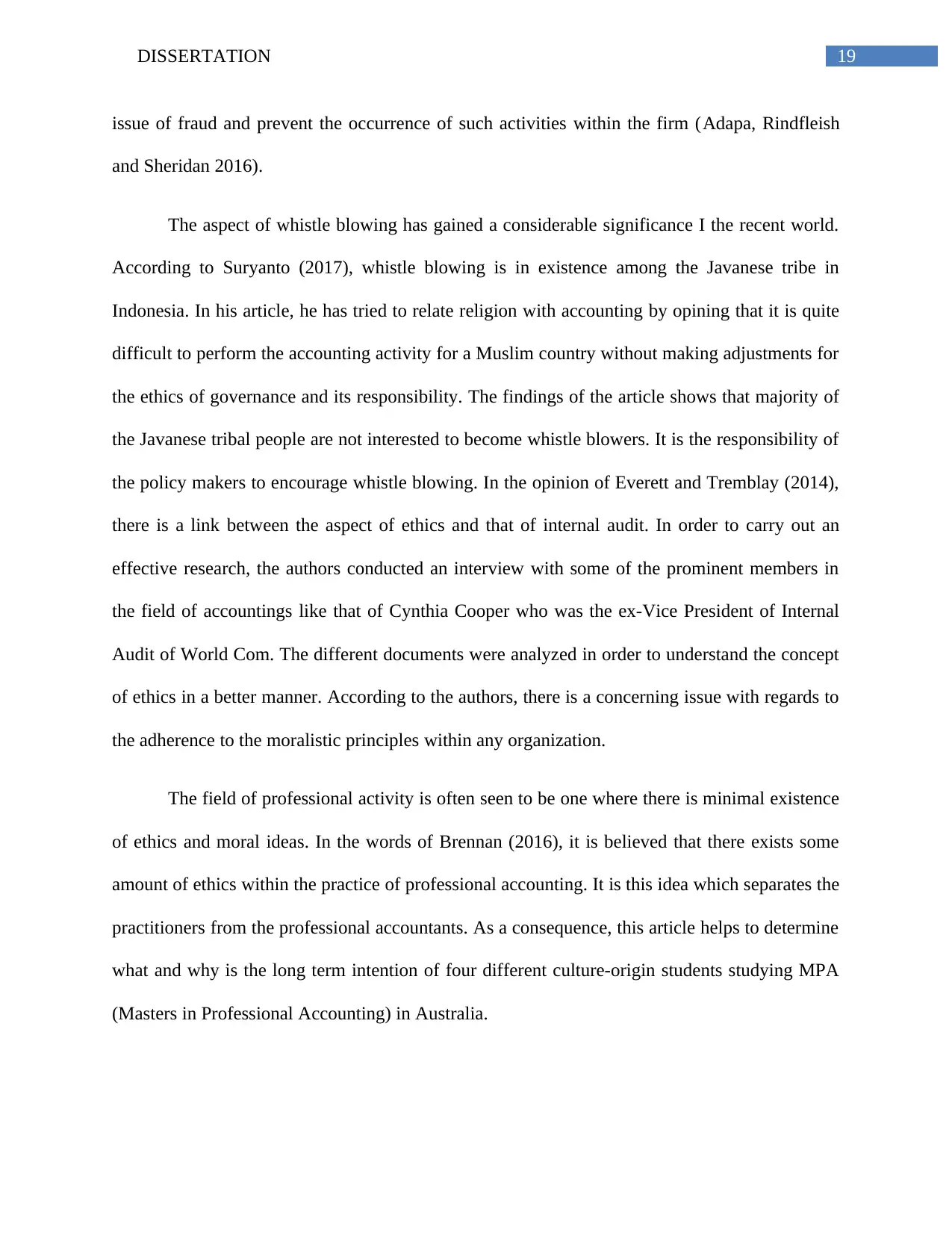
19DISSERTATION
issue of fraud and prevent the occurrence of such activities within the firm (Adapa, Rindfleish
and Sheridan 2016).
The aspect of whistle blowing has gained a considerable significance I the recent world.
According to Suryanto (2017), whistle blowing is in existence among the Javanese tribe in
Indonesia. In his article, he has tried to relate religion with accounting by opining that it is quite
difficult to perform the accounting activity for a Muslim country without making adjustments for
the ethics of governance and its responsibility. The findings of the article shows that majority of
the Javanese tribal people are not interested to become whistle blowers. It is the responsibility of
the policy makers to encourage whistle blowing. In the opinion of Everett and Tremblay (2014),
there is a link between the aspect of ethics and that of internal audit. In order to carry out an
effective research, the authors conducted an interview with some of the prominent members in
the field of accountings like that of Cynthia Cooper who was the ex-Vice President of Internal
Audit of World Com. The different documents were analyzed in order to understand the concept
of ethics in a better manner. According to the authors, there is a concerning issue with regards to
the adherence to the moralistic principles within any organization.
The field of professional activity is often seen to be one where there is minimal existence
of ethics and moral ideas. In the words of Brennan (2016), it is believed that there exists some
amount of ethics within the practice of professional accounting. It is this idea which separates the
practitioners from the professional accountants. As a consequence, this article helps to determine
what and why is the long term intention of four different culture-origin students studying MPA
(Masters in Professional Accounting) in Australia.
issue of fraud and prevent the occurrence of such activities within the firm (Adapa, Rindfleish
and Sheridan 2016).
The aspect of whistle blowing has gained a considerable significance I the recent world.
According to Suryanto (2017), whistle blowing is in existence among the Javanese tribe in
Indonesia. In his article, he has tried to relate religion with accounting by opining that it is quite
difficult to perform the accounting activity for a Muslim country without making adjustments for
the ethics of governance and its responsibility. The findings of the article shows that majority of
the Javanese tribal people are not interested to become whistle blowers. It is the responsibility of
the policy makers to encourage whistle blowing. In the opinion of Everett and Tremblay (2014),
there is a link between the aspect of ethics and that of internal audit. In order to carry out an
effective research, the authors conducted an interview with some of the prominent members in
the field of accountings like that of Cynthia Cooper who was the ex-Vice President of Internal
Audit of World Com. The different documents were analyzed in order to understand the concept
of ethics in a better manner. According to the authors, there is a concerning issue with regards to
the adherence to the moralistic principles within any organization.
The field of professional activity is often seen to be one where there is minimal existence
of ethics and moral ideas. In the words of Brennan (2016), it is believed that there exists some
amount of ethics within the practice of professional accounting. It is this idea which separates the
practitioners from the professional accountants. As a consequence, this article helps to determine
what and why is the long term intention of four different culture-origin students studying MPA
(Masters in Professional Accounting) in Australia.
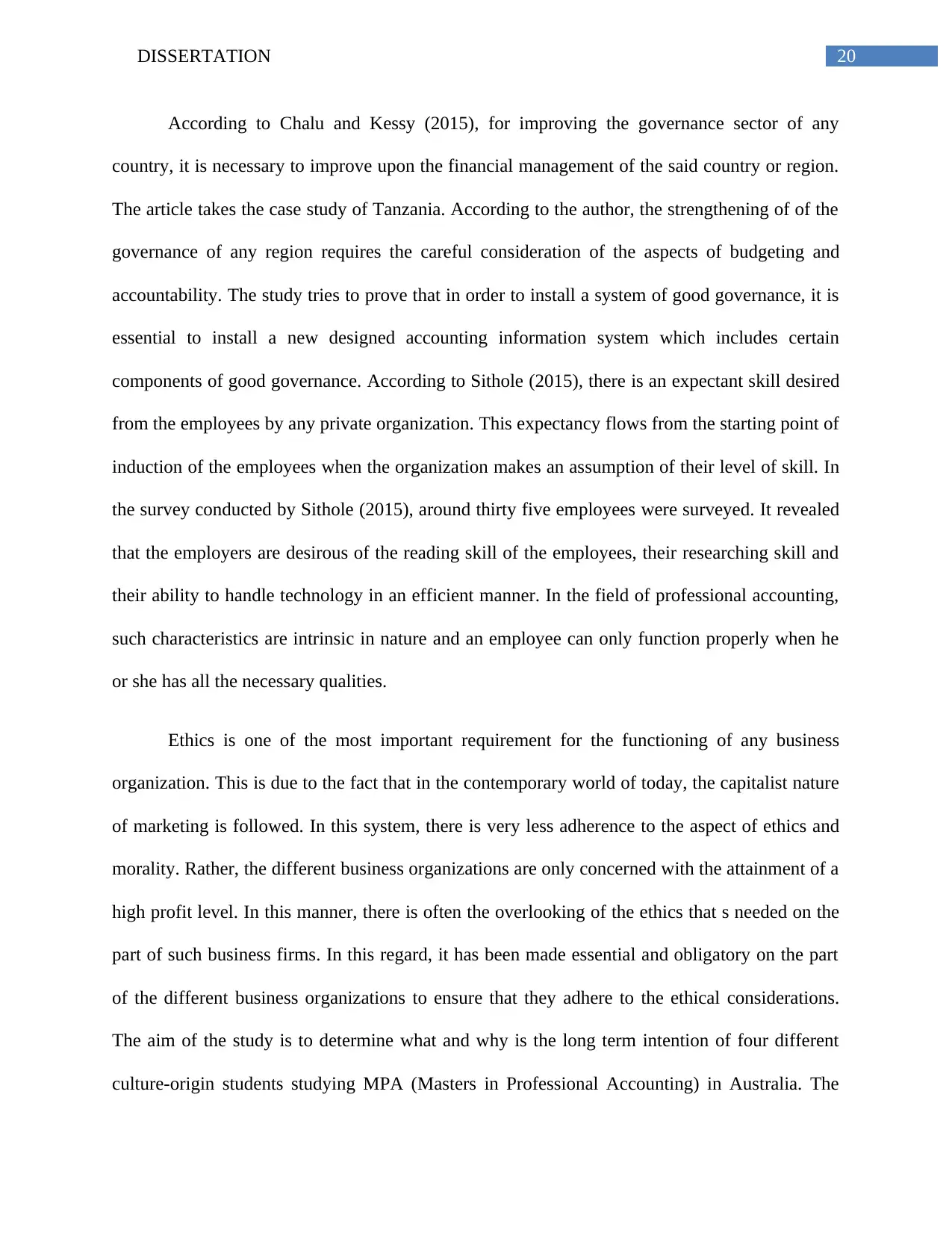
20DISSERTATION
According to Chalu and Kessy (2015), for improving the governance sector of any
country, it is necessary to improve upon the financial management of the said country or region.
The article takes the case study of Tanzania. According to the author, the strengthening of of the
governance of any region requires the careful consideration of the aspects of budgeting and
accountability. The study tries to prove that in order to install a system of good governance, it is
essential to install a new designed accounting information system which includes certain
components of good governance. According to Sithole (2015), there is an expectant skill desired
from the employees by any private organization. This expectancy flows from the starting point of
induction of the employees when the organization makes an assumption of their level of skill. In
the survey conducted by Sithole (2015), around thirty five employees were surveyed. It revealed
that the employers are desirous of the reading skill of the employees, their researching skill and
their ability to handle technology in an efficient manner. In the field of professional accounting,
such characteristics are intrinsic in nature and an employee can only function properly when he
or she has all the necessary qualities.
Ethics is one of the most important requirement for the functioning of any business
organization. This is due to the fact that in the contemporary world of today, the capitalist nature
of marketing is followed. In this system, there is very less adherence to the aspect of ethics and
morality. Rather, the different business organizations are only concerned with the attainment of a
high profit level. In this manner, there is often the overlooking of the ethics that s needed on the
part of such business firms. In this regard, it has been made essential and obligatory on the part
of the different business organizations to ensure that they adhere to the ethical considerations.
The aim of the study is to determine what and why is the long term intention of four different
culture-origin students studying MPA (Masters in Professional Accounting) in Australia. The
According to Chalu and Kessy (2015), for improving the governance sector of any
country, it is necessary to improve upon the financial management of the said country or region.
The article takes the case study of Tanzania. According to the author, the strengthening of of the
governance of any region requires the careful consideration of the aspects of budgeting and
accountability. The study tries to prove that in order to install a system of good governance, it is
essential to install a new designed accounting information system which includes certain
components of good governance. According to Sithole (2015), there is an expectant skill desired
from the employees by any private organization. This expectancy flows from the starting point of
induction of the employees when the organization makes an assumption of their level of skill. In
the survey conducted by Sithole (2015), around thirty five employees were surveyed. It revealed
that the employers are desirous of the reading skill of the employees, their researching skill and
their ability to handle technology in an efficient manner. In the field of professional accounting,
such characteristics are intrinsic in nature and an employee can only function properly when he
or she has all the necessary qualities.
Ethics is one of the most important requirement for the functioning of any business
organization. This is due to the fact that in the contemporary world of today, the capitalist nature
of marketing is followed. In this system, there is very less adherence to the aspect of ethics and
morality. Rather, the different business organizations are only concerned with the attainment of a
high profit level. In this manner, there is often the overlooking of the ethics that s needed on the
part of such business firms. In this regard, it has been made essential and obligatory on the part
of the different business organizations to ensure that they adhere to the ethical considerations.
The aim of the study is to determine what and why is the long term intention of four different
culture-origin students studying MPA (Masters in Professional Accounting) in Australia. The
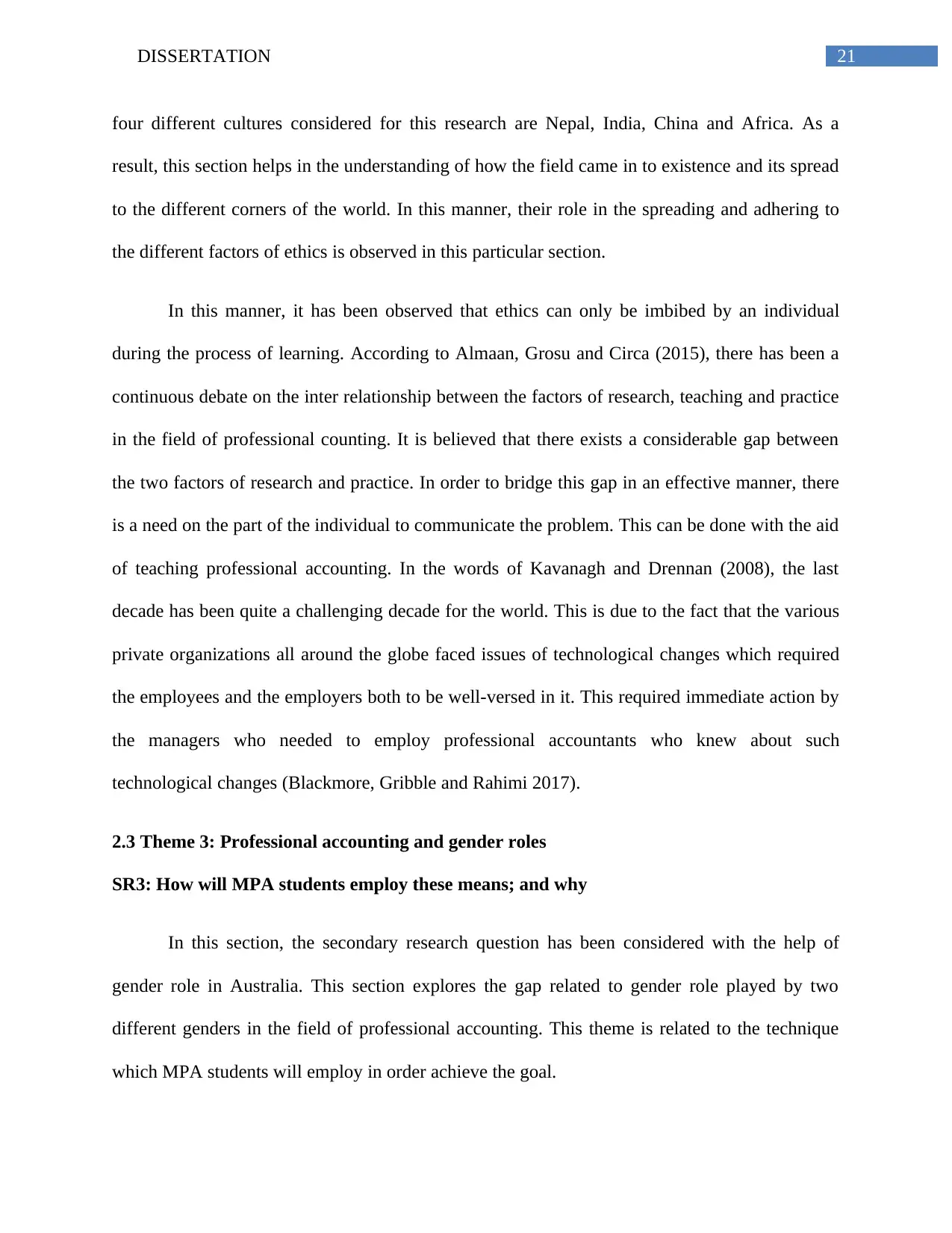
21DISSERTATION
four different cultures considered for this research are Nepal, India, China and Africa. As a
result, this section helps in the understanding of how the field came in to existence and its spread
to the different corners of the world. In this manner, their role in the spreading and adhering to
the different factors of ethics is observed in this particular section.
In this manner, it has been observed that ethics can only be imbibed by an individual
during the process of learning. According to Almaan, Grosu and Circa (2015), there has been a
continuous debate on the inter relationship between the factors of research, teaching and practice
in the field of professional counting. It is believed that there exists a considerable gap between
the two factors of research and practice. In order to bridge this gap in an effective manner, there
is a need on the part of the individual to communicate the problem. This can be done with the aid
of teaching professional accounting. In the words of Kavanagh and Drennan (2008), the last
decade has been quite a challenging decade for the world. This is due to the fact that the various
private organizations all around the globe faced issues of technological changes which required
the employees and the employers both to be well-versed in it. This required immediate action by
the managers who needed to employ professional accountants who knew about such
technological changes (Blackmore, Gribble and Rahimi 2017).
2.3 Theme 3: Professional accounting and gender roles
SR3: How will MPA students employ these means; and why
In this section, the secondary research question has been considered with the help of
gender role in Australia. This section explores the gap related to gender role played by two
different genders in the field of professional accounting. This theme is related to the technique
which MPA students will employ in order achieve the goal.
four different cultures considered for this research are Nepal, India, China and Africa. As a
result, this section helps in the understanding of how the field came in to existence and its spread
to the different corners of the world. In this manner, their role in the spreading and adhering to
the different factors of ethics is observed in this particular section.
In this manner, it has been observed that ethics can only be imbibed by an individual
during the process of learning. According to Almaan, Grosu and Circa (2015), there has been a
continuous debate on the inter relationship between the factors of research, teaching and practice
in the field of professional counting. It is believed that there exists a considerable gap between
the two factors of research and practice. In order to bridge this gap in an effective manner, there
is a need on the part of the individual to communicate the problem. This can be done with the aid
of teaching professional accounting. In the words of Kavanagh and Drennan (2008), the last
decade has been quite a challenging decade for the world. This is due to the fact that the various
private organizations all around the globe faced issues of technological changes which required
the employees and the employers both to be well-versed in it. This required immediate action by
the managers who needed to employ professional accountants who knew about such
technological changes (Blackmore, Gribble and Rahimi 2017).
2.3 Theme 3: Professional accounting and gender roles
SR3: How will MPA students employ these means; and why
In this section, the secondary research question has been considered with the help of
gender role in Australia. This section explores the gap related to gender role played by two
different genders in the field of professional accounting. This theme is related to the technique
which MPA students will employ in order achieve the goal.
Secure Best Marks with AI Grader
Need help grading? Try our AI Grader for instant feedback on your assignments.
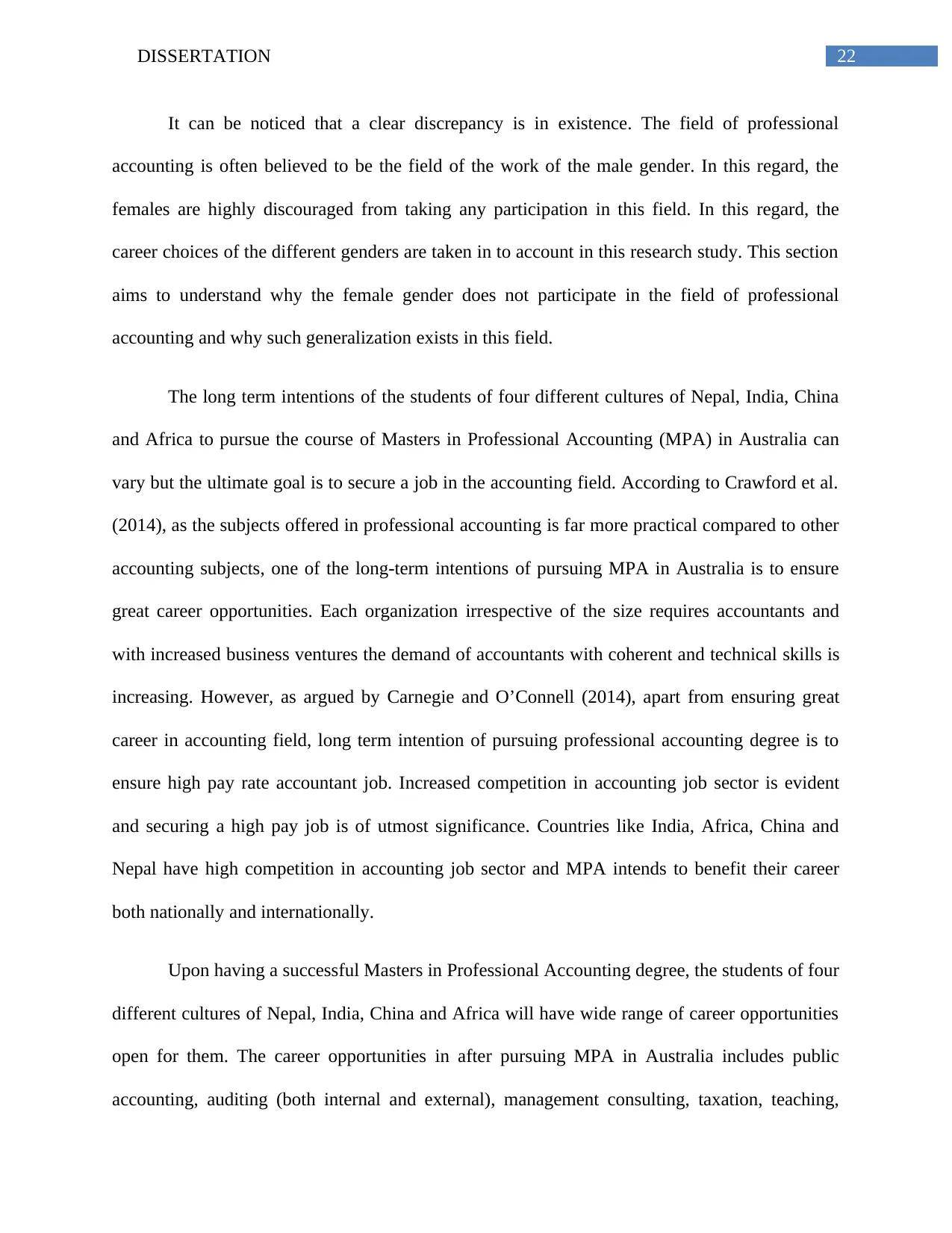
22DISSERTATION
It can be noticed that a clear discrepancy is in existence. The field of professional
accounting is often believed to be the field of the work of the male gender. In this regard, the
females are highly discouraged from taking any participation in this field. In this regard, the
career choices of the different genders are taken in to account in this research study. This section
aims to understand why the female gender does not participate in the field of professional
accounting and why such generalization exists in this field.
The long term intentions of the students of four different cultures of Nepal, India, China
and Africa to pursue the course of Masters in Professional Accounting (MPA) in Australia can
vary but the ultimate goal is to secure a job in the accounting field. According to Crawford et al.
(2014), as the subjects offered in professional accounting is far more practical compared to other
accounting subjects, one of the long-term intentions of pursuing MPA in Australia is to ensure
great career opportunities. Each organization irrespective of the size requires accountants and
with increased business ventures the demand of accountants with coherent and technical skills is
increasing. However, as argued by Carnegie and O’Connell (2014), apart from ensuring great
career in accounting field, long term intention of pursuing professional accounting degree is to
ensure high pay rate accountant job. Increased competition in accounting job sector is evident
and securing a high pay job is of utmost significance. Countries like India, Africa, China and
Nepal have high competition in accounting job sector and MPA intends to benefit their career
both nationally and internationally.
Upon having a successful Masters in Professional Accounting degree, the students of four
different cultures of Nepal, India, China and Africa will have wide range of career opportunities
open for them. The career opportunities in after pursuing MPA in Australia includes public
accounting, auditing (both internal and external), management consulting, taxation, teaching,
It can be noticed that a clear discrepancy is in existence. The field of professional
accounting is often believed to be the field of the work of the male gender. In this regard, the
females are highly discouraged from taking any participation in this field. In this regard, the
career choices of the different genders are taken in to account in this research study. This section
aims to understand why the female gender does not participate in the field of professional
accounting and why such generalization exists in this field.
The long term intentions of the students of four different cultures of Nepal, India, China
and Africa to pursue the course of Masters in Professional Accounting (MPA) in Australia can
vary but the ultimate goal is to secure a job in the accounting field. According to Crawford et al.
(2014), as the subjects offered in professional accounting is far more practical compared to other
accounting subjects, one of the long-term intentions of pursuing MPA in Australia is to ensure
great career opportunities. Each organization irrespective of the size requires accountants and
with increased business ventures the demand of accountants with coherent and technical skills is
increasing. However, as argued by Carnegie and O’Connell (2014), apart from ensuring great
career in accounting field, long term intention of pursuing professional accounting degree is to
ensure high pay rate accountant job. Increased competition in accounting job sector is evident
and securing a high pay job is of utmost significance. Countries like India, Africa, China and
Nepal have high competition in accounting job sector and MPA intends to benefit their career
both nationally and internationally.
Upon having a successful Masters in Professional Accounting degree, the students of four
different cultures of Nepal, India, China and Africa will have wide range of career opportunities
open for them. The career opportunities in after pursuing MPA in Australia includes public
accounting, auditing (both internal and external), management consulting, taxation, teaching,
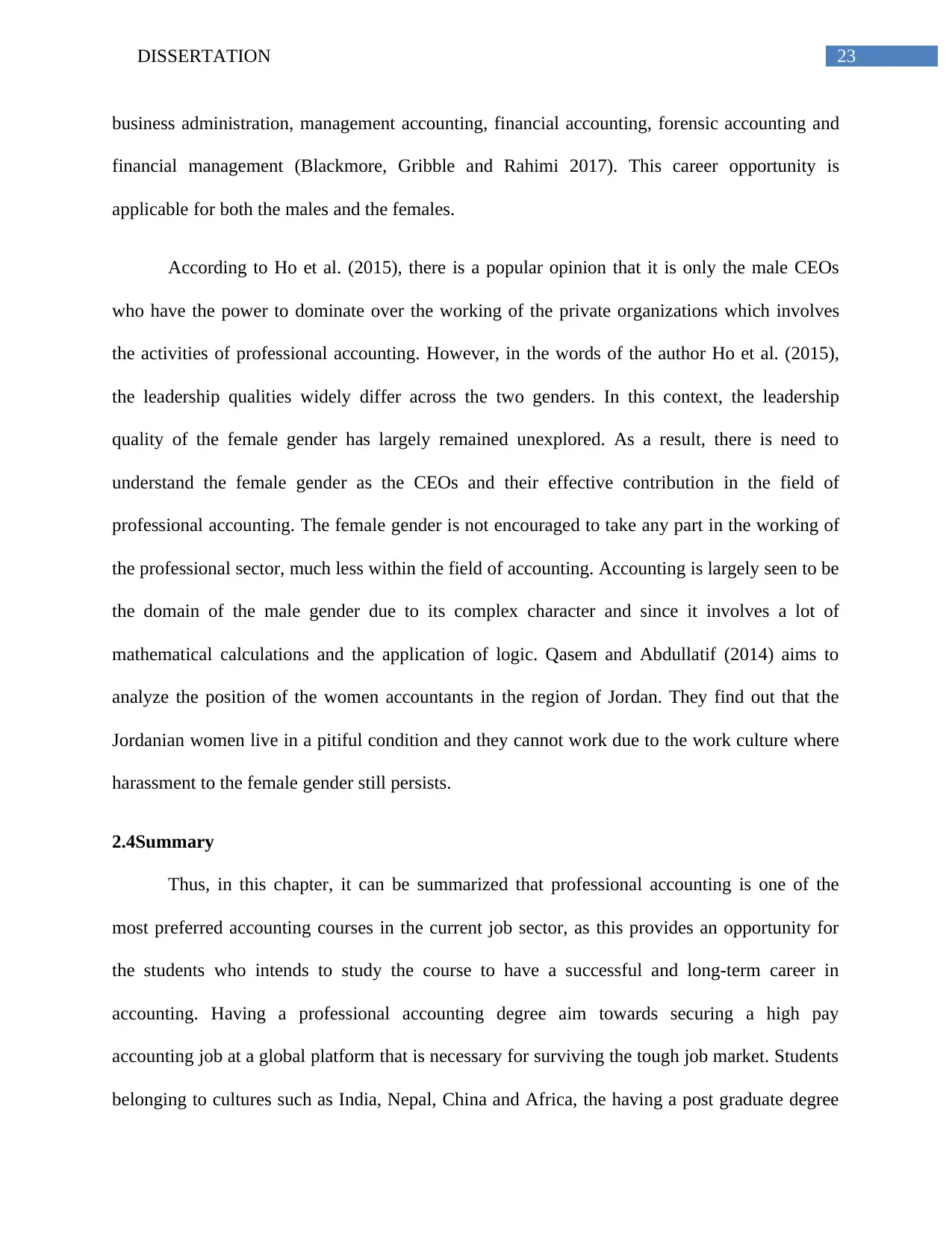
23DISSERTATION
business administration, management accounting, financial accounting, forensic accounting and
financial management (Blackmore, Gribble and Rahimi 2017). This career opportunity is
applicable for both the males and the females.
According to Ho et al. (2015), there is a popular opinion that it is only the male CEOs
who have the power to dominate over the working of the private organizations which involves
the activities of professional accounting. However, in the words of the author Ho et al. (2015),
the leadership qualities widely differ across the two genders. In this context, the leadership
quality of the female gender has largely remained unexplored. As a result, there is need to
understand the female gender as the CEOs and their effective contribution in the field of
professional accounting. The female gender is not encouraged to take any part in the working of
the professional sector, much less within the field of accounting. Accounting is largely seen to be
the domain of the male gender due to its complex character and since it involves a lot of
mathematical calculations and the application of logic. Qasem and Abdullatif (2014) aims to
analyze the position of the women accountants in the region of Jordan. They find out that the
Jordanian women live in a pitiful condition and they cannot work due to the work culture where
harassment to the female gender still persists.
2.4Summary
Thus, in this chapter, it can be summarized that professional accounting is one of the
most preferred accounting courses in the current job sector, as this provides an opportunity for
the students who intends to study the course to have a successful and long-term career in
accounting. Having a professional accounting degree aim towards securing a high pay
accounting job at a global platform that is necessary for surviving the tough job market. Students
belonging to cultures such as India, Nepal, China and Africa, the having a post graduate degree
business administration, management accounting, financial accounting, forensic accounting and
financial management (Blackmore, Gribble and Rahimi 2017). This career opportunity is
applicable for both the males and the females.
According to Ho et al. (2015), there is a popular opinion that it is only the male CEOs
who have the power to dominate over the working of the private organizations which involves
the activities of professional accounting. However, in the words of the author Ho et al. (2015),
the leadership qualities widely differ across the two genders. In this context, the leadership
quality of the female gender has largely remained unexplored. As a result, there is need to
understand the female gender as the CEOs and their effective contribution in the field of
professional accounting. The female gender is not encouraged to take any part in the working of
the professional sector, much less within the field of accounting. Accounting is largely seen to be
the domain of the male gender due to its complex character and since it involves a lot of
mathematical calculations and the application of logic. Qasem and Abdullatif (2014) aims to
analyze the position of the women accountants in the region of Jordan. They find out that the
Jordanian women live in a pitiful condition and they cannot work due to the work culture where
harassment to the female gender still persists.
2.4Summary
Thus, in this chapter, it can be summarized that professional accounting is one of the
most preferred accounting courses in the current job sector, as this provides an opportunity for
the students who intends to study the course to have a successful and long-term career in
accounting. Having a professional accounting degree aim towards securing a high pay
accounting job at a global platform that is necessary for surviving the tough job market. Students
belonging to cultures such as India, Nepal, China and Africa, the having a post graduate degree
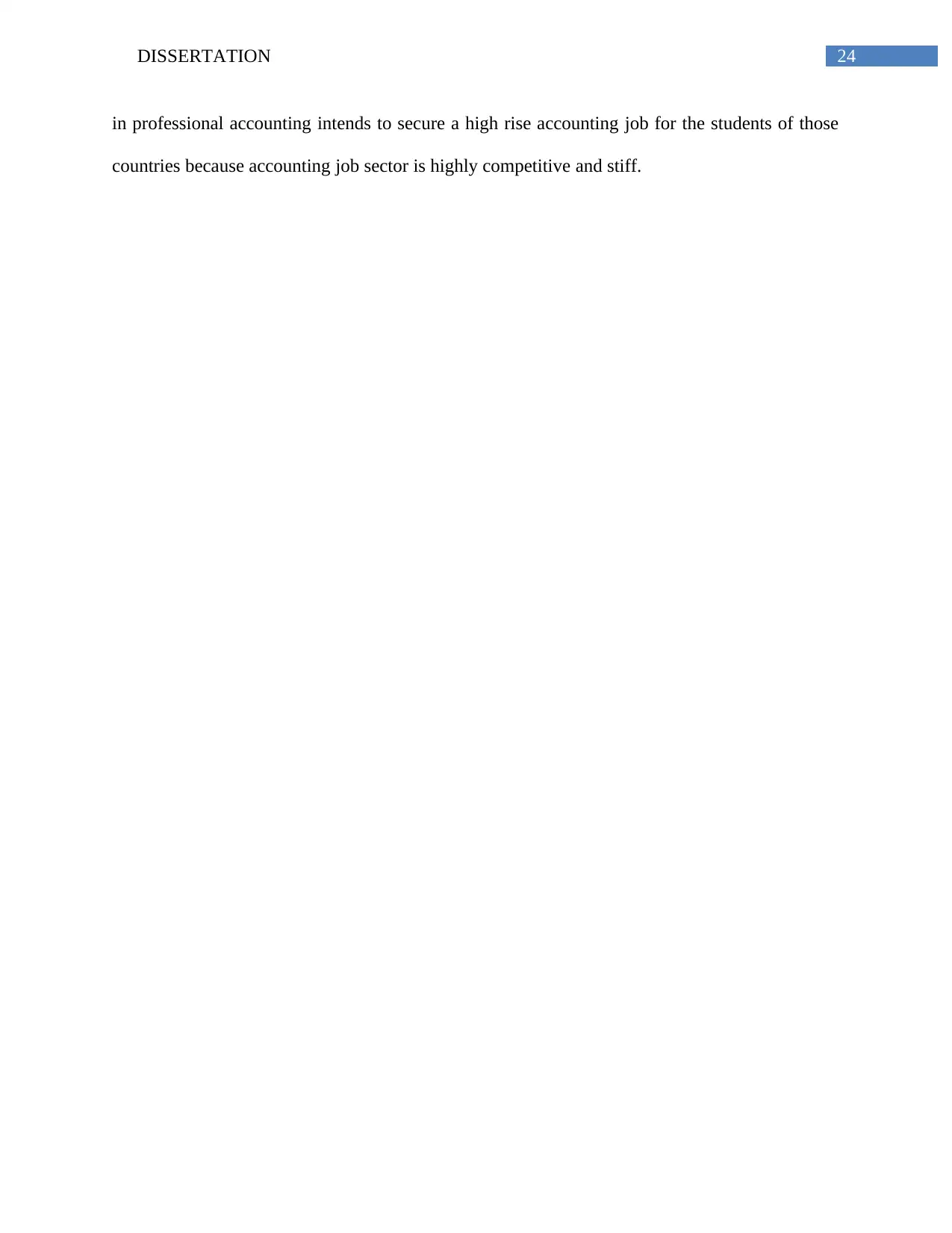
24DISSERTATION
in professional accounting intends to secure a high rise accounting job for the students of those
countries because accounting job sector is highly competitive and stiff.
in professional accounting intends to secure a high rise accounting job for the students of those
countries because accounting job sector is highly competitive and stiff.
Paraphrase This Document
Need a fresh take? Get an instant paraphrase of this document with our AI Paraphraser
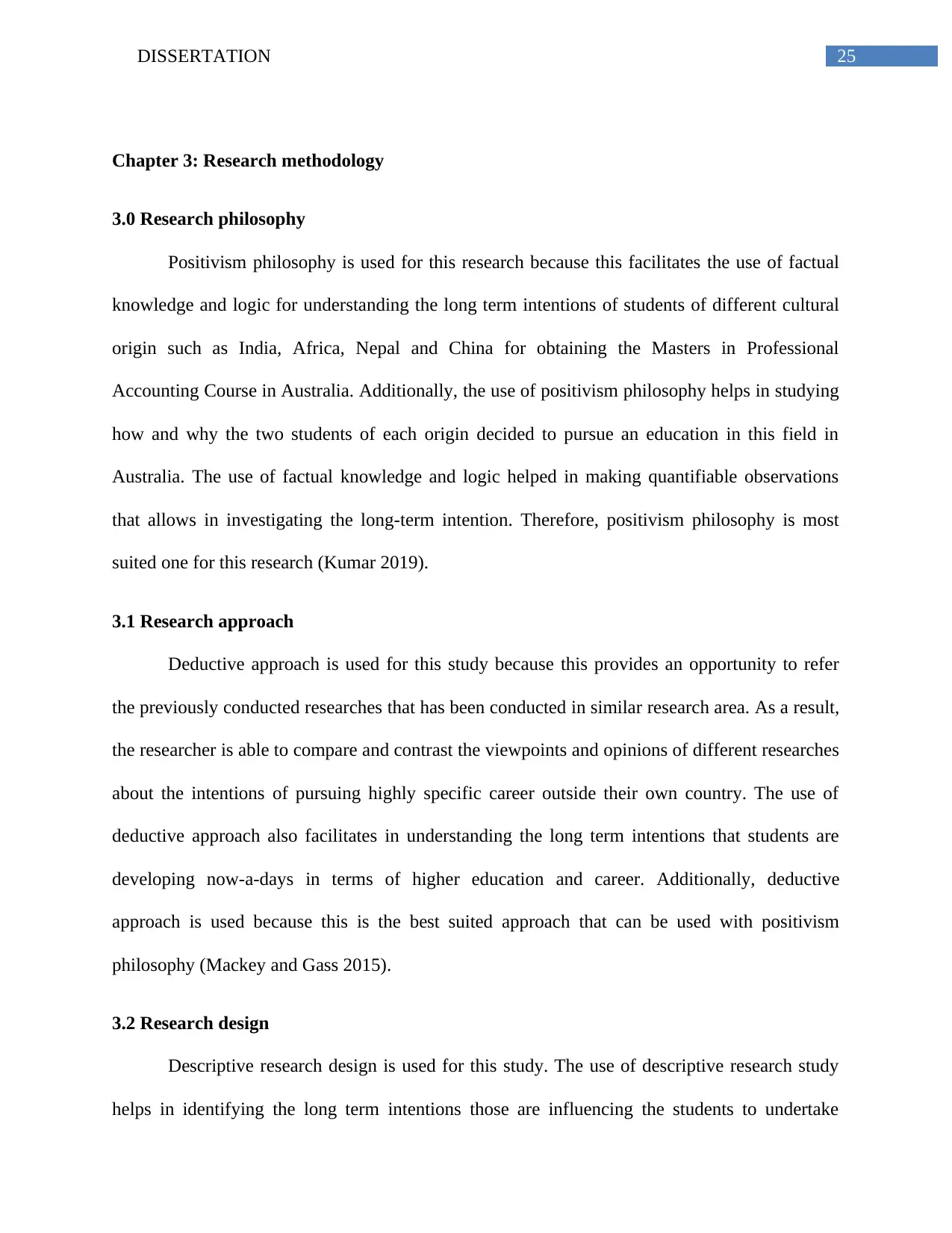
25DISSERTATION
Chapter 3: Research methodology
3.0 Research philosophy
Positivism philosophy is used for this research because this facilitates the use of factual
knowledge and logic for understanding the long term intentions of students of different cultural
origin such as India, Africa, Nepal and China for obtaining the Masters in Professional
Accounting Course in Australia. Additionally, the use of positivism philosophy helps in studying
how and why the two students of each origin decided to pursue an education in this field in
Australia. The use of factual knowledge and logic helped in making quantifiable observations
that allows in investigating the long-term intention. Therefore, positivism philosophy is most
suited one for this research (Kumar 2019).
3.1 Research approach
Deductive approach is used for this study because this provides an opportunity to refer
the previously conducted researches that has been conducted in similar research area. As a result,
the researcher is able to compare and contrast the viewpoints and opinions of different researches
about the intentions of pursuing highly specific career outside their own country. The use of
deductive approach also facilitates in understanding the long term intentions that students are
developing now-a-days in terms of higher education and career. Additionally, deductive
approach is used because this is the best suited approach that can be used with positivism
philosophy (Mackey and Gass 2015).
3.2 Research design
Descriptive research design is used for this study. The use of descriptive research study
helps in identifying the long term intentions those are influencing the students to undertake
Chapter 3: Research methodology
3.0 Research philosophy
Positivism philosophy is used for this research because this facilitates the use of factual
knowledge and logic for understanding the long term intentions of students of different cultural
origin such as India, Africa, Nepal and China for obtaining the Masters in Professional
Accounting Course in Australia. Additionally, the use of positivism philosophy helps in studying
how and why the two students of each origin decided to pursue an education in this field in
Australia. The use of factual knowledge and logic helped in making quantifiable observations
that allows in investigating the long-term intention. Therefore, positivism philosophy is most
suited one for this research (Kumar 2019).
3.1 Research approach
Deductive approach is used for this study because this provides an opportunity to refer
the previously conducted researches that has been conducted in similar research area. As a result,
the researcher is able to compare and contrast the viewpoints and opinions of different researches
about the intentions of pursuing highly specific career outside their own country. The use of
deductive approach also facilitates in understanding the long term intentions that students are
developing now-a-days in terms of higher education and career. Additionally, deductive
approach is used because this is the best suited approach that can be used with positivism
philosophy (Mackey and Gass 2015).
3.2 Research design
Descriptive research design is used for this study. The use of descriptive research study
helps in identifying the long term intentions those are influencing the students to undertake
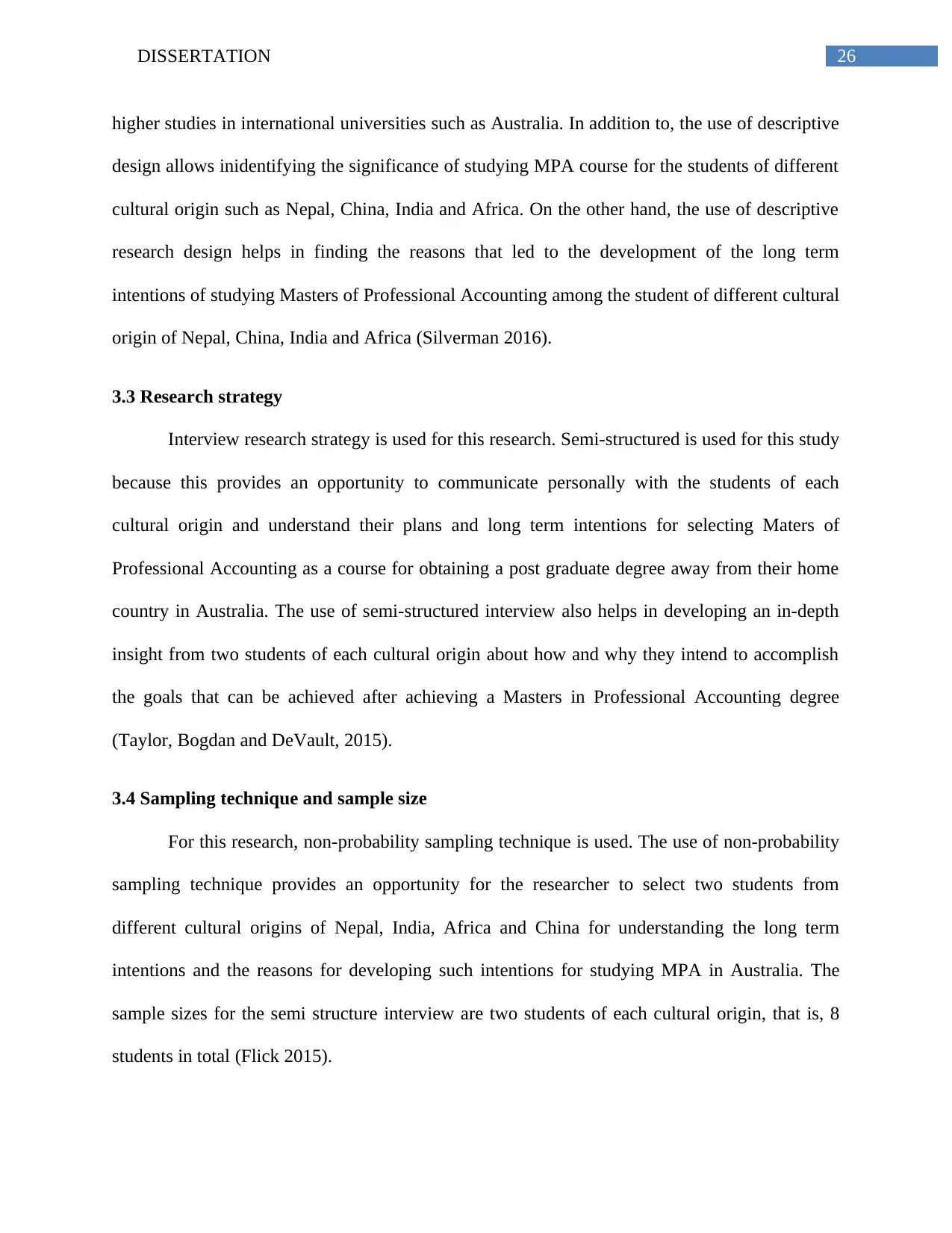
26DISSERTATION
higher studies in international universities such as Australia. In addition to, the use of descriptive
design allows inidentifying the significance of studying MPA course for the students of different
cultural origin such as Nepal, China, India and Africa. On the other hand, the use of descriptive
research design helps in finding the reasons that led to the development of the long term
intentions of studying Masters of Professional Accounting among the student of different cultural
origin of Nepal, China, India and Africa (Silverman 2016).
3.3 Research strategy
Interview research strategy is used for this research. Semi-structured is used for this study
because this provides an opportunity to communicate personally with the students of each
cultural origin and understand their plans and long term intentions for selecting Maters of
Professional Accounting as a course for obtaining a post graduate degree away from their home
country in Australia. The use of semi-structured interview also helps in developing an in-depth
insight from two students of each cultural origin about how and why they intend to accomplish
the goals that can be achieved after achieving a Masters in Professional Accounting degree
(Taylor, Bogdan and DeVault, 2015).
3.4 Sampling technique and sample size
For this research, non-probability sampling technique is used. The use of non-probability
sampling technique provides an opportunity for the researcher to select two students from
different cultural origins of Nepal, India, Africa and China for understanding the long term
intentions and the reasons for developing such intentions for studying MPA in Australia. The
sample sizes for the semi structure interview are two students of each cultural origin, that is, 8
students in total (Flick 2015).
higher studies in international universities such as Australia. In addition to, the use of descriptive
design allows inidentifying the significance of studying MPA course for the students of different
cultural origin such as Nepal, China, India and Africa. On the other hand, the use of descriptive
research design helps in finding the reasons that led to the development of the long term
intentions of studying Masters of Professional Accounting among the student of different cultural
origin of Nepal, China, India and Africa (Silverman 2016).
3.3 Research strategy
Interview research strategy is used for this research. Semi-structured is used for this study
because this provides an opportunity to communicate personally with the students of each
cultural origin and understand their plans and long term intentions for selecting Maters of
Professional Accounting as a course for obtaining a post graduate degree away from their home
country in Australia. The use of semi-structured interview also helps in developing an in-depth
insight from two students of each cultural origin about how and why they intend to accomplish
the goals that can be achieved after achieving a Masters in Professional Accounting degree
(Taylor, Bogdan and DeVault, 2015).
3.4 Sampling technique and sample size
For this research, non-probability sampling technique is used. The use of non-probability
sampling technique provides an opportunity for the researcher to select two students from
different cultural origins of Nepal, India, Africa and China for understanding the long term
intentions and the reasons for developing such intentions for studying MPA in Australia. The
sample sizes for the semi structure interview are two students of each cultural origin, that is, 8
students in total (Flick 2015).
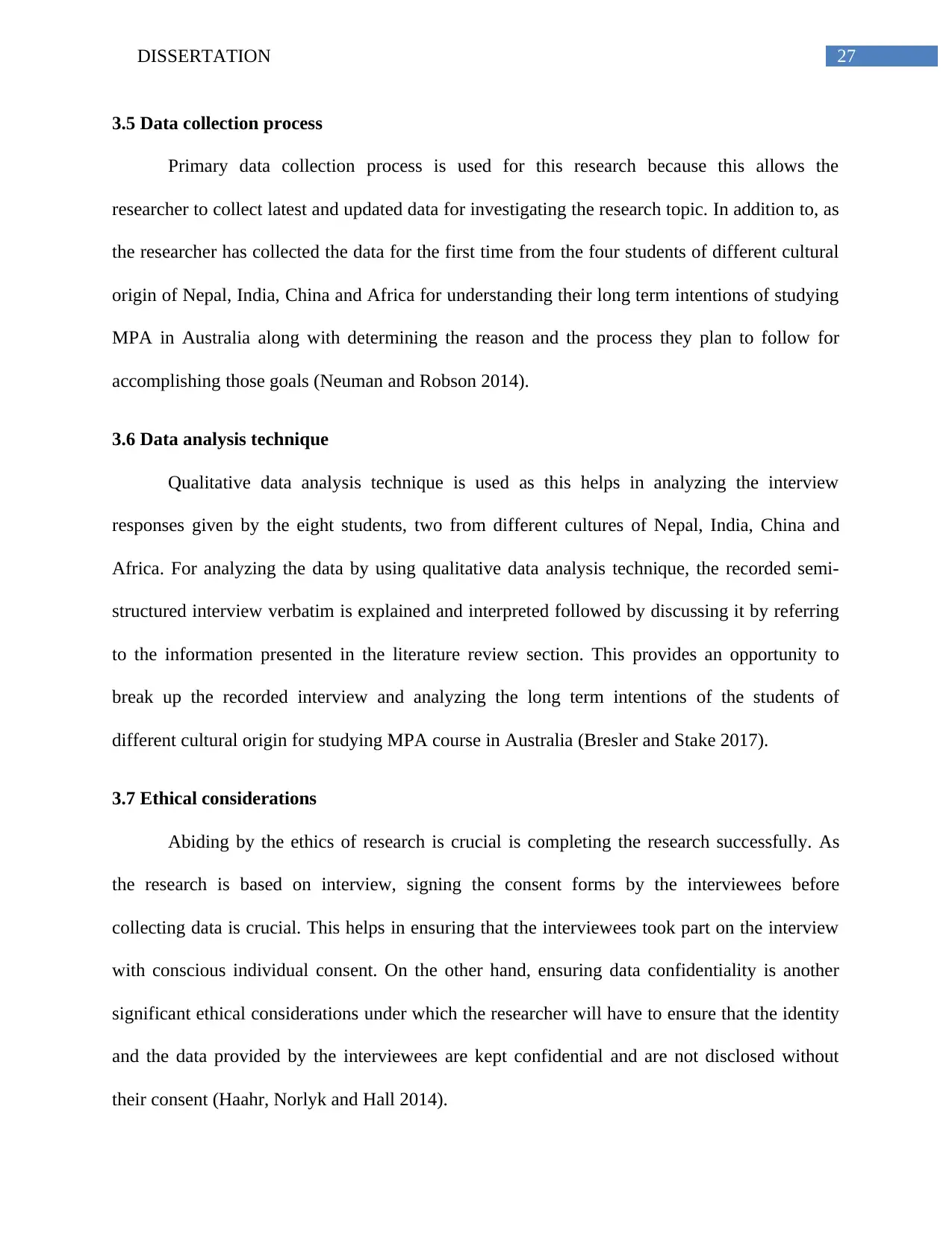
27DISSERTATION
3.5 Data collection process
Primary data collection process is used for this research because this allows the
researcher to collect latest and updated data for investigating the research topic. In addition to, as
the researcher has collected the data for the first time from the four students of different cultural
origin of Nepal, India, China and Africa for understanding their long term intentions of studying
MPA in Australia along with determining the reason and the process they plan to follow for
accomplishing those goals (Neuman and Robson 2014).
3.6 Data analysis technique
Qualitative data analysis technique is used as this helps in analyzing the interview
responses given by the eight students, two from different cultures of Nepal, India, China and
Africa. For analyzing the data by using qualitative data analysis technique, the recorded semi-
structured interview verbatim is explained and interpreted followed by discussing it by referring
to the information presented in the literature review section. This provides an opportunity to
break up the recorded interview and analyzing the long term intentions of the students of
different cultural origin for studying MPA course in Australia (Bresler and Stake 2017).
3.7 Ethical considerations
Abiding by the ethics of research is crucial is completing the research successfully. As
the research is based on interview, signing the consent forms by the interviewees before
collecting data is crucial. This helps in ensuring that the interviewees took part on the interview
with conscious individual consent. On the other hand, ensuring data confidentiality is another
significant ethical considerations under which the researcher will have to ensure that the identity
and the data provided by the interviewees are kept confidential and are not disclosed without
their consent (Haahr, Norlyk and Hall 2014).
3.5 Data collection process
Primary data collection process is used for this research because this allows the
researcher to collect latest and updated data for investigating the research topic. In addition to, as
the researcher has collected the data for the first time from the four students of different cultural
origin of Nepal, India, China and Africa for understanding their long term intentions of studying
MPA in Australia along with determining the reason and the process they plan to follow for
accomplishing those goals (Neuman and Robson 2014).
3.6 Data analysis technique
Qualitative data analysis technique is used as this helps in analyzing the interview
responses given by the eight students, two from different cultures of Nepal, India, China and
Africa. For analyzing the data by using qualitative data analysis technique, the recorded semi-
structured interview verbatim is explained and interpreted followed by discussing it by referring
to the information presented in the literature review section. This provides an opportunity to
break up the recorded interview and analyzing the long term intentions of the students of
different cultural origin for studying MPA course in Australia (Bresler and Stake 2017).
3.7 Ethical considerations
Abiding by the ethics of research is crucial is completing the research successfully. As
the research is based on interview, signing the consent forms by the interviewees before
collecting data is crucial. This helps in ensuring that the interviewees took part on the interview
with conscious individual consent. On the other hand, ensuring data confidentiality is another
significant ethical considerations under which the researcher will have to ensure that the identity
and the data provided by the interviewees are kept confidential and are not disclosed without
their consent (Haahr, Norlyk and Hall 2014).
Secure Best Marks with AI Grader
Need help grading? Try our AI Grader for instant feedback on your assignments.
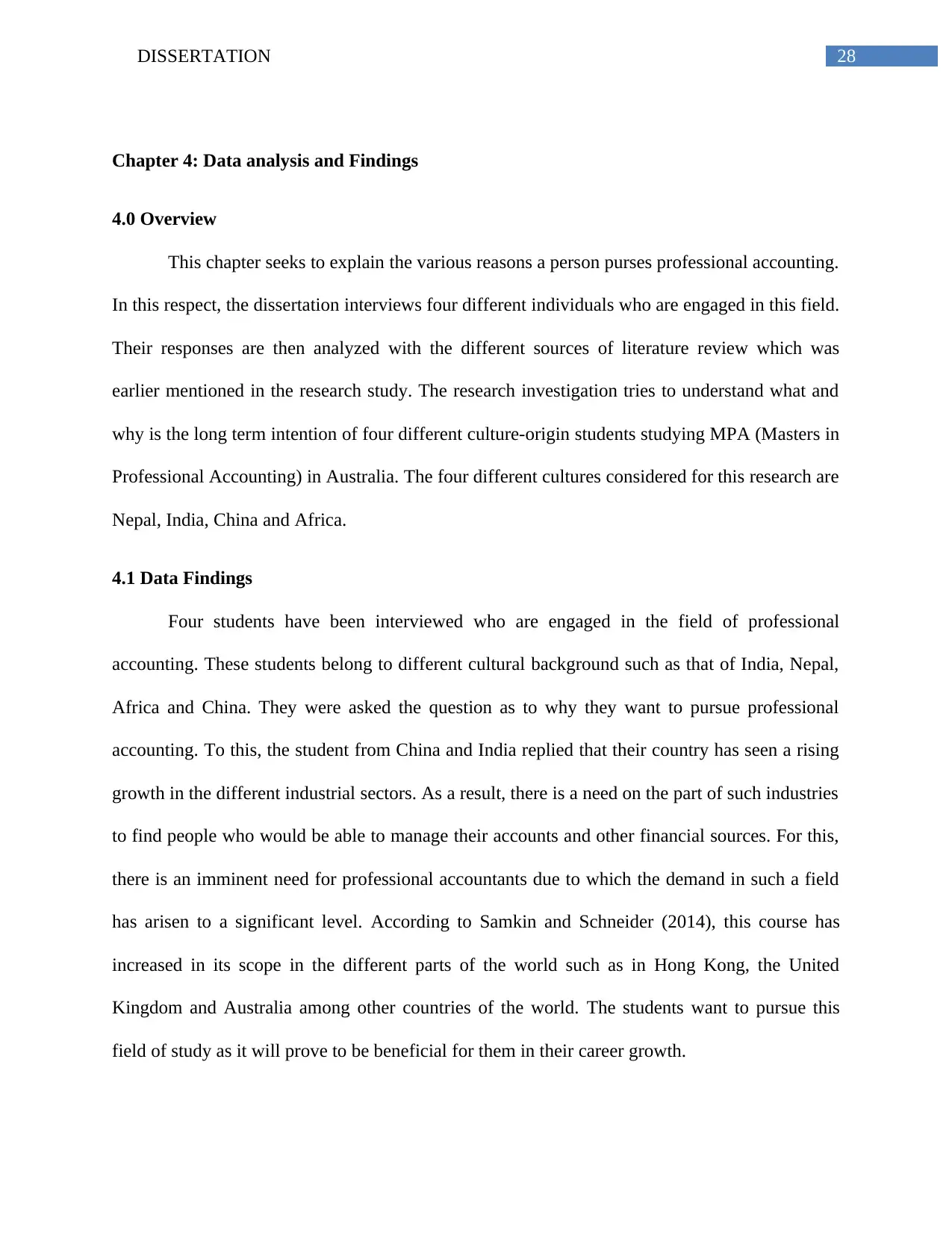
28DISSERTATION
Chapter 4: Data analysis and Findings
4.0 Overview
This chapter seeks to explain the various reasons a person purses professional accounting.
In this respect, the dissertation interviews four different individuals who are engaged in this field.
Their responses are then analyzed with the different sources of literature review which was
earlier mentioned in the research study. The research investigation tries to understand what and
why is the long term intention of four different culture-origin students studying MPA (Masters in
Professional Accounting) in Australia. The four different cultures considered for this research are
Nepal, India, China and Africa.
4.1 Data Findings
Four students have been interviewed who are engaged in the field of professional
accounting. These students belong to different cultural background such as that of India, Nepal,
Africa and China. They were asked the question as to why they want to pursue professional
accounting. To this, the student from China and India replied that their country has seen a rising
growth in the different industrial sectors. As a result, there is a need on the part of such industries
to find people who would be able to manage their accounts and other financial sources. For this,
there is an imminent need for professional accountants due to which the demand in such a field
has arisen to a significant level. According to Samkin and Schneider (2014), this course has
increased in its scope in the different parts of the world such as in Hong Kong, the United
Kingdom and Australia among other countries of the world. The students want to pursue this
field of study as it will prove to be beneficial for them in their career growth.
Chapter 4: Data analysis and Findings
4.0 Overview
This chapter seeks to explain the various reasons a person purses professional accounting.
In this respect, the dissertation interviews four different individuals who are engaged in this field.
Their responses are then analyzed with the different sources of literature review which was
earlier mentioned in the research study. The research investigation tries to understand what and
why is the long term intention of four different culture-origin students studying MPA (Masters in
Professional Accounting) in Australia. The four different cultures considered for this research are
Nepal, India, China and Africa.
4.1 Data Findings
Four students have been interviewed who are engaged in the field of professional
accounting. These students belong to different cultural background such as that of India, Nepal,
Africa and China. They were asked the question as to why they want to pursue professional
accounting. To this, the student from China and India replied that their country has seen a rising
growth in the different industrial sectors. As a result, there is a need on the part of such industries
to find people who would be able to manage their accounts and other financial sources. For this,
there is an imminent need for professional accountants due to which the demand in such a field
has arisen to a significant level. According to Samkin and Schneider (2014), this course has
increased in its scope in the different parts of the world such as in Hong Kong, the United
Kingdom and Australia among other countries of the world. The students want to pursue this
field of study as it will prove to be beneficial for them in their career growth.
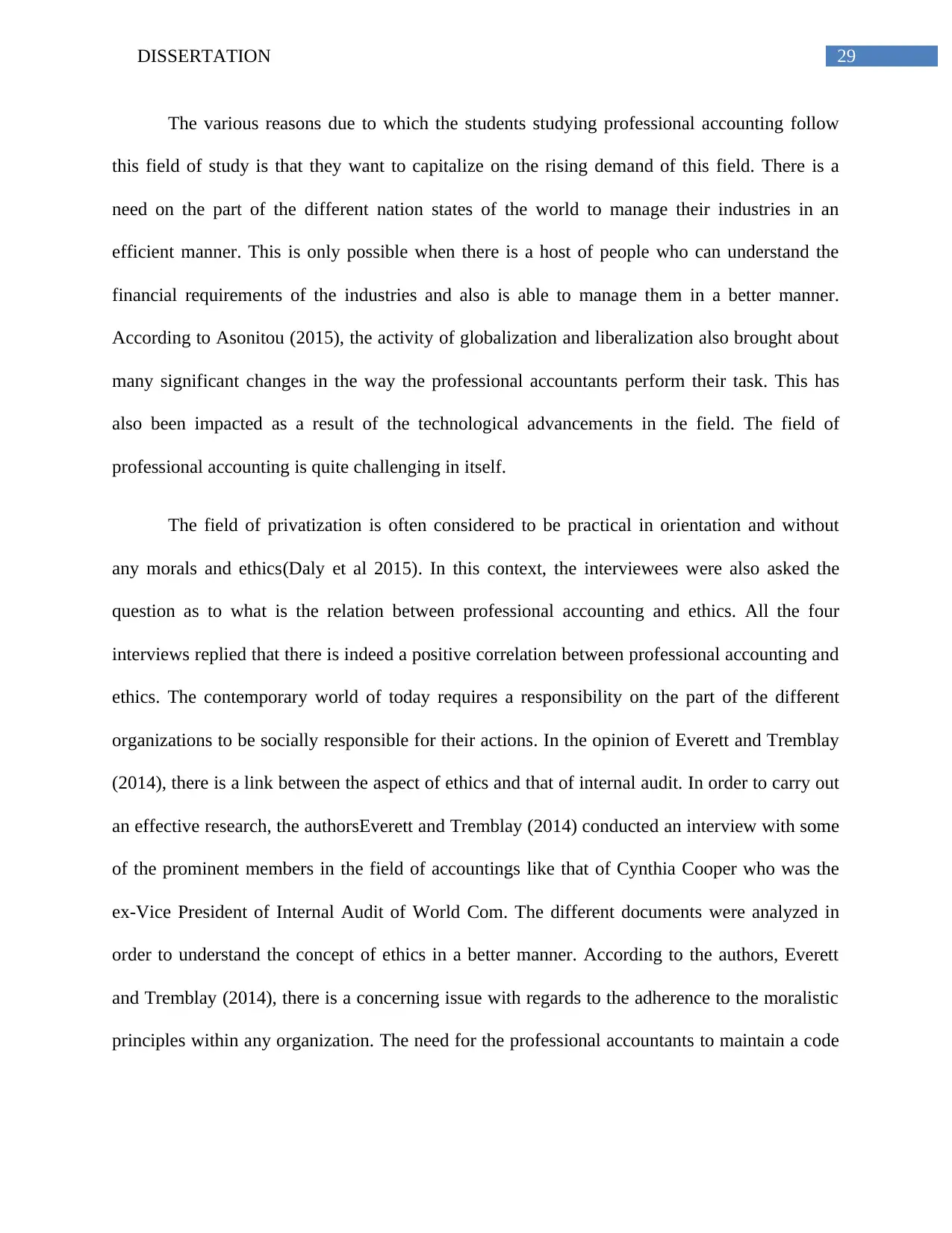
29DISSERTATION
The various reasons due to which the students studying professional accounting follow
this field of study is that they want to capitalize on the rising demand of this field. There is a
need on the part of the different nation states of the world to manage their industries in an
efficient manner. This is only possible when there is a host of people who can understand the
financial requirements of the industries and also is able to manage them in a better manner.
According to Asonitou (2015), the activity of globalization and liberalization also brought about
many significant changes in the way the professional accountants perform their task. This has
also been impacted as a result of the technological advancements in the field. The field of
professional accounting is quite challenging in itself.
The field of privatization is often considered to be practical in orientation and without
any morals and ethics(Daly et al 2015). In this context, the interviewees were also asked the
question as to what is the relation between professional accounting and ethics. All the four
interviews replied that there is indeed a positive correlation between professional accounting and
ethics. The contemporary world of today requires a responsibility on the part of the different
organizations to be socially responsible for their actions. In the opinion of Everett and Tremblay
(2014), there is a link between the aspect of ethics and that of internal audit. In order to carry out
an effective research, the authorsEverett and Tremblay (2014) conducted an interview with some
of the prominent members in the field of accountings like that of Cynthia Cooper who was the
ex-Vice President of Internal Audit of World Com. The different documents were analyzed in
order to understand the concept of ethics in a better manner. According to the authors, Everett
and Tremblay (2014), there is a concerning issue with regards to the adherence to the moralistic
principles within any organization. The need for the professional accountants to maintain a code
The various reasons due to which the students studying professional accounting follow
this field of study is that they want to capitalize on the rising demand of this field. There is a
need on the part of the different nation states of the world to manage their industries in an
efficient manner. This is only possible when there is a host of people who can understand the
financial requirements of the industries and also is able to manage them in a better manner.
According to Asonitou (2015), the activity of globalization and liberalization also brought about
many significant changes in the way the professional accountants perform their task. This has
also been impacted as a result of the technological advancements in the field. The field of
professional accounting is quite challenging in itself.
The field of privatization is often considered to be practical in orientation and without
any morals and ethics(Daly et al 2015). In this context, the interviewees were also asked the
question as to what is the relation between professional accounting and ethics. All the four
interviews replied that there is indeed a positive correlation between professional accounting and
ethics. The contemporary world of today requires a responsibility on the part of the different
organizations to be socially responsible for their actions. In the opinion of Everett and Tremblay
(2014), there is a link between the aspect of ethics and that of internal audit. In order to carry out
an effective research, the authorsEverett and Tremblay (2014) conducted an interview with some
of the prominent members in the field of accountings like that of Cynthia Cooper who was the
ex-Vice President of Internal Audit of World Com. The different documents were analyzed in
order to understand the concept of ethics in a better manner. According to the authors, Everett
and Tremblay (2014), there is a concerning issue with regards to the adherence to the moralistic
principles within any organization. The need for the professional accountants to maintain a code
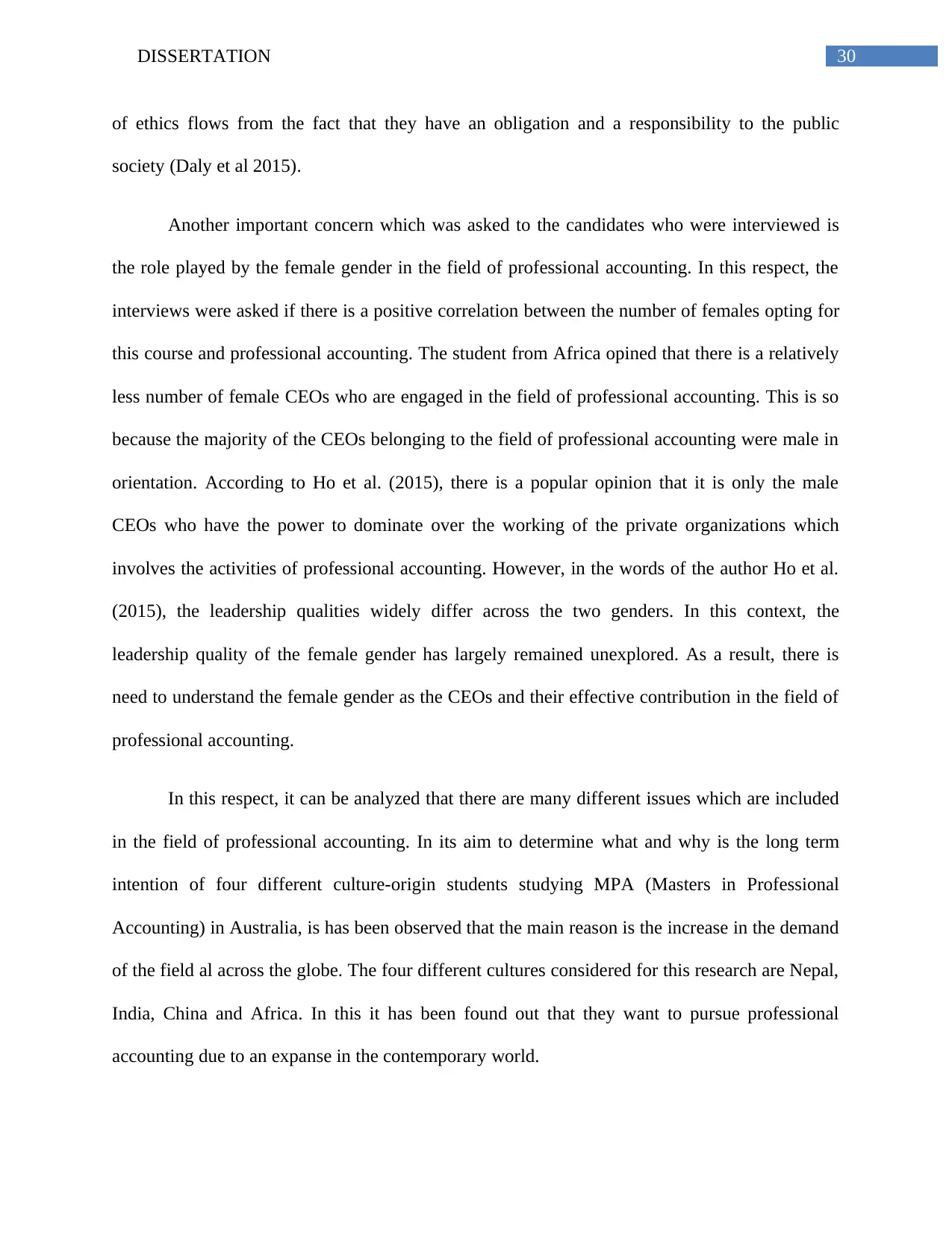
30DISSERTATION
of ethics flows from the fact that they have an obligation and a responsibility to the public
society (Daly et al 2015).
Another important concern which was asked to the candidates who were interviewed is
the role played by the female gender in the field of professional accounting. In this respect, the
interviews were asked if there is a positive correlation between the number of females opting for
this course and professional accounting. The student from Africa opined that there is a relatively
less number of female CEOs who are engaged in the field of professional accounting. This is so
because the majority of the CEOs belonging to the field of professional accounting were male in
orientation. According to Ho et al. (2015), there is a popular opinion that it is only the male
CEOs who have the power to dominate over the working of the private organizations which
involves the activities of professional accounting. However, in the words of the author Ho et al.
(2015), the leadership qualities widely differ across the two genders. In this context, the
leadership quality of the female gender has largely remained unexplored. As a result, there is
need to understand the female gender as the CEOs and their effective contribution in the field of
professional accounting.
In this respect, it can be analyzed that there are many different issues which are included
in the field of professional accounting. In its aim to determine what and why is the long term
intention of four different culture-origin students studying MPA (Masters in Professional
Accounting) in Australia, is has been observed that the main reason is the increase in the demand
of the field al across the globe. The four different cultures considered for this research are Nepal,
India, China and Africa. In this it has been found out that they want to pursue professional
accounting due to an expanse in the contemporary world.
of ethics flows from the fact that they have an obligation and a responsibility to the public
society (Daly et al 2015).
Another important concern which was asked to the candidates who were interviewed is
the role played by the female gender in the field of professional accounting. In this respect, the
interviews were asked if there is a positive correlation between the number of females opting for
this course and professional accounting. The student from Africa opined that there is a relatively
less number of female CEOs who are engaged in the field of professional accounting. This is so
because the majority of the CEOs belonging to the field of professional accounting were male in
orientation. According to Ho et al. (2015), there is a popular opinion that it is only the male
CEOs who have the power to dominate over the working of the private organizations which
involves the activities of professional accounting. However, in the words of the author Ho et al.
(2015), the leadership qualities widely differ across the two genders. In this context, the
leadership quality of the female gender has largely remained unexplored. As a result, there is
need to understand the female gender as the CEOs and their effective contribution in the field of
professional accounting.
In this respect, it can be analyzed that there are many different issues which are included
in the field of professional accounting. In its aim to determine what and why is the long term
intention of four different culture-origin students studying MPA (Masters in Professional
Accounting) in Australia, is has been observed that the main reason is the increase in the demand
of the field al across the globe. The four different cultures considered for this research are Nepal,
India, China and Africa. In this it has been found out that they want to pursue professional
accounting due to an expanse in the contemporary world.
Paraphrase This Document
Need a fresh take? Get an instant paraphrase of this document with our AI Paraphraser
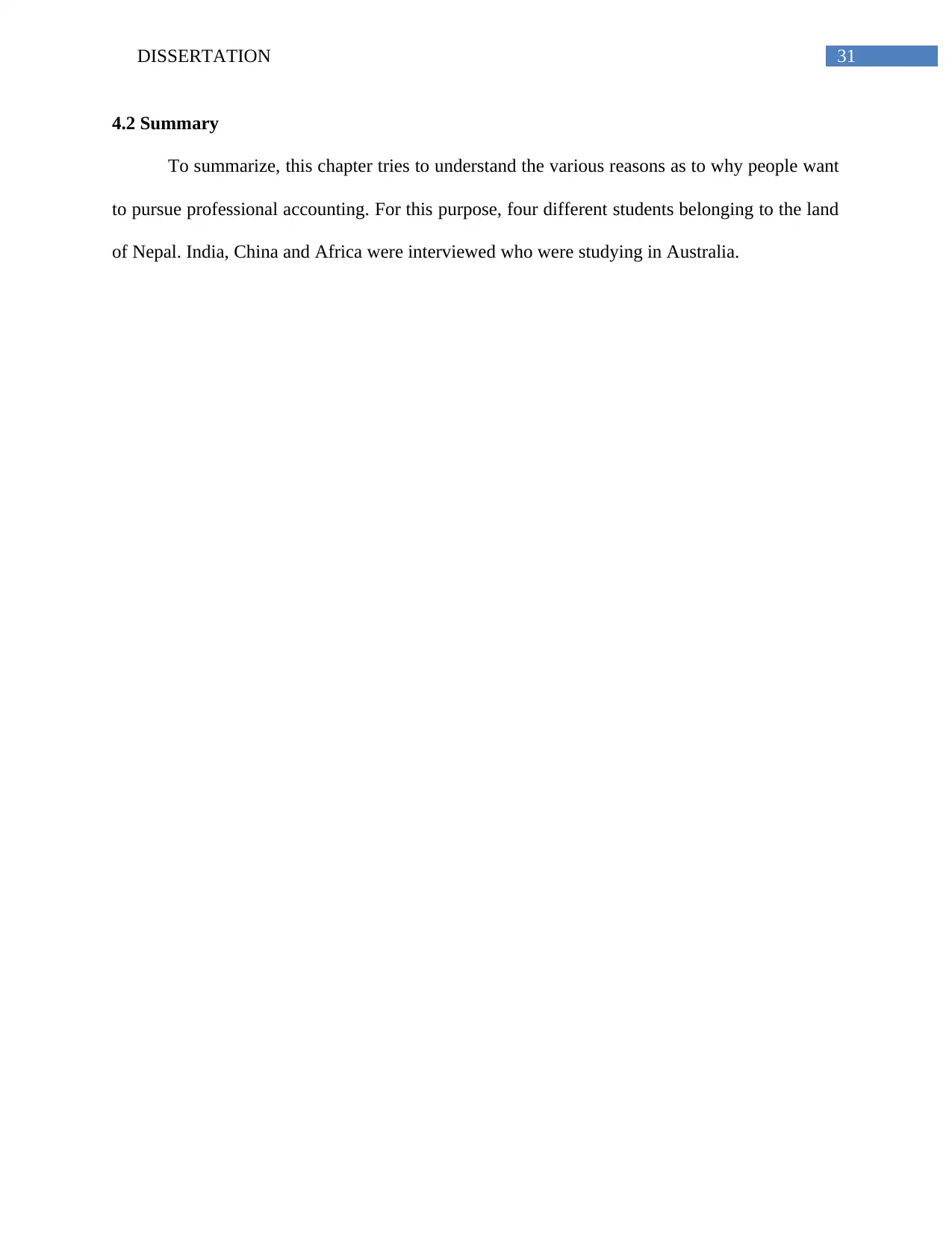
31DISSERTATION
4.2 Summary
To summarize, this chapter tries to understand the various reasons as to why people want
to pursue professional accounting. For this purpose, four different students belonging to the land
of Nepal. India, China and Africa were interviewed who were studying in Australia.
4.2 Summary
To summarize, this chapter tries to understand the various reasons as to why people want
to pursue professional accounting. For this purpose, four different students belonging to the land
of Nepal. India, China and Africa were interviewed who were studying in Australia.
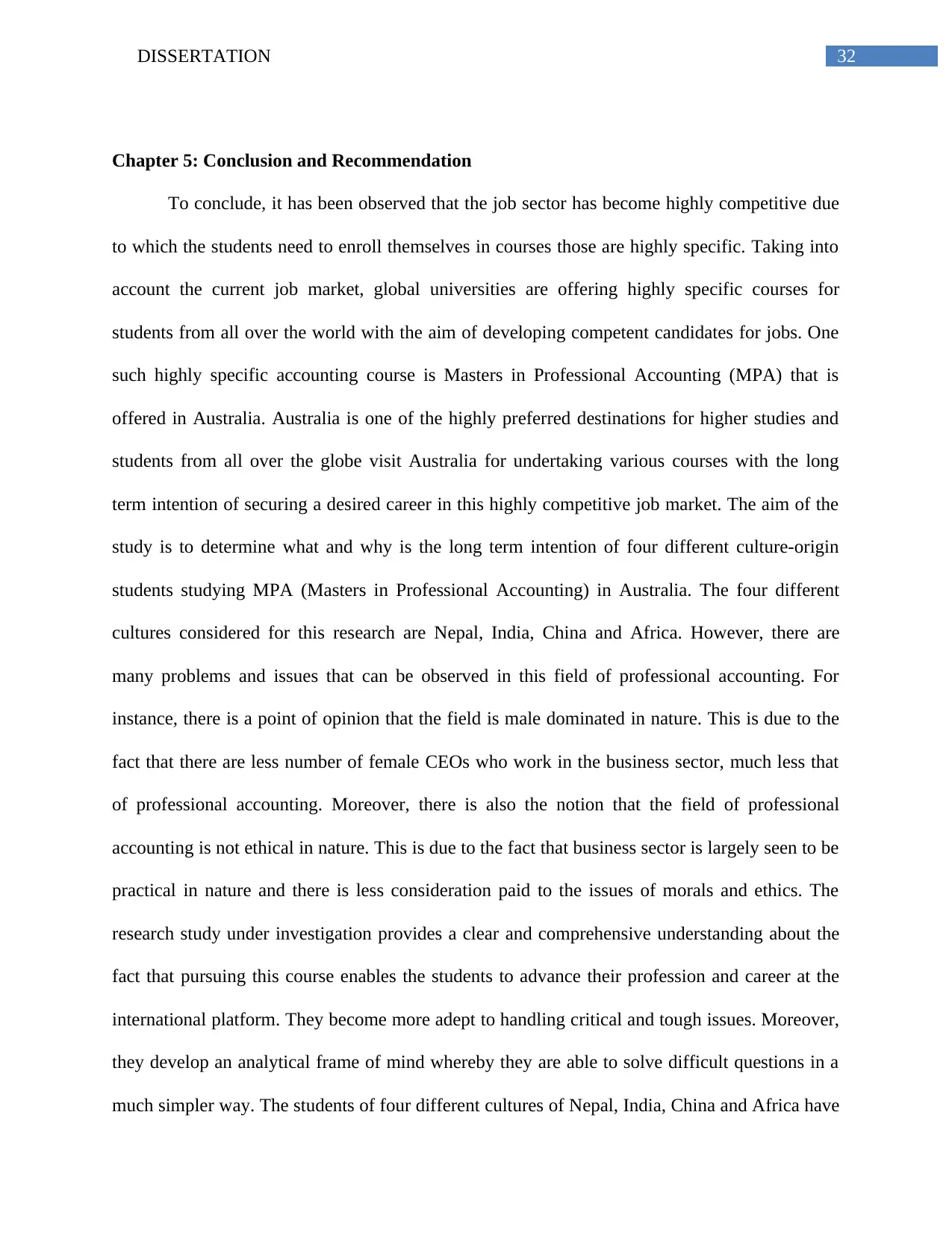
32DISSERTATION
Chapter 5: Conclusion and Recommendation
To conclude, it has been observed that the job sector has become highly competitive due
to which the students need to enroll themselves in courses those are highly specific. Taking into
account the current job market, global universities are offering highly specific courses for
students from all over the world with the aim of developing competent candidates for jobs. One
such highly specific accounting course is Masters in Professional Accounting (MPA) that is
offered in Australia. Australia is one of the highly preferred destinations for higher studies and
students from all over the globe visit Australia for undertaking various courses with the long
term intention of securing a desired career in this highly competitive job market. The aim of the
study is to determine what and why is the long term intention of four different culture-origin
students studying MPA (Masters in Professional Accounting) in Australia. The four different
cultures considered for this research are Nepal, India, China and Africa. However, there are
many problems and issues that can be observed in this field of professional accounting. For
instance, there is a point of opinion that the field is male dominated in nature. This is due to the
fact that there are less number of female CEOs who work in the business sector, much less that
of professional accounting. Moreover, there is also the notion that the field of professional
accounting is not ethical in nature. This is due to the fact that business sector is largely seen to be
practical in nature and there is less consideration paid to the issues of morals and ethics. The
research study under investigation provides a clear and comprehensive understanding about the
fact that pursuing this course enables the students to advance their profession and career at the
international platform. They become more adept to handling critical and tough issues. Moreover,
they develop an analytical frame of mind whereby they are able to solve difficult questions in a
much simpler way. The students of four different cultures of Nepal, India, China and Africa have
Chapter 5: Conclusion and Recommendation
To conclude, it has been observed that the job sector has become highly competitive due
to which the students need to enroll themselves in courses those are highly specific. Taking into
account the current job market, global universities are offering highly specific courses for
students from all over the world with the aim of developing competent candidates for jobs. One
such highly specific accounting course is Masters in Professional Accounting (MPA) that is
offered in Australia. Australia is one of the highly preferred destinations for higher studies and
students from all over the globe visit Australia for undertaking various courses with the long
term intention of securing a desired career in this highly competitive job market. The aim of the
study is to determine what and why is the long term intention of four different culture-origin
students studying MPA (Masters in Professional Accounting) in Australia. The four different
cultures considered for this research are Nepal, India, China and Africa. However, there are
many problems and issues that can be observed in this field of professional accounting. For
instance, there is a point of opinion that the field is male dominated in nature. This is due to the
fact that there are less number of female CEOs who work in the business sector, much less that
of professional accounting. Moreover, there is also the notion that the field of professional
accounting is not ethical in nature. This is due to the fact that business sector is largely seen to be
practical in nature and there is less consideration paid to the issues of morals and ethics. The
research study under investigation provides a clear and comprehensive understanding about the
fact that pursuing this course enables the students to advance their profession and career at the
international platform. They become more adept to handling critical and tough issues. Moreover,
they develop an analytical frame of mind whereby they are able to solve difficult questions in a
much simpler way. The students of four different cultures of Nepal, India, China and Africa have
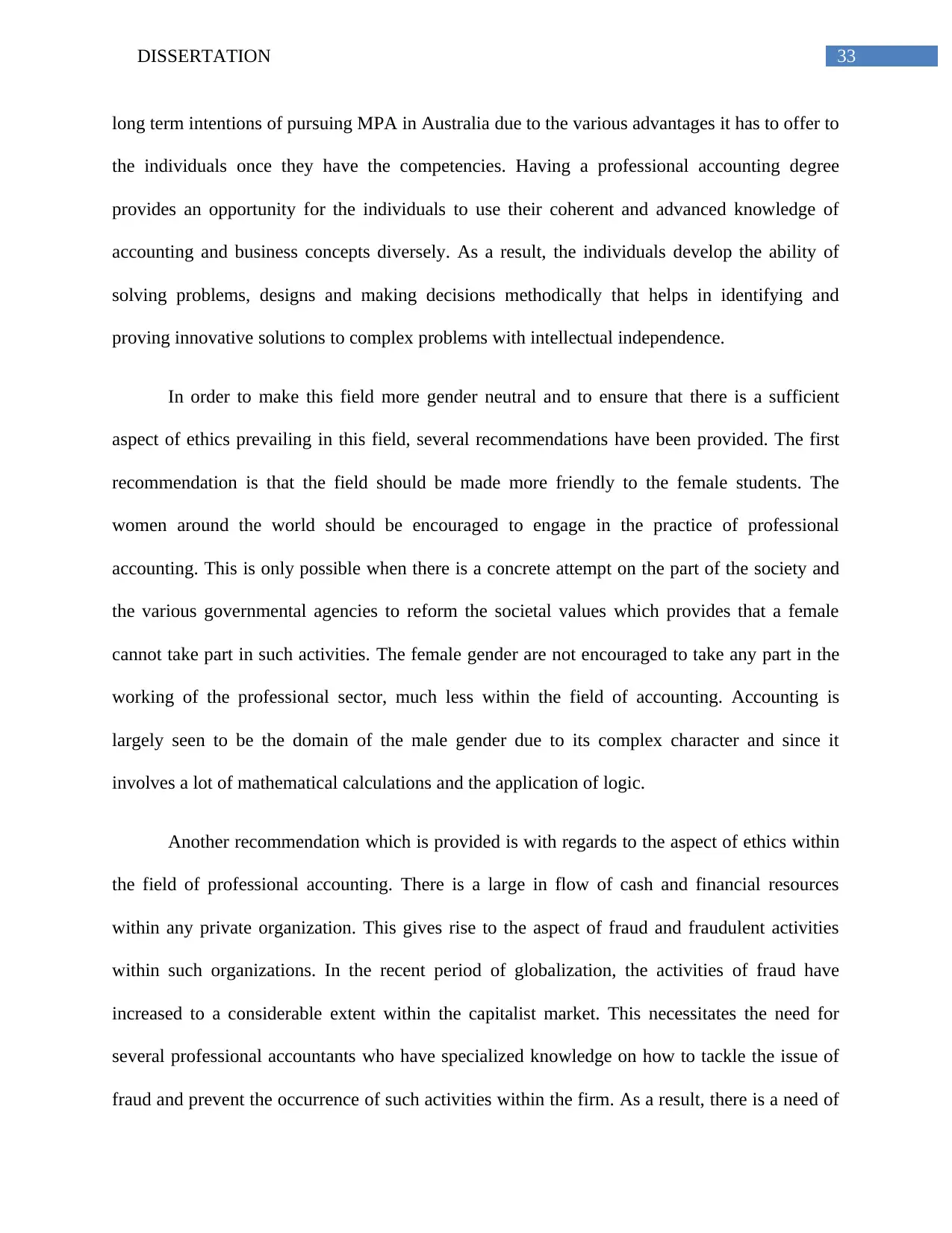
33DISSERTATION
long term intentions of pursuing MPA in Australia due to the various advantages it has to offer to
the individuals once they have the competencies. Having a professional accounting degree
provides an opportunity for the individuals to use their coherent and advanced knowledge of
accounting and business concepts diversely. As a result, the individuals develop the ability of
solving problems, designs and making decisions methodically that helps in identifying and
proving innovative solutions to complex problems with intellectual independence.
In order to make this field more gender neutral and to ensure that there is a sufficient
aspect of ethics prevailing in this field, several recommendations have been provided. The first
recommendation is that the field should be made more friendly to the female students. The
women around the world should be encouraged to engage in the practice of professional
accounting. This is only possible when there is a concrete attempt on the part of the society and
the various governmental agencies to reform the societal values which provides that a female
cannot take part in such activities. The female gender are not encouraged to take any part in the
working of the professional sector, much less within the field of accounting. Accounting is
largely seen to be the domain of the male gender due to its complex character and since it
involves a lot of mathematical calculations and the application of logic.
Another recommendation which is provided is with regards to the aspect of ethics within
the field of professional accounting. There is a large in flow of cash and financial resources
within any private organization. This gives rise to the aspect of fraud and fraudulent activities
within such organizations. In the recent period of globalization, the activities of fraud have
increased to a considerable extent within the capitalist market. This necessitates the need for
several professional accountants who have specialized knowledge on how to tackle the issue of
fraud and prevent the occurrence of such activities within the firm. As a result, there is a need of
long term intentions of pursuing MPA in Australia due to the various advantages it has to offer to
the individuals once they have the competencies. Having a professional accounting degree
provides an opportunity for the individuals to use their coherent and advanced knowledge of
accounting and business concepts diversely. As a result, the individuals develop the ability of
solving problems, designs and making decisions methodically that helps in identifying and
proving innovative solutions to complex problems with intellectual independence.
In order to make this field more gender neutral and to ensure that there is a sufficient
aspect of ethics prevailing in this field, several recommendations have been provided. The first
recommendation is that the field should be made more friendly to the female students. The
women around the world should be encouraged to engage in the practice of professional
accounting. This is only possible when there is a concrete attempt on the part of the society and
the various governmental agencies to reform the societal values which provides that a female
cannot take part in such activities. The female gender are not encouraged to take any part in the
working of the professional sector, much less within the field of accounting. Accounting is
largely seen to be the domain of the male gender due to its complex character and since it
involves a lot of mathematical calculations and the application of logic.
Another recommendation which is provided is with regards to the aspect of ethics within
the field of professional accounting. There is a large in flow of cash and financial resources
within any private organization. This gives rise to the aspect of fraud and fraudulent activities
within such organizations. In the recent period of globalization, the activities of fraud have
increased to a considerable extent within the capitalist market. This necessitates the need for
several professional accountants who have specialized knowledge on how to tackle the issue of
fraud and prevent the occurrence of such activities within the firm. As a result, there is a need of
Secure Best Marks with AI Grader
Need help grading? Try our AI Grader for instant feedback on your assignments.
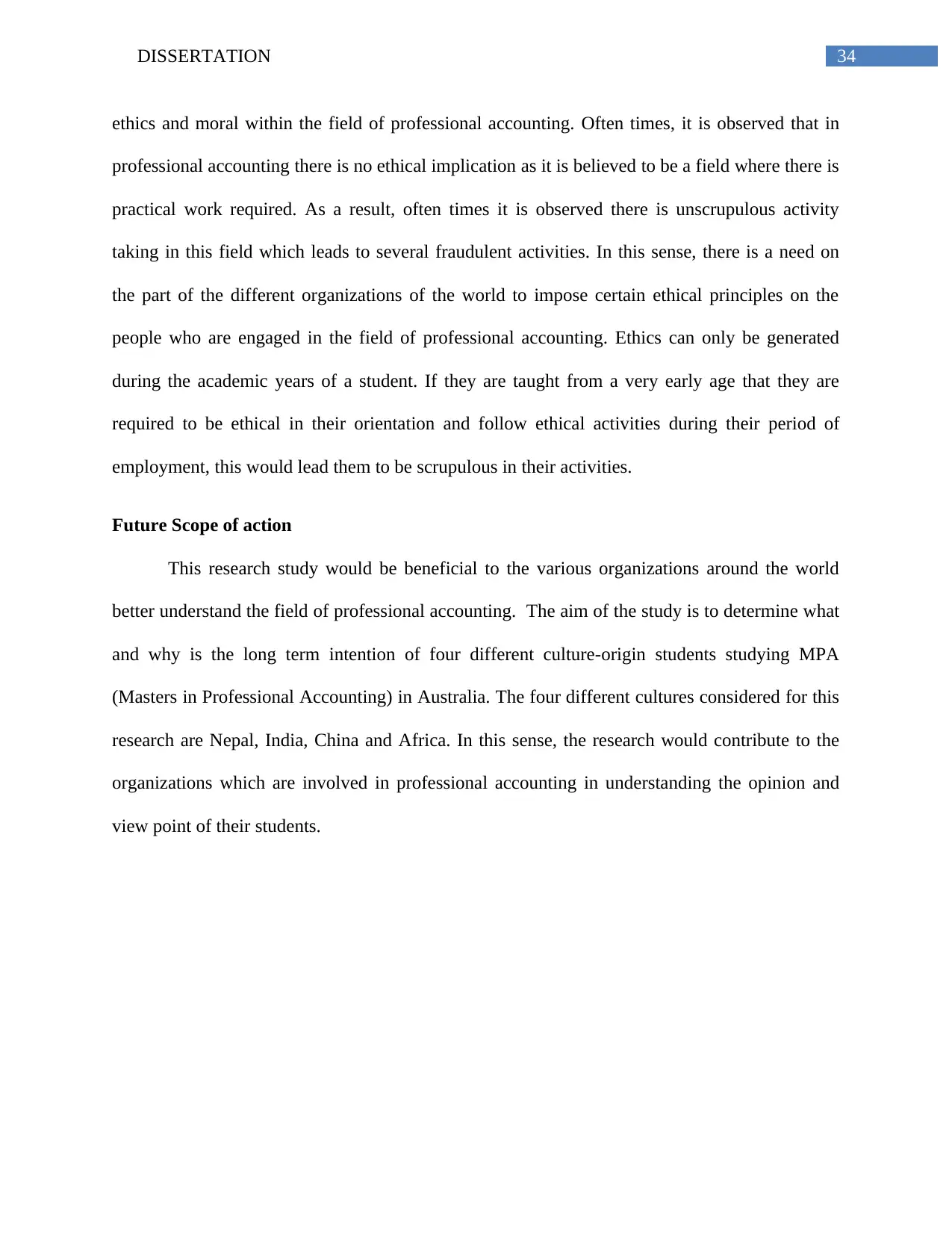
34DISSERTATION
ethics and moral within the field of professional accounting. Often times, it is observed that in
professional accounting there is no ethical implication as it is believed to be a field where there is
practical work required. As a result, often times it is observed there is unscrupulous activity
taking in this field which leads to several fraudulent activities. In this sense, there is a need on
the part of the different organizations of the world to impose certain ethical principles on the
people who are engaged in the field of professional accounting. Ethics can only be generated
during the academic years of a student. If they are taught from a very early age that they are
required to be ethical in their orientation and follow ethical activities during their period of
employment, this would lead them to be scrupulous in their activities.
Future Scope of action
This research study would be beneficial to the various organizations around the world
better understand the field of professional accounting. The aim of the study is to determine what
and why is the long term intention of four different culture-origin students studying MPA
(Masters in Professional Accounting) in Australia. The four different cultures considered for this
research are Nepal, India, China and Africa. In this sense, the research would contribute to the
organizations which are involved in professional accounting in understanding the opinion and
view point of their students.
ethics and moral within the field of professional accounting. Often times, it is observed that in
professional accounting there is no ethical implication as it is believed to be a field where there is
practical work required. As a result, often times it is observed there is unscrupulous activity
taking in this field which leads to several fraudulent activities. In this sense, there is a need on
the part of the different organizations of the world to impose certain ethical principles on the
people who are engaged in the field of professional accounting. Ethics can only be generated
during the academic years of a student. If they are taught from a very early age that they are
required to be ethical in their orientation and follow ethical activities during their period of
employment, this would lead them to be scrupulous in their activities.
Future Scope of action
This research study would be beneficial to the various organizations around the world
better understand the field of professional accounting. The aim of the study is to determine what
and why is the long term intention of four different culture-origin students studying MPA
(Masters in Professional Accounting) in Australia. The four different cultures considered for this
research are Nepal, India, China and Africa. In this sense, the research would contribute to the
organizations which are involved in professional accounting in understanding the opinion and
view point of their students.
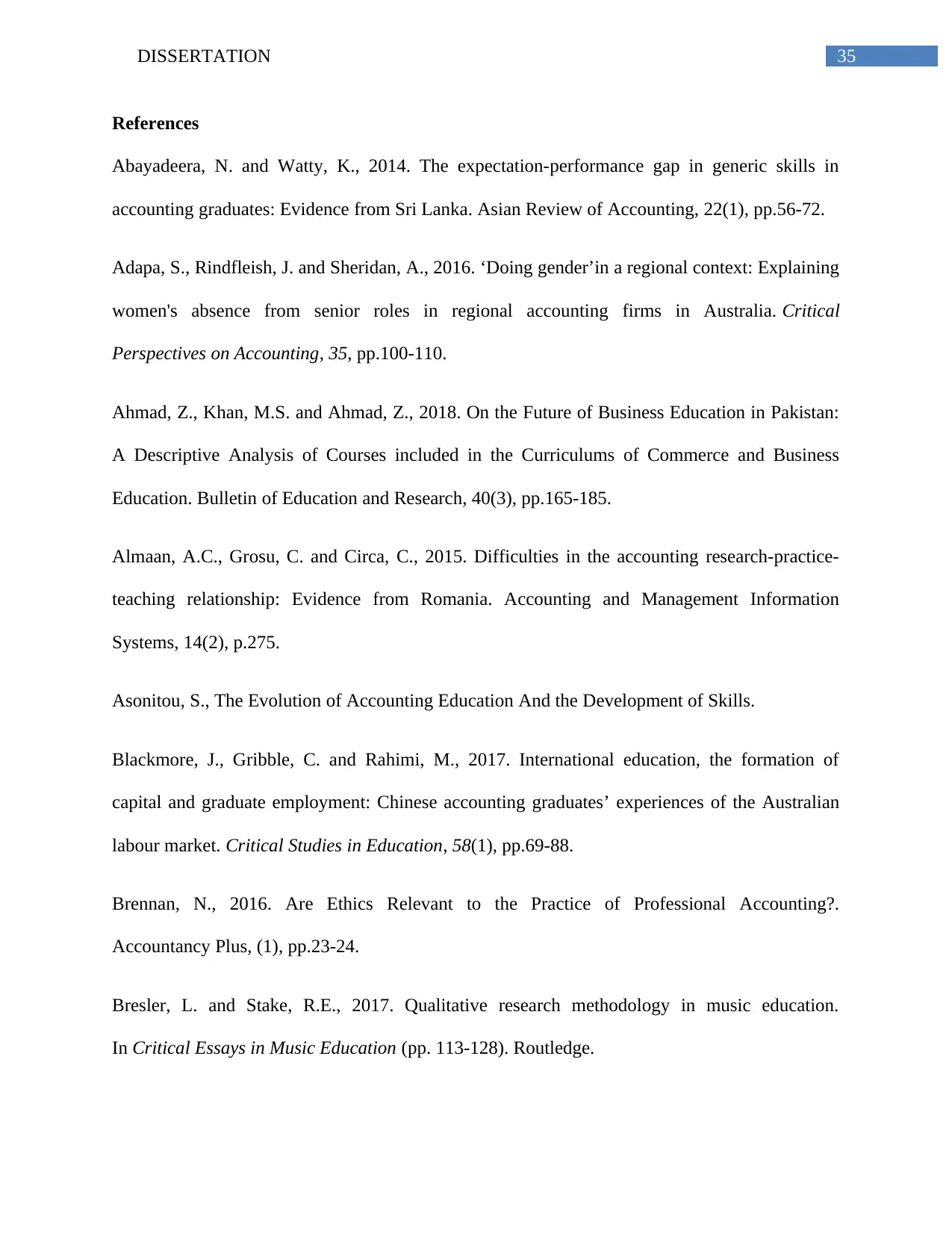
35DISSERTATION
References
Abayadeera, N. and Watty, K., 2014. The expectation-performance gap in generic skills in
accounting graduates: Evidence from Sri Lanka. Asian Review of Accounting, 22(1), pp.56-72.
Adapa, S., Rindfleish, J. and Sheridan, A., 2016. ‘Doing gender’in a regional context: Explaining
women's absence from senior roles in regional accounting firms in Australia. Critical
Perspectives on Accounting, 35, pp.100-110.
Ahmad, Z., Khan, M.S. and Ahmad, Z., 2018. On the Future of Business Education in Pakistan:
A Descriptive Analysis of Courses included in the Curriculums of Commerce and Business
Education. Bulletin of Education and Research, 40(3), pp.165-185.
Almaan, A.C., Grosu, C. and Circa, C., 2015. Difficulties in the accounting research-practice-
teaching relationship: Evidence from Romania. Accounting and Management Information
Systems, 14(2), p.275.
Asonitou, S., The Evolution of Accounting Education And the Development of Skills.
Blackmore, J., Gribble, C. and Rahimi, M., 2017. International education, the formation of
capital and graduate employment: Chinese accounting graduates’ experiences of the Australian
labour market. Critical Studies in Education, 58(1), pp.69-88.
Brennan, N., 2016. Are Ethics Relevant to the Practice of Professional Accounting?.
Accountancy Plus, (1), pp.23-24.
Bresler, L. and Stake, R.E., 2017. Qualitative research methodology in music education.
In Critical Essays in Music Education (pp. 113-128). Routledge.
References
Abayadeera, N. and Watty, K., 2014. The expectation-performance gap in generic skills in
accounting graduates: Evidence from Sri Lanka. Asian Review of Accounting, 22(1), pp.56-72.
Adapa, S., Rindfleish, J. and Sheridan, A., 2016. ‘Doing gender’in a regional context: Explaining
women's absence from senior roles in regional accounting firms in Australia. Critical
Perspectives on Accounting, 35, pp.100-110.
Ahmad, Z., Khan, M.S. and Ahmad, Z., 2018. On the Future of Business Education in Pakistan:
A Descriptive Analysis of Courses included in the Curriculums of Commerce and Business
Education. Bulletin of Education and Research, 40(3), pp.165-185.
Almaan, A.C., Grosu, C. and Circa, C., 2015. Difficulties in the accounting research-practice-
teaching relationship: Evidence from Romania. Accounting and Management Information
Systems, 14(2), p.275.
Asonitou, S., The Evolution of Accounting Education And the Development of Skills.
Blackmore, J., Gribble, C. and Rahimi, M., 2017. International education, the formation of
capital and graduate employment: Chinese accounting graduates’ experiences of the Australian
labour market. Critical Studies in Education, 58(1), pp.69-88.
Brennan, N., 2016. Are Ethics Relevant to the Practice of Professional Accounting?.
Accountancy Plus, (1), pp.23-24.
Bresler, L. and Stake, R.E., 2017. Qualitative research methodology in music education.
In Critical Essays in Music Education (pp. 113-128). Routledge.
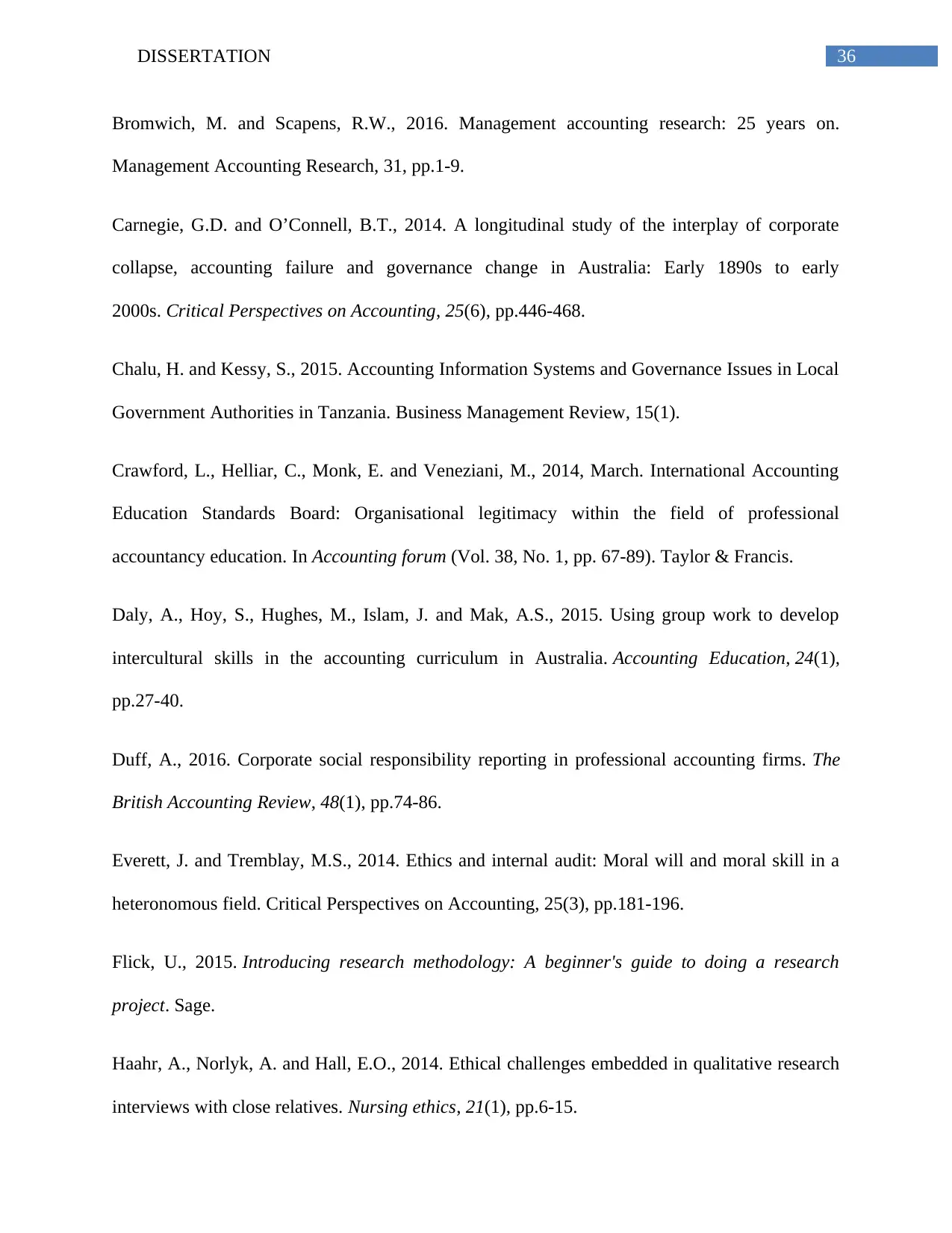
36DISSERTATION
Bromwich, M. and Scapens, R.W., 2016. Management accounting research: 25 years on.
Management Accounting Research, 31, pp.1-9.
Carnegie, G.D. and O’Connell, B.T., 2014. A longitudinal study of the interplay of corporate
collapse, accounting failure and governance change in Australia: Early 1890s to early
2000s. Critical Perspectives on Accounting, 25(6), pp.446-468.
Chalu, H. and Kessy, S., 2015. Accounting Information Systems and Governance Issues in Local
Government Authorities in Tanzania. Business Management Review, 15(1).
Crawford, L., Helliar, C., Monk, E. and Veneziani, M., 2014, March. International Accounting
Education Standards Board: Organisational legitimacy within the field of professional
accountancy education. In Accounting forum (Vol. 38, No. 1, pp. 67-89). Taylor & Francis.
Daly, A., Hoy, S., Hughes, M., Islam, J. and Mak, A.S., 2015. Using group work to develop
intercultural skills in the accounting curriculum in Australia. Accounting Education, 24(1),
pp.27-40.
Duff, A., 2016. Corporate social responsibility reporting in professional accounting firms. The
British Accounting Review, 48(1), pp.74-86.
Everett, J. and Tremblay, M.S., 2014. Ethics and internal audit: Moral will and moral skill in a
heteronomous field. Critical Perspectives on Accounting, 25(3), pp.181-196.
Flick, U., 2015. Introducing research methodology: A beginner's guide to doing a research
project. Sage.
Haahr, A., Norlyk, A. and Hall, E.O., 2014. Ethical challenges embedded in qualitative research
interviews with close relatives. Nursing ethics, 21(1), pp.6-15.
Bromwich, M. and Scapens, R.W., 2016. Management accounting research: 25 years on.
Management Accounting Research, 31, pp.1-9.
Carnegie, G.D. and O’Connell, B.T., 2014. A longitudinal study of the interplay of corporate
collapse, accounting failure and governance change in Australia: Early 1890s to early
2000s. Critical Perspectives on Accounting, 25(6), pp.446-468.
Chalu, H. and Kessy, S., 2015. Accounting Information Systems and Governance Issues in Local
Government Authorities in Tanzania. Business Management Review, 15(1).
Crawford, L., Helliar, C., Monk, E. and Veneziani, M., 2014, March. International Accounting
Education Standards Board: Organisational legitimacy within the field of professional
accountancy education. In Accounting forum (Vol. 38, No. 1, pp. 67-89). Taylor & Francis.
Daly, A., Hoy, S., Hughes, M., Islam, J. and Mak, A.S., 2015. Using group work to develop
intercultural skills in the accounting curriculum in Australia. Accounting Education, 24(1),
pp.27-40.
Duff, A., 2016. Corporate social responsibility reporting in professional accounting firms. The
British Accounting Review, 48(1), pp.74-86.
Everett, J. and Tremblay, M.S., 2014. Ethics and internal audit: Moral will and moral skill in a
heteronomous field. Critical Perspectives on Accounting, 25(3), pp.181-196.
Flick, U., 2015. Introducing research methodology: A beginner's guide to doing a research
project. Sage.
Haahr, A., Norlyk, A. and Hall, E.O., 2014. Ethical challenges embedded in qualitative research
interviews with close relatives. Nursing ethics, 21(1), pp.6-15.
Paraphrase This Document
Need a fresh take? Get an instant paraphrase of this document with our AI Paraphraser
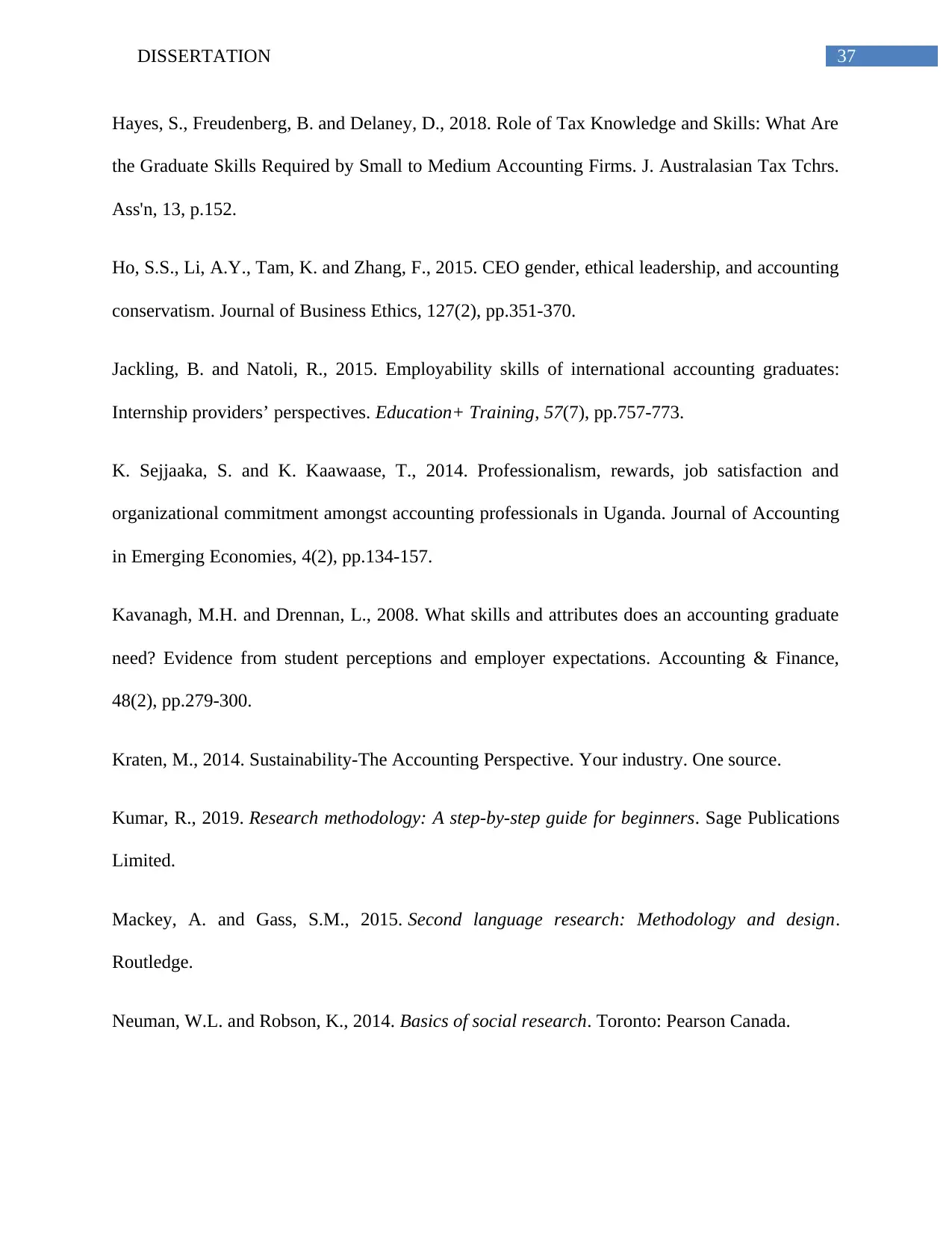
37DISSERTATION
Hayes, S., Freudenberg, B. and Delaney, D., 2018. Role of Tax Knowledge and Skills: What Are
the Graduate Skills Required by Small to Medium Accounting Firms. J. Australasian Tax Tchrs.
Ass'n, 13, p.152.
Ho, S.S., Li, A.Y., Tam, K. and Zhang, F., 2015. CEO gender, ethical leadership, and accounting
conservatism. Journal of Business Ethics, 127(2), pp.351-370.
Jackling, B. and Natoli, R., 2015. Employability skills of international accounting graduates:
Internship providers’ perspectives. Education+ Training, 57(7), pp.757-773.
K. Sejjaaka, S. and K. Kaawaase, T., 2014. Professionalism, rewards, job satisfaction and
organizational commitment amongst accounting professionals in Uganda. Journal of Accounting
in Emerging Economies, 4(2), pp.134-157.
Kavanagh, M.H. and Drennan, L., 2008. What skills and attributes does an accounting graduate
need? Evidence from student perceptions and employer expectations. Accounting & Finance,
48(2), pp.279-300.
Kraten, M., 2014. Sustainability-The Accounting Perspective. Your industry. One source.
Kumar, R., 2019. Research methodology: A step-by-step guide for beginners. Sage Publications
Limited.
Mackey, A. and Gass, S.M., 2015. Second language research: Methodology and design.
Routledge.
Neuman, W.L. and Robson, K., 2014. Basics of social research. Toronto: Pearson Canada.
Hayes, S., Freudenberg, B. and Delaney, D., 2018. Role of Tax Knowledge and Skills: What Are
the Graduate Skills Required by Small to Medium Accounting Firms. J. Australasian Tax Tchrs.
Ass'n, 13, p.152.
Ho, S.S., Li, A.Y., Tam, K. and Zhang, F., 2015. CEO gender, ethical leadership, and accounting
conservatism. Journal of Business Ethics, 127(2), pp.351-370.
Jackling, B. and Natoli, R., 2015. Employability skills of international accounting graduates:
Internship providers’ perspectives. Education+ Training, 57(7), pp.757-773.
K. Sejjaaka, S. and K. Kaawaase, T., 2014. Professionalism, rewards, job satisfaction and
organizational commitment amongst accounting professionals in Uganda. Journal of Accounting
in Emerging Economies, 4(2), pp.134-157.
Kavanagh, M.H. and Drennan, L., 2008. What skills and attributes does an accounting graduate
need? Evidence from student perceptions and employer expectations. Accounting & Finance,
48(2), pp.279-300.
Kraten, M., 2014. Sustainability-The Accounting Perspective. Your industry. One source.
Kumar, R., 2019. Research methodology: A step-by-step guide for beginners. Sage Publications
Limited.
Mackey, A. and Gass, S.M., 2015. Second language research: Methodology and design.
Routledge.
Neuman, W.L. and Robson, K., 2014. Basics of social research. Toronto: Pearson Canada.
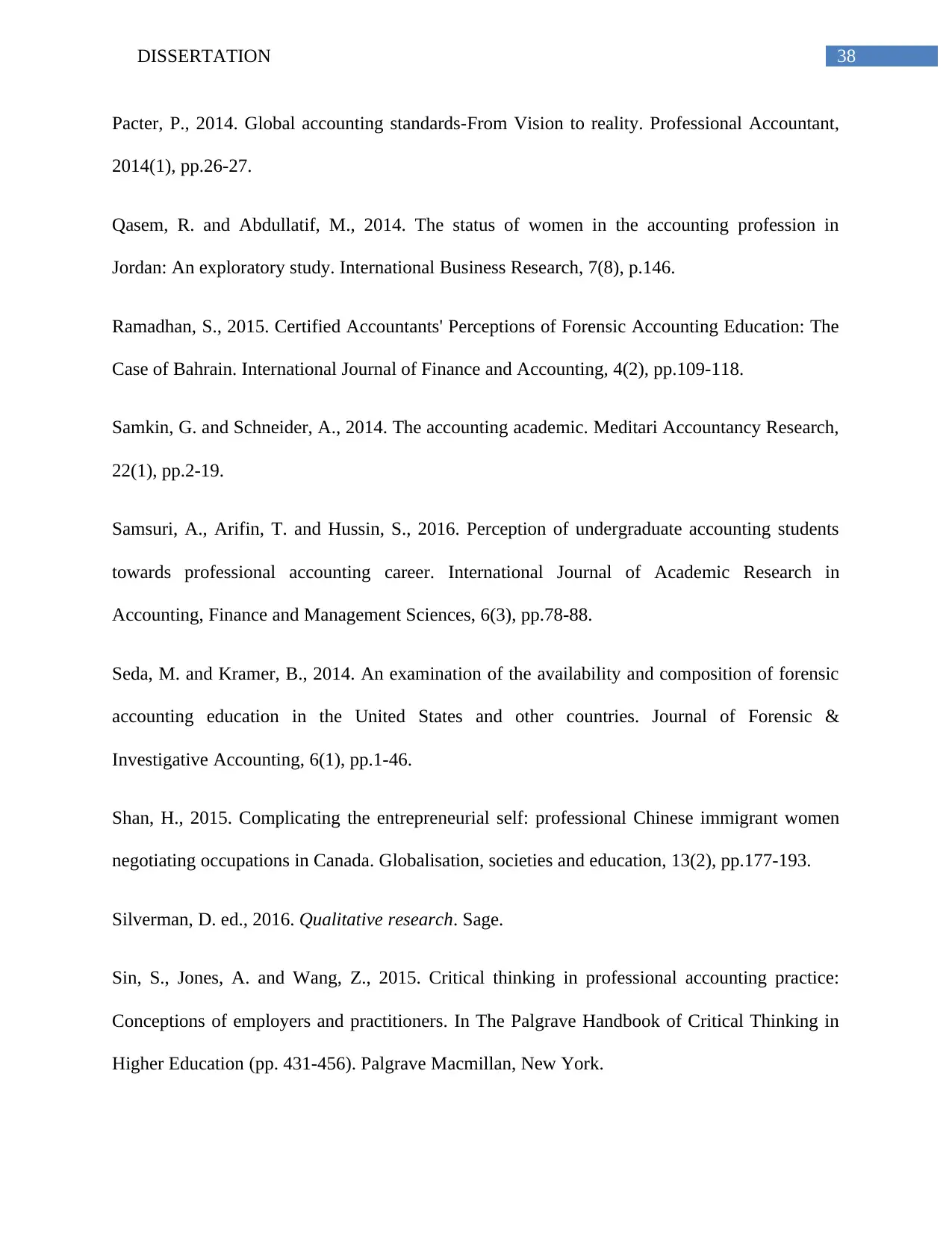
38DISSERTATION
Pacter, P., 2014. Global accounting standards-From Vision to reality. Professional Accountant,
2014(1), pp.26-27.
Qasem, R. and Abdullatif, M., 2014. The status of women in the accounting profession in
Jordan: An exploratory study. International Business Research, 7(8), p.146.
Ramadhan, S., 2015. Certified Accountants' Perceptions of Forensic Accounting Education: The
Case of Bahrain. International Journal of Finance and Accounting, 4(2), pp.109-118.
Samkin, G. and Schneider, A., 2014. The accounting academic. Meditari Accountancy Research,
22(1), pp.2-19.
Samsuri, A., Arifin, T. and Hussin, S., 2016. Perception of undergraduate accounting students
towards professional accounting career. International Journal of Academic Research in
Accounting, Finance and Management Sciences, 6(3), pp.78-88.
Seda, M. and Kramer, B., 2014. An examination of the availability and composition of forensic
accounting education in the United States and other countries. Journal of Forensic &
Investigative Accounting, 6(1), pp.1-46.
Shan, H., 2015. Complicating the entrepreneurial self: professional Chinese immigrant women
negotiating occupations in Canada. Globalisation, societies and education, 13(2), pp.177-193.
Silverman, D. ed., 2016. Qualitative research. Sage.
Sin, S., Jones, A. and Wang, Z., 2015. Critical thinking in professional accounting practice:
Conceptions of employers and practitioners. In The Palgrave Handbook of Critical Thinking in
Higher Education (pp. 431-456). Palgrave Macmillan, New York.
Pacter, P., 2014. Global accounting standards-From Vision to reality. Professional Accountant,
2014(1), pp.26-27.
Qasem, R. and Abdullatif, M., 2014. The status of women in the accounting profession in
Jordan: An exploratory study. International Business Research, 7(8), p.146.
Ramadhan, S., 2015. Certified Accountants' Perceptions of Forensic Accounting Education: The
Case of Bahrain. International Journal of Finance and Accounting, 4(2), pp.109-118.
Samkin, G. and Schneider, A., 2014. The accounting academic. Meditari Accountancy Research,
22(1), pp.2-19.
Samsuri, A., Arifin, T. and Hussin, S., 2016. Perception of undergraduate accounting students
towards professional accounting career. International Journal of Academic Research in
Accounting, Finance and Management Sciences, 6(3), pp.78-88.
Seda, M. and Kramer, B., 2014. An examination of the availability and composition of forensic
accounting education in the United States and other countries. Journal of Forensic &
Investigative Accounting, 6(1), pp.1-46.
Shan, H., 2015. Complicating the entrepreneurial self: professional Chinese immigrant women
negotiating occupations in Canada. Globalisation, societies and education, 13(2), pp.177-193.
Silverman, D. ed., 2016. Qualitative research. Sage.
Sin, S., Jones, A. and Wang, Z., 2015. Critical thinking in professional accounting practice:
Conceptions of employers and practitioners. In The Palgrave Handbook of Critical Thinking in
Higher Education (pp. 431-456). Palgrave Macmillan, New York.
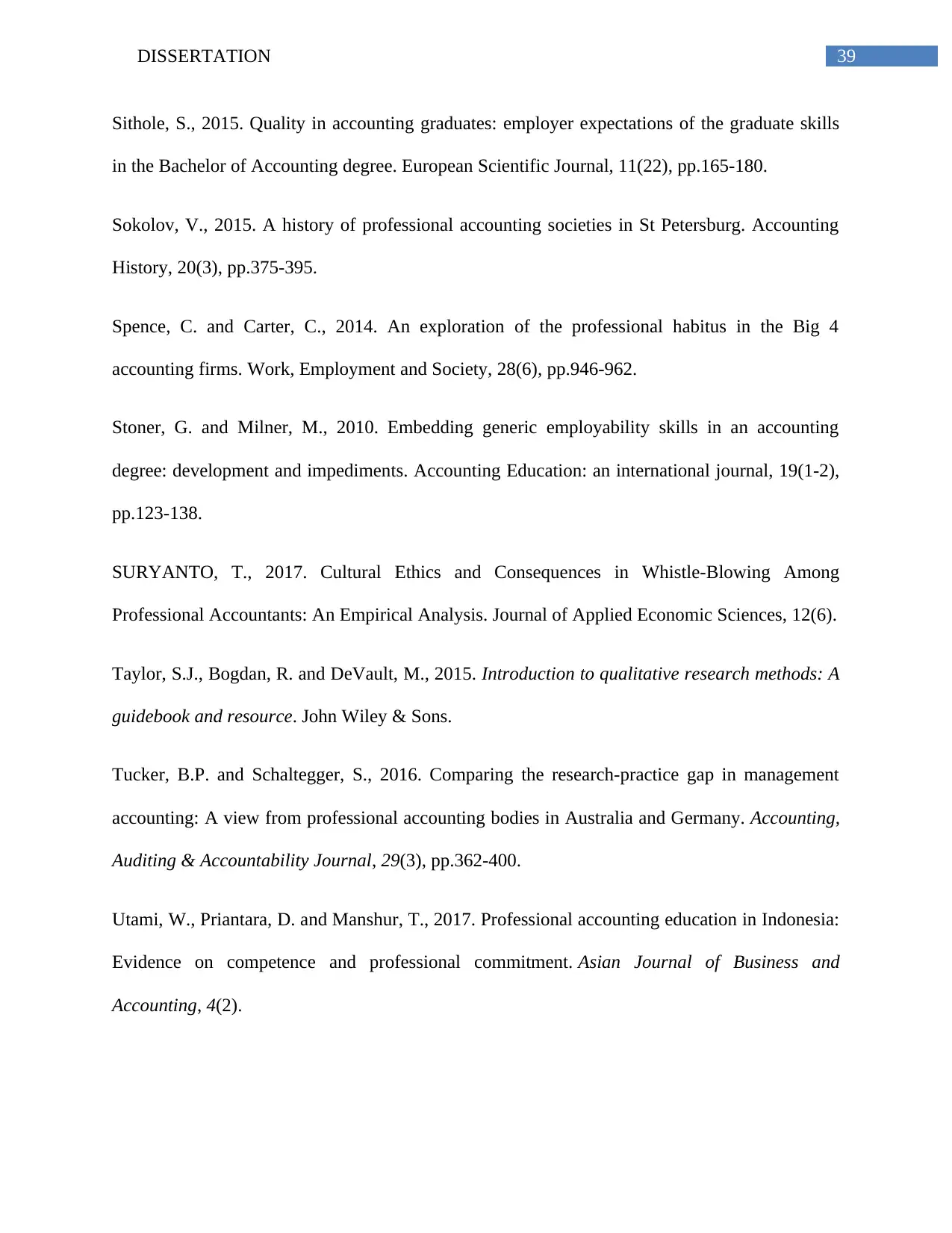
39DISSERTATION
Sithole, S., 2015. Quality in accounting graduates: employer expectations of the graduate skills
in the Bachelor of Accounting degree. European Scientific Journal, 11(22), pp.165-180.
Sokolov, V., 2015. A history of professional accounting societies in St Petersburg. Accounting
History, 20(3), pp.375-395.
Spence, C. and Carter, C., 2014. An exploration of the professional habitus in the Big 4
accounting firms. Work, Employment and Society, 28(6), pp.946-962.
Stoner, G. and Milner, M., 2010. Embedding generic employability skills in an accounting
degree: development and impediments. Accounting Education: an international journal, 19(1-2),
pp.123-138.
SURYANTO, T., 2017. Cultural Ethics and Consequences in Whistle-Blowing Among
Professional Accountants: An Empirical Analysis. Journal of Applied Economic Sciences, 12(6).
Taylor, S.J., Bogdan, R. and DeVault, M., 2015. Introduction to qualitative research methods: A
guidebook and resource. John Wiley & Sons.
Tucker, B.P. and Schaltegger, S., 2016. Comparing the research-practice gap in management
accounting: A view from professional accounting bodies in Australia and Germany. Accounting,
Auditing & Accountability Journal, 29(3), pp.362-400.
Utami, W., Priantara, D. and Manshur, T., 2017. Professional accounting education in Indonesia:
Evidence on competence and professional commitment. Asian Journal of Business and
Accounting, 4(2).
Sithole, S., 2015. Quality in accounting graduates: employer expectations of the graduate skills
in the Bachelor of Accounting degree. European Scientific Journal, 11(22), pp.165-180.
Sokolov, V., 2015. A history of professional accounting societies in St Petersburg. Accounting
History, 20(3), pp.375-395.
Spence, C. and Carter, C., 2014. An exploration of the professional habitus in the Big 4
accounting firms. Work, Employment and Society, 28(6), pp.946-962.
Stoner, G. and Milner, M., 2010. Embedding generic employability skills in an accounting
degree: development and impediments. Accounting Education: an international journal, 19(1-2),
pp.123-138.
SURYANTO, T., 2017. Cultural Ethics and Consequences in Whistle-Blowing Among
Professional Accountants: An Empirical Analysis. Journal of Applied Economic Sciences, 12(6).
Taylor, S.J., Bogdan, R. and DeVault, M., 2015. Introduction to qualitative research methods: A
guidebook and resource. John Wiley & Sons.
Tucker, B.P. and Schaltegger, S., 2016. Comparing the research-practice gap in management
accounting: A view from professional accounting bodies in Australia and Germany. Accounting,
Auditing & Accountability Journal, 29(3), pp.362-400.
Utami, W., Priantara, D. and Manshur, T., 2017. Professional accounting education in Indonesia:
Evidence on competence and professional commitment. Asian Journal of Business and
Accounting, 4(2).
Secure Best Marks with AI Grader
Need help grading? Try our AI Grader for instant feedback on your assignments.
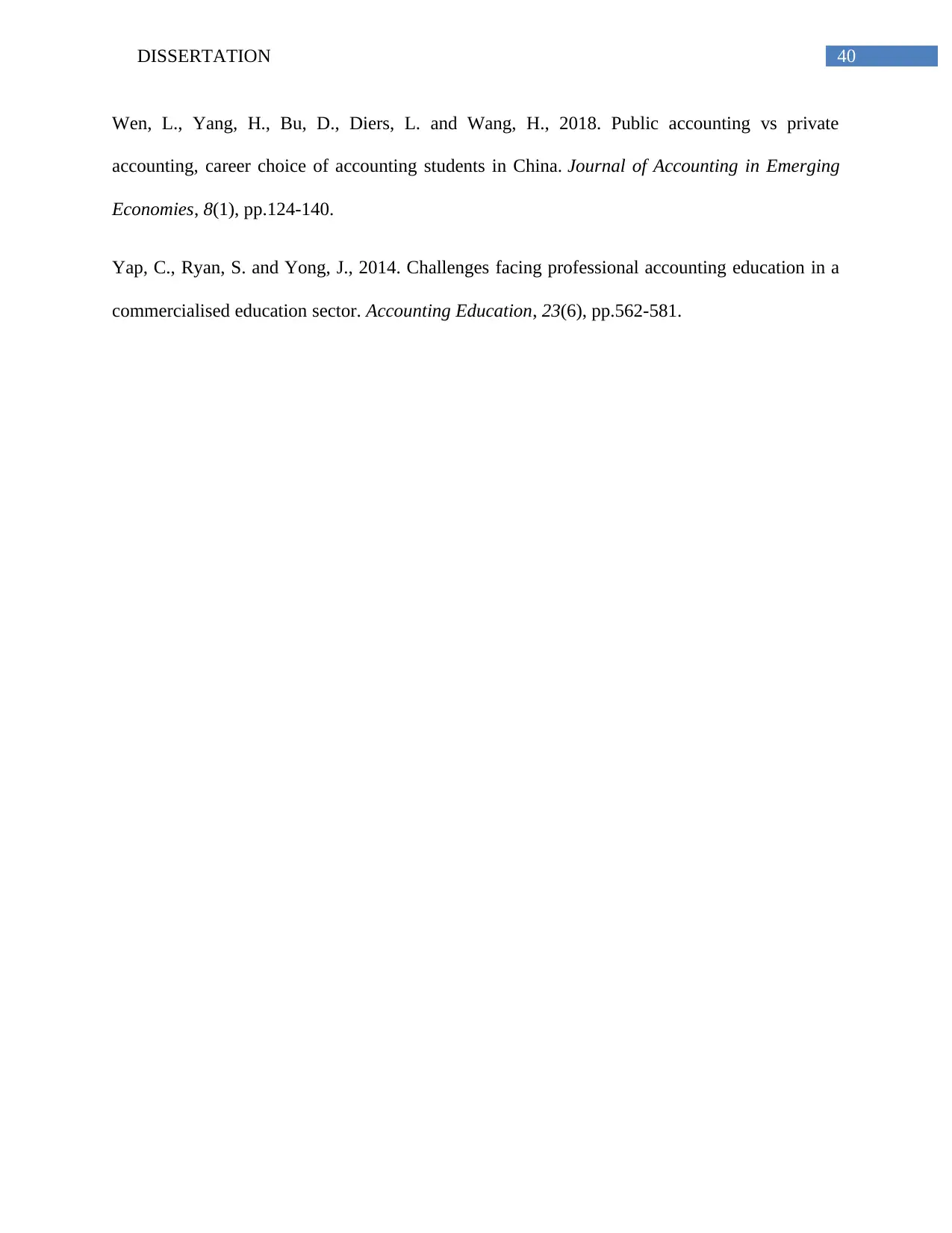
40DISSERTATION
Wen, L., Yang, H., Bu, D., Diers, L. and Wang, H., 2018. Public accounting vs private
accounting, career choice of accounting students in China. Journal of Accounting in Emerging
Economies, 8(1), pp.124-140.
Yap, C., Ryan, S. and Yong, J., 2014. Challenges facing professional accounting education in a
commercialised education sector. Accounting Education, 23(6), pp.562-581.
Wen, L., Yang, H., Bu, D., Diers, L. and Wang, H., 2018. Public accounting vs private
accounting, career choice of accounting students in China. Journal of Accounting in Emerging
Economies, 8(1), pp.124-140.
Yap, C., Ryan, S. and Yong, J., 2014. Challenges facing professional accounting education in a
commercialised education sector. Accounting Education, 23(6), pp.562-581.
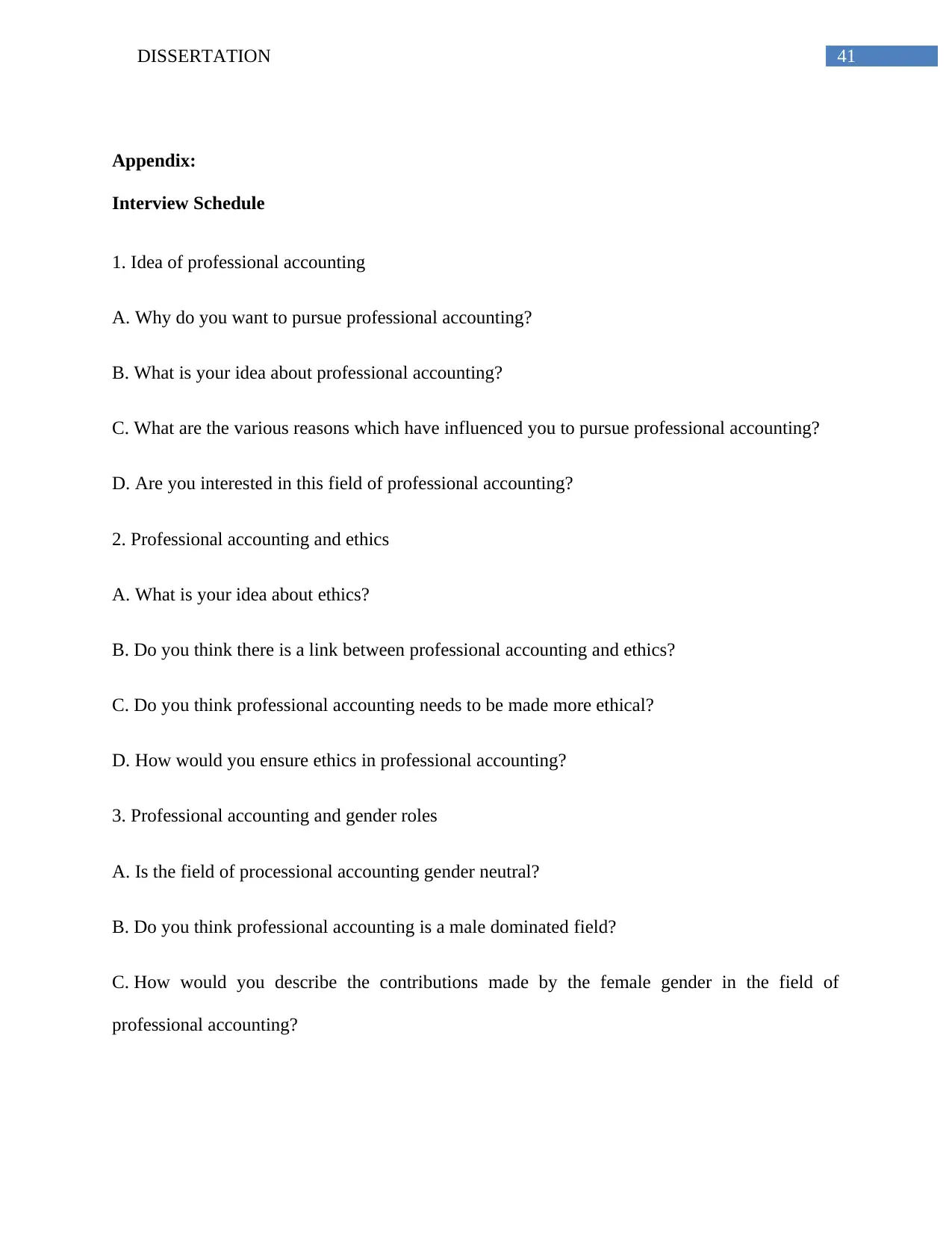
41DISSERTATION
Appendix:
Interview Schedule
1. Idea of professional accounting
A. Why do you want to pursue professional accounting?
B. What is your idea about professional accounting?
C. What are the various reasons which have influenced you to pursue professional accounting?
D. Are you interested in this field of professional accounting?
2. Professional accounting and ethics
A. What is your idea about ethics?
B. Do you think there is a link between professional accounting and ethics?
C. Do you think professional accounting needs to be made more ethical?
D. How would you ensure ethics in professional accounting?
3. Professional accounting and gender roles
A. Is the field of processional accounting gender neutral?
B. Do you think professional accounting is a male dominated field?
C. How would you describe the contributions made by the female gender in the field of
professional accounting?
Appendix:
Interview Schedule
1. Idea of professional accounting
A. Why do you want to pursue professional accounting?
B. What is your idea about professional accounting?
C. What are the various reasons which have influenced you to pursue professional accounting?
D. Are you interested in this field of professional accounting?
2. Professional accounting and ethics
A. What is your idea about ethics?
B. Do you think there is a link between professional accounting and ethics?
C. Do you think professional accounting needs to be made more ethical?
D. How would you ensure ethics in professional accounting?
3. Professional accounting and gender roles
A. Is the field of processional accounting gender neutral?
B. Do you think professional accounting is a male dominated field?
C. How would you describe the contributions made by the female gender in the field of
professional accounting?
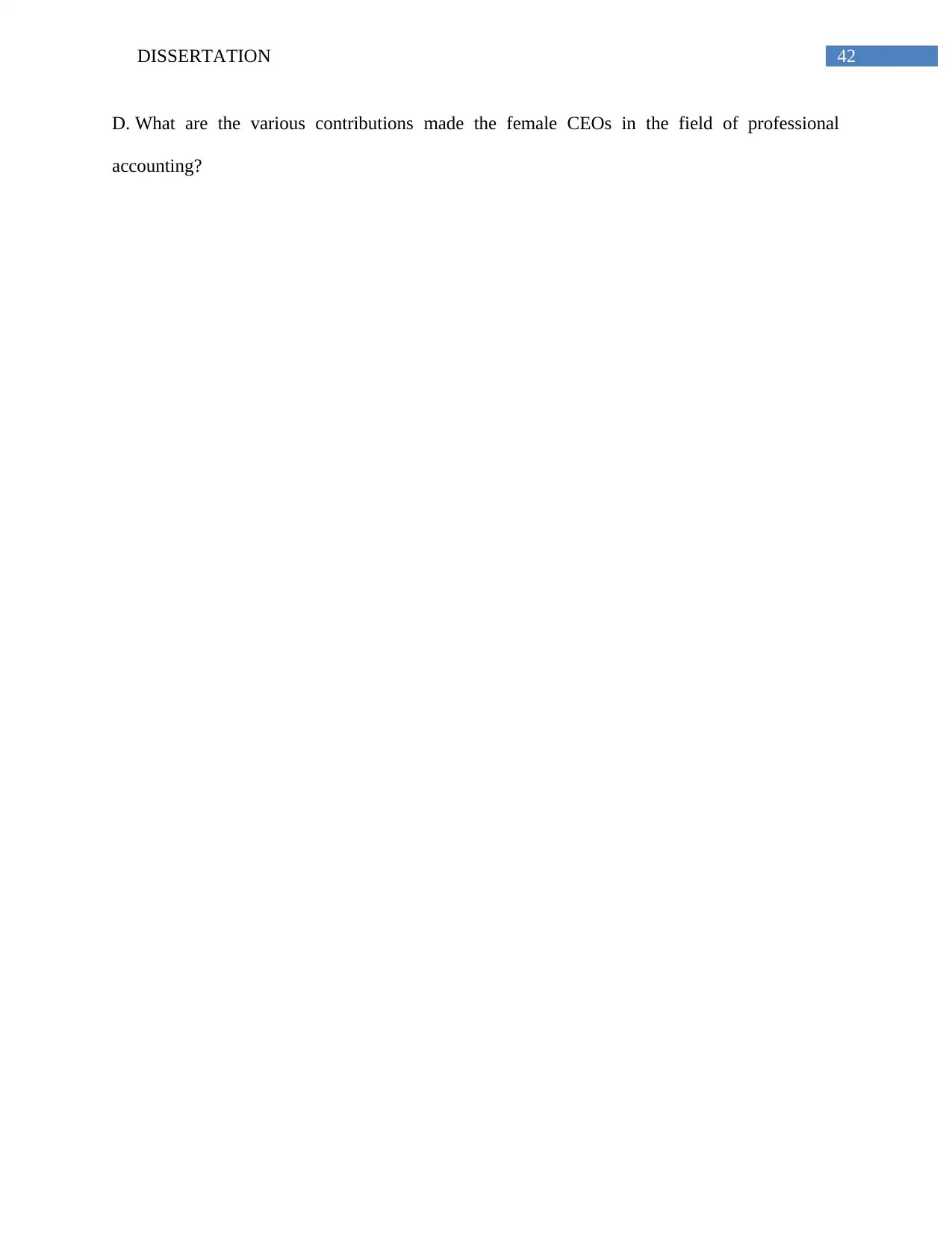
42DISSERTATION
D. What are the various contributions made the female CEOs in the field of professional
accounting?
D. What are the various contributions made the female CEOs in the field of professional
accounting?
1 out of 43
Related Documents
Your All-in-One AI-Powered Toolkit for Academic Success.
+13062052269
info@desklib.com
Available 24*7 on WhatsApp / Email
![[object Object]](/_next/static/media/star-bottom.7253800d.svg)
Unlock your academic potential
© 2024 | Zucol Services PVT LTD | All rights reserved.





